Industry & Regulation
July 26, 2024: Industry & Regulation
- Banks Unprepared for Cyberattacks and Other Risks
- Treasury Warns That Anti-ESG Banking Laws Like Florida’s Are a National Security Risk
- OPINION: Should Credit Unions Acquire Banks
- Federal Financial Regulators Update Requirements for Anti-Money Laundering Programs
Banks Unprepared for Cyberattacks and Other Risks
 PYMNTS.com
PYMNTS.com
A U.S. banking regulator has reportedly determined that many lenders aren’t prepared for risks.
As Bloomberg News reported Sunday (July 21), a confidential assessment by the Office of the Comptroller of the Currency (OCC) said 11 of the 22 large banks it oversees have “insufficient” or “weak” management of so-called operational risk, whether that means cyberattacks or mistakes by employees.
The report, citing sources familiar with the matter, said this determination led the OCC to rate the banks at three or lower on a five-point management scale, a sign that U.S. regulators are worried about banking risks after three high-profile failures in 2023.
The OCC’s operational risk assessments are part of a larger scoring metric known as the CAMELS rating, which stands for six measures of operations: capital adequacy, asset quality, management, earnings, liquidity and sensitivity to market risk.
As noted here last year, the “downgrading of banks’ CAMELS rating can have far-reaching implications. … It affects banks’ deposit insurance premiums, audits and their ability to engage in certain activities. Downgraded lenders may be barred from making deals and denied emergency liquidity from the Federal Reserve.”
The report comes amid a period of heightened concern over cybersecurity, exacerbated last week by what has been described as “the worst IT outage in history,” in which a single software update issued by security firm CrowdStrike inadvertently crippled Microsoft’s systems, impacting the computer systems of more than half of all Fortune 500 companies.
Days earlier, an hourslong outage at Swift affected the Bank of England and the European Central Bank, disrupting high-value transactions across Europe, with the European Central Bank reporting that its settlements system was affected. Read more
Treasury Warns That Anti-ESG Banking Laws Like Florida’s Are a National Security Risk
Josh Boak, Associated Press
 The Treasury Department is warning that state laws that restrict banks from considering environmental, social and governance factors could harm efforts to address money laundering and terrorism financing.
The Treasury Department is warning that state laws that restrict banks from considering environmental, social and governance factors could harm efforts to address money laundering and terrorism financing.
The Associated Press obtained a copy of the letter sent Thursday to lawmakers. The letter singled out a law signed by Florida Gov. Ron DeSantis in May that says it would be an “unsafe and unsound practice” for banks to consider non-financial factors when doing business. The letter concludes that “such laws create uncertainty and may inhibit” national security efforts.
Conservative Republicans such as DeSantis have sought to block environmental and socially conscious standards for investing, saying that such initiatives can lead to unfair discrimination based on political beliefs and harm legitimate businesses. They say that considering environmental, social and corporate-governance issues, or ESG, before deciding whether to invest is woke behavior gone amok.
Tennessee recently enacted a similar law, although it was not mentioned in the Treasury letter. State legislatures in Arizona, Georgia, Idaho, Indiana, Iowa, Kentucky, Louisiana and South Dakota also have measures along these same lines under consideration. Read more
OPINION: Should Credit Unions Acquire Banks
Ron Shevlin, Forbes
The question of whether or not credit unions should buy banks is a pond of scum that one should be careful to wade into. S&P Global jumped right in. It recently published an analysis comparing credit unions (CUs) who have acquired banks to other CUs. The analysis is flawed.
 Wanna Start an Argument?
Wanna Start an Argument?
The topic of credit unions acquiring banks is a contentious issue in the industry. The Independent Community Bankers of America (ICBA) asserts that these acquisitions can “materially damage local communities,” displace critical providers of capital in local communities, and expand the portion of the industry exempt from Community Reinvestment Act requirements.
The reality, however, is that, in many cases, it’s the community banks themselves that initiate the deals.
A November 2023 Federal Reserve memo noted that credit unions were “receiving an increase in inquiries from banks seeking to sell, primarily because other banks are unable to make acquisitions in the current environment.”
The memo added that credit unions with “ample liquidity and capital” hold a distinct advantage, positioned as desirable buyers of banks.
The Credit Union/Bank Acquisition Track Record
Arguments for or against credit union acquisitions of banks aside, let’s look at the facts. Or, more accurately, the data. S&P Global concluded from an analysis that: “Credit unions that have acquired banks outperform their credit union peers in areas such as deposit and member growth, as the deals provide the primarily consumer-focused institutions with geographic, customer and product diversity.” Read more
Federal Financial Regulators Update Requirements for Anti-Money Laundering Programs
Dave Kovaleski, Financial Regulation News
 Federal financial regulators are seeking comments and feedback on a proposal to update their requirements for anti-money laundering and countering the financing of terrorism (AML/CFT) programs.
Federal financial regulators are seeking comments and feedback on a proposal to update their requirements for anti-money laundering and countering the financing of terrorism (AML/CFT) programs.
Specifically, the updated proposal calls for supervised institutions to establish, implement, and maintain effective, risk-based, and reasonably designed AML/CFT programs.
The amendments are intended to align with changes concurrently proposed by the U.S. Department of the Treasury’s Financial Crimes Enforcement Network (FinCEN), most of which result from the Anti-Money Laundering Act of 2020 (AML Act).
Further, the proposed amendments would require supervised institutions to identify, evaluate, and document the regulated institution’s money laundering, terrorist financing, and other illicit finance activity risks, as well as consider FinCEN’s published national AML/CFT priorities.
Additionally, the proposal would mandate that the duty to establish, maintain, and enforce the AML/CFT program remain the responsibility of the relevant agency. Also, the proposal supports institutions’ consideration of innovative approaches to meet compliance obligations.
The four agencies that updated the proposal and are seeking comments are the Federal Deposit Insurance Corp. Federal Reserve Board, National Credit Union Administration, and the Office of the Comptroller of the Currency.
Comments are due 60 days after the date of publication in the Federal Register.
July 19, 2024: Industry & Regulation
- FinCEN Issues Proposed Rulemaking Aimed at Strengthening and Modernizing AML Programs Across Multiple Industries
- In The Market: How Regulators Are Using Banks to Illuminate Shadow Banks
- Average U.S. FICO Score Dips as Consumers Struggle to Make Ends Meet
- U.S. House Financial Services Committee Field Hearing Entitled: Financial Institution-Fintech Partnerships: Leveraging Third-Party Relationships to Increase Access to Financial Services
FinCEN Issues Proposed Rulemaking Aimed at Strengthening and Modernizing AML Programs Across Multiple Industries
Peter D. Hardy & Kaley Schafer, MoneyLaundering News
 On July 3, the Financial Crimes Enforcement Network (FinCEN) published a notice of proposed rulemaking (NPRM) as part of a broader initiative to “strengthen, modernize, and improve” financial institutions’ anti-money laundering and countering the financing of terrorism (AML/CFT) programs. In addition, the NPRM seeks to promote effectiveness, efficiency, innovation, and flexibility with respect to AML/CFT programs; support the establishment, implementation, and maintenance of risk-based AML/CFT programs; and strengthen the cooperation between financial institutions (“FIs”) and the government.
On July 3, the Financial Crimes Enforcement Network (FinCEN) published a notice of proposed rulemaking (NPRM) as part of a broader initiative to “strengthen, modernize, and improve” financial institutions’ anti-money laundering and countering the financing of terrorism (AML/CFT) programs. In addition, the NPRM seeks to promote effectiveness, efficiency, innovation, and flexibility with respect to AML/CFT programs; support the establishment, implementation, and maintenance of risk-based AML/CFT programs; and strengthen the cooperation between financial institutions (“FIs”) and the government.
This NPRM implements Section 6101 of the Anti-Money Laundering Act of 2020 (the “AML Act”). It also follows up on FinCEN’s September 2020 advanced notice of proposed rulemaking soliciting public comment on what it described then as “a wide range of questions pertaining to potential regulatory amendments under the Bank Secrecy Act (‘BSA’) . . . . to re-examine the BSA regulatory framework and the broader AML regime[,]” to which FinCEN received 111 comments.
As we will discuss, the NPRM focuses on the need for all FIs to implement a risk assessment as part of an effective, risk-based, and reasonably designed AML/CFT program. The NPRM also focuses on how consideration of FinCEN’s AML/CFT Priorities must be a part of any risk assessment. However, in regards to addressing certain important issues, such providing comfort to FIs to pursue technological innovation, reducing the “de-risking” of certain FI customers and meaningful government feedback on BSA reporting, the NPRM provides nothing concrete.
FinCEN has published a five-page FAQ sheet which summarizes the NPRM. We have created a 35-page PDF, here, which sets forth the proposed regulations themselves for all covered FIs.
The NPRM has a 60-day comment period, closing on September 3, 2024. Particularly in light of the Supreme Court’s recent overruling of Chevron deference, giving the courts the power to interpret statutes without deferring to the agency’s interpretation, this rulemaking, once finalized, presumably will be the target of litigation challenging FinCEN’s interpretation of the AML Act. Read more
In The Market: How Regulators Are Using Banks to Illuminate Shadow Banks
Paritosh Bansal, Reuters
 The Federal Reserve has proposed new rules that would allow it to gather granular details about banks’ exposure to shadow banks, a move that shows how regulators are trying to understand the risks there and the limits of that approach. Shadow banks, a catch-all term for non-bank financial institutions like private funds and mortgage servicers, are lightly regulated and opaque.
The Federal Reserve has proposed new rules that would allow it to gather granular details about banks’ exposure to shadow banks, a move that shows how regulators are trying to understand the risks there and the limits of that approach. Shadow banks, a catch-all term for non-bank financial institutions like private funds and mortgage servicers, are lightly regulated and opaque.
Regulators and industry experts have expressed growing concerns about systemic risks that might be hiding there, especially in areas such as private credit and lending to private funds as interest rates remain higher for longer than the market expected. Shadow banks have grown as regulations have made it more expensive for banks to lend in some areas.
Over the past month, I have been asking lawyers, bankers and others in the market what U.S. regulators have been doing to get a handle on such risks.One banker said regulators had been asking his firm, a major Wall Street bank, for detail on its overall exposure to individual firms that have sprawling shadow banking operations, like the big private equity firms. They even want to know if the bank is lending to a portfolio company of such funds, said the banker, who requested anonymity to speak candidly.
Then on June 21, the Fed published an in-the-weeds rule change proposal that would essentially allow it to collect that kind of information from the largest banks in a more expansive and structured way.
The regulator wants banks to regularly report to it detailed information about their lending to shadow banks, including things like the type of entity, the collateral used for lending and how it is valued. The regulator also wants to know whether a company that the bank has lent to is owned by financial sponsors. Read more
Average U.S. FICO Score Dips as Consumers Struggle to Make Ends Meet
Kathleen Howley, Forbes
 The average FICO credit score in the U.S. dipped near the end of last year, the first drop in a decade, signaling it may become tougher for some borrowers to finance big-ticket items like cars or houses.
The average FICO credit score in the U.S. dipped near the end of last year, the first drop in a decade, signaling it may become tougher for some borrowers to finance big-ticket items like cars or houses.
The average score fell to 717 in October, down one point from six months earlier, according to Can Arkali, FICO’s Senior Director of Scores and Predictive Analytics. The share of consumers with late bill payments rose to 18% in October from 17% six months earlier, and the average credit card utilization ratio, measuring a consumer’s revolving debt to available credit, rose to 35% from 34%, Arkali said.
Consumers are struggling as higher prices sap their buying power, forcing more people to use credit for everyday purchases, while soaring interest rates make it tougher to make ends meet. The average credit card interest rate was 21.5% in May, according to the Federal Reserve, up from 15.1% two years earlier.
“Missed payments on bank cards have increased and now exceed their pre-pandemic levels,” Arkali said.
Whether consumers make on-time payments is the biggest factor in credit scores, Arkali said, representing 35% of the overall FICO calculation. The next biggest component is credit card utilization, which is about 30% of the score calculation, he said. Read more
U.S. House Financial Services Committee Field Hearing Entitled: Financial Institution-Fintech Partnerships: Leveraging Third-Party Relationships to Increase Access to Financial Services
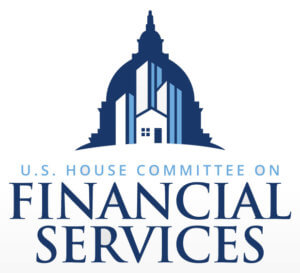 Banks and credit unions partner with third-party vendors, which increasingly employ updated technology (and are often called “fintechs”), to meet the evolving needs of consumers and businesses of all sizes and expand access to and reduce costs of financial services. Such partnerships help facilitate expanded opportunities in the form of access to financial services to households and businesses who may be less likely to access financial services through traditional bank products by increasing efficiencies and decreasing costs. The hearing explores opportunities presented by efficiency-enhancing third-party relationships in the provision of financial services by banks and credit unions, as well as safeguards necessary to ensure safety, soundness, and stability.
Banks and credit unions partner with third-party vendors, which increasingly employ updated technology (and are often called “fintechs”), to meet the evolving needs of consumers and businesses of all sizes and expand access to and reduce costs of financial services. Such partnerships help facilitate expanded opportunities in the form of access to financial services to households and businesses who may be less likely to access financial services through traditional bank products by increasing efficiencies and decreasing costs. The hearing explores opportunities presented by efficiency-enhancing third-party relationships in the provision of financial services by banks and credit unions, as well as safeguards necessary to ensure safety, soundness, and stability.
- Steve Trager, Executive Chair, Republic Bank & Trust Company
- Kirk Chartier, Chief Strategy Officer, Enova
- Mike de Vere, CEO, Zest AI
- Karen Harbin, President and CEO, Commonwealth Credit Union
- Amy Roberti, Global Head of Public Policy, Stripe
Zest AI CEO, Mike de Vere, spoke about financial institution-fintech partnerships Friday before Members of Congress as well as regulators, and other governing officials. Watch the video below for the end of his 5-minute speech:
“Creditworthy borrowers need equitable access to mainstream credit NOW to weather economic and personal shifts, capitalize and fund new businesses, compensate for lack of liquidity, and grow the opportunities available to the next generation. Financial institutions need equitable access to credit to continue to populate the data inputs that better represent the shifting diversity in the U.S. so they can make fair and safe credit risk decisions as the country grows more diverse.” – Mike de Vere, written testimony at July 2024 Field Hearing Entitled: Financial Institution-Fintech Partnerships: Leveraging Third-Party Relationships to Increase Access to Financial Services
July 12, 2024: Industry & Regulation
- CTrust Launches Credit Scoring Platform for Cannabis Businesses
- JPMorgan Warns Customers: Prepare to Pay for Checking Accounts
- SVB Financial Sues FDIC To Recover $1.93 Billion Seized in Bank Rescue
- FFIEC Publishes 2023 Data on Mortgage Lending
CTrust Launches Credit Scoring Platform for Cannabis Businesses
 CTrust is launching a cannabis credit scoring platform, available to financial institutions, investors, and business owners.
CTrust is launching a cannabis credit scoring platform, available to financial institutions, investors, and business owners.
Dave Kovaleski, Financial Regulation News
CTrust’s Cannabis Trust Score (CTS) and Report provides a credit score with detailed insights into the financial health and credit risk of state-licensed cannabis-related businesses (CRBs).
The platform was invented by Dotan Melech, the CEO of CTrust, whose experience in asset management working with distressed businesses and creditors gave him insight into the need for better risk assessment tools for CRBs.
Using a proprietary algorithm, the cannabis industry-tailored CTS and Report incorporates data from more than 1,700 correlation points across 42 unique business categories within 3 main areas. Those three areas include asset, structure and character, point of sale (POS) software, and company structure documents and third-party market data.
“CTrust, and its Cannabis Trust Score and Report, provides a technology and data-driven approach to evaluating lending risk for the benefit of the cannabis industry,” Melech, CEO of CTrust. “The reality is that absent a standardized and trusted formula to measure risk, the industry is unlikely to benefit from expanded access to traditional financing and other financial services even with federal cannabis legalization or rescheduling.”
The CTS and Report provides cannabis lenders and industry financial partners with a comprehensive risk assessment, instilling confidence in their investment decisions. Additionally, CRBs can provide their current or potential financial partners with additional risk transparency to receive fairer loan terms and rates reflective of that company, not solely on federal or state legalization risk. Read more
JPMorgan Warns Customers: Prepare to Pay for Checking Accounts
Alexander Saeedy, Wall Street Journal
 The head of America’s biggest retail bank has a warning for its 86 million customers: Prepare to pay for your bank accounts.
The head of America’s biggest retail bank has a warning for its 86 million customers: Prepare to pay for your bank accounts.
Marianne Lake runs Chase Bank, the sprawling franchise inside JPMorgan Chase that is the country’s biggest bank for consumers and one of its biggest credit-card issuers. Lake is warning that new rules that would cap overdraft and late fees will make everyday banking significantly more expensive for all Americans.
Lake said Chase is planning to pass on the costs of higher regulation and charge customers for a number of now-free services, including checking accounts and wealth-management tools, if the rules become law in their current form. She expects her peers in the industry will follow suit.“The changes will be broad, sweeping and significant,” Lake said. “The people who will be most impacted are the ones who can least afford to be, and access to credit will be harder to get.”
This isn’t the first time banks have said they would pass on higher costs to consumers when regulators have attempted to cap their fees. In 2010, after the post-financial crisis overhaul of bank regulations, lenders warned that they would levy fees on debit cards because of a cap on some card charges—but few ended up doing so because consumers threatened to move their business. Some consumer advocates say this time is no different.
“The banks say that their only option is to pass on their costs to customers, but that’s not true,” said Dennis Kelleher, president of Better Markets, an economics think tank that is in favor of the proposed bank regulations. “Yet again, banks are dressing up their attempts to maximize their own profit under the guise of what’s good or bad for customers.” Read more
SVB Financial Sues FDIC To Recover $1.93 Billion Seized in Bank Rescue
Urvi Dugar, Shubham Kalia, Niket Nishant, and Dietrich Knauth,Reuters
 Bankrupt SVB Financial Group has sued the U.S. Federal Deposit Insurance Corp (FDIC) to recover the $1.93 billion that the regulator seized while it took over Silicon Valley Bank in March, a filing in a bankruptcy court on Sunday showed.
Bankrupt SVB Financial Group has sued the U.S. Federal Deposit Insurance Corp (FDIC) to recover the $1.93 billion that the regulator seized while it took over Silicon Valley Bank in March, a filing in a bankruptcy court on Sunday showed.
The group said inability to access the funds was affecting its reorganization as the money should be generating more than $100 million in annual interest. Without that, it might have to seek costly and uncertain “debtor-in-possession” financing.
The FDIC and the bank (SIVBQ.PK), opens new tab are embroiled in a dispute over the regulator’s effort to recoup the cost of rescuing Silicon Valley Bank. The lender collapsed in March after a deposit flight that triggered the worst U.S. banking crisis in 15 years and led to the failure of two other regional banks.
The regulator guaranteed all deposits of Silicon Valley Bank and later brokered a deal for regional lender First Citizens BancShares (FCNCA.O), opens new tab to buy the failed bank. The complaint alleged that the FDIC induced SVB Financial to keep its cash at the failed bank, only to later seize it.
The FDIC guaranteed “all” deposits to prevent a run on the bank, but later carved out SVB Financial’s own funds from that guarantee, the complaint said. SVB Financial filed for bankruptcy protection and last month agreed to sell its investment banking unit to a group led by the chief executive of the business. It is still exploring options for its venture capital and credit investment arm. Read more
FFIEC Publishes 2023 Data on Mortgage Lending
The Federal Financial Institutions Examination Council (FFIEC) today published data on 2023 mortgage lending transactions reported under the Home Mortgage Disclosure Act (HMDA) by 5,113 U.S. financial institutions, including banks, savings associations, credit unions, and mortgage companies.
The HMDA data are the most comprehensive source of publicly available information on mortgage market activity. The data are used by industry, consumer groups, regulators, and others to assess potential fair lending risks and for other regulatory and informational purposes. The data also help the public assess how financial institutions are serving the housing needs of their local communities and facilitate federal financial regulators’ fair lending, consumer compliance, and Community Reinvestment Act examinations.
The Snapshot National Loan-Level Dataset released today contains the national HMDA datasets as of May 1, 2024. Key observations from the Snapshot include:
- For 2023, the number of reporting institutions increased by about 14.6 percent from 4,460 in the previous year to 5,113.
- The 2023 data include information on 10 million home loan applications, a decrease from the 14.3 million reported in 2022. Among them, 7.7 million were closed-end (e.g., a home mortgage loan) and 2.1 million were open-end (e.g., a home equity line of credit). Another 266,000 records are from financial institutions making use of statutory partial exemptions and did not indicate whether they were closed-end or open-end.
- The share of mortgages originated by non-depository, independent mortgage companies accounted for 68.8 percent of first lien, one- to four-family, site-built, owner-occupied home-purchase loans in 2023, up from 60.2 percent in 2022. Read more
June 28, 2024: Industry & Regulation
- CFPB Approves Rule to Ensure Accuracy and Accountability in the Use of AI and Algorithms in Home Appraisals
- Credit Unions Have Been Buying Up Banks. Here’s a Running List From 2024
- Yellen Touts New Affordable Housing Efforts
- U.S. House of Representatives Committee on Financial Services Hearing: Stress Testing: What’s Inside the Black Box?
CFPB Approves Rule to Ensure Accuracy and Accountability in the Use of AI and Algorithms in Home Appraisals
Rohit Chopra and Zixta Martinez, CFPB
 The Consumer Financial Protection Bureau approved a new rule to address the current and future applications of complex algorithms and artificial intelligence used to estimate the value of a home.
The Consumer Financial Protection Bureau approved a new rule to address the current and future applications of complex algorithms and artificial intelligence used to estimate the value of a home.
When buying or selling a home, an accurate home valuation is critical. Mortgage lenders use this valuation to determine how much they will lend on a property. Over the years, players across the real estate and mortgage industry have made use of computer models to estimate a property’s value. On popular real estate websites, many people even track their own home’s value generated from these algorithmic appraisal tools. As these models grow in complexity to incorporate more and more variables, they can resemble what many people often refer to as artificial intelligence.
While these computer models can provide critical insight for buyers, sellers, and lenders, they cannot be inaccurate or discriminatory. It can be tempting to think that computer models can take bias out of the equation, but they can’t.
The new rule we are approving today requires companies that use these algorithmic appraisal tools to put safeguards into place to ensure a high level of confidence in the home value estimates, protect against the manipulation of data, avoid conflicts of interest, and comply with applicable nondiscrimination laws. Read more
Credit Unions Have Been Buying Up Banks. Here’s a Running List From 2024
Not only are the acquisitions coming at a record pace. The institutions being bought are bigger than ever before. M&A attorneys give clues as to why.
 Bank acquisitions by credit unions have been hotter than ever in 2024, knocking on 2022’s record 16 transactions just halfway through the year.
Bank acquisitions by credit unions have been hotter than ever in 2024, knocking on 2022’s record 16 transactions just halfway through the year.
And the banks being bought are bigger. The largest bank involved in a credit union deal last year was New Mexico’s $338 million-asset Western Heritage Bank. However, a number of target banks in 2024 exceed that in asset size. Security State Bank, which Richland, Washington-based Gesa Credit Union proposed to acquire in May, counts $606 million in assets. First Financial Northwest Bank, which Anchorage, Alaska-based Global Federal Credit Union is buying, counts $1.5 billion.
“Credit unions are the only realistic buyers that could pay cash and absorb the bank’s balance sheet from a purchase accounting standpoint,” said Jeff Cardone, a partner at Luse Gorman who served as legal counsel to Gesa in its deal.
Assets of banks being acquired by credit unions in deals proposed in 2024 total $7.21 billion as of June 4, according to S&P Global. That far surpasses the 2022 record of $5.15 billion. Read more
Yellen Touts New Affordable Housing Efforts
Rebecca Falconer & Courtenay Brown, Axios
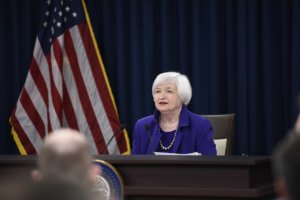 U.S. Treasury Secretary Janet Yellen announced Monday a new Biden administration effort to increase the supply of affordable housing that includes a $100 million fund to address the matter.
U.S. Treasury Secretary Janet Yellen announced Monday a new Biden administration effort to increase the supply of affordable housing that includes a $100 million fund to address the matter.
Why it matters: Housing costs remain stubbornly high — and the Consumer Price Index shows shelter costs are still rising at a rapid rate, helping keep overall inflation elevated.
- Inflation is expected to emerge as a key topic during the first televised presidential debate between President Biden and former President Trump on Thursday.
- The Biden administration’s new effort is an attempt to signal to voters ahead of November’s presidential election that it’s trying to address the housing affordability crisis — though any efforts to make a dent in the years-long shortage may not pay off for years to come.
Driving the news: “I expect that shelter inflation will moderate,” Yellen said during a speech in Minneapolis on Monday afternoon.
- “But we face a very significant housing supply shortfall that has been building for a long time and this supply crunch has led to an affordability crisis,” she said.
- Making life “more affordable” is Biden’s “top economic priority and we are pursuing a broad affordability agenda to address the price pressures that families have been feeling,” Yellen said. Read more
U.S. House of Representatives Committee on Financial Services Hearing: Stress Testing: What’s Inside the Black Box?
 On Wednesday, June 26, 2024, the Financial Institutions and Monetary Policy Subcommittee held a hearing titled “Stress Testing: What’s Inside the Black Box?”
On Wednesday, June 26, 2024, the Financial Institutions and Monetary Policy Subcommittee held a hearing titled “Stress Testing: What’s Inside the Black Box?”
Legislation
- H.R. ___, the “Fair Audits and Inspections for Regulators’ Exams Act”
- H.R. 8591, the “Federal Reserve Financial Accountability and Transparency Act”
Testifying at the hearing will be:
- Sean Campbell, Chief Economist & Head of Policy Research, Financial Services Forum
- Francisco Covas, Executive Vice President & Head of Research, Bank Policy Institute
- Jonathan Gould, Partner, Jones Day
- Greg Feldberg, Research Director, Yale Program on Financial Stability, and Research Scholar and
Lecturer, Yale School of Management
Click to watch the hearing video
June 21, 2024: Industry & Regulation
- Financial Groups Urge Congress to Pass Bill to Protect Vulnerable Adults from Fraud
- The Supreme Court May Soon Defang Bank Regulators — Especially the CFPB
- Data Platform ‘Blueprint’ Published to Help Financial Authorities with Climate Risks
- CFPB to Begin Enforcing Payday Lending Rule Next Year
Financial Groups Urge Congress to Pass Bill to Protect Vulnerable Adults from Fraud
 A group of financial industry associations are calling on Congress to pass a bill that seeks to protect vulnerable adults from financial exploitation.
A group of financial industry associations are calling on Congress to pass a bill that seeks to protect vulnerable adults from financial exploitation.
Dave Kovaleski, Financial Regulation News
The bill in question is called the Financial Exploitation Prevention Act (S. 1841), and it would allow companies to postpone securities redemption if they suspect exploitation of seniors or individuals unable to protect their interests.
The call from the groups – including the Financial Services Institute (FSI), the Investment Company Institute (ICI), the Insured Retirement Institute, and the Securities Industry and Financial Markets Association (SIFMA) – coincides with World Elder Abuse Awareness Day, which was June 15.
“As we mark World Elder Abuse Awareness Day, we applaud lawmakers for their commitment to preventing elder financial abuse and increasing protection for seniors,” FSI President and CEO Dale Brown said. “However, there is more to do, which is why we urge the Senate to pass the Financial Exploitation Prevention Act now. With the increase in new technologies, including AI, financial fraudsters are growing more sophisticated in their schemes to defraud seniors.”
The bipartisan legislation comes at a time when financial exploitation of seniors is increasing. In 2022, according to the Bureau of Justice Statistics, there were 167,889 reported fraud or other financial incidents committed against adults aged 65 or older. In 2023, elder fraud complaints increased by 14 percent, with corresponding losses rising by 11 percent.
“We strongly support the efforts in the Senate to pass the Financial Exploitation Prevention Act (S. 1841) to protect our senior citizens from the threat of financial exploitation,” SIFMA President and CEO Ken Bentsen said. “This legislation is a helpful, additional tool in providing essential safeguards for vulnerable adults. As financial crimes against seniors continue to rise, it is imperative that we equip our industry with the tools needed to combat these increasingly sophisticated schemes.” Read more
The Supreme Court May Soon Defang Bank Regulators — Especially the CFPB
Kevin Wack, American Banker
 In its 13-year history, the Consumer Financial Protection Bureau has survived two major
In its 13-year history, the Consumer Financial Protection Bureau has survived two major
Supreme Court challenges, either of which could have defanged the agency.
A 2020 ruling reduced the CFPB’s independence, but it stopped short of finding that the agency was unconstitutional. And last month, the high court handed the bureau a key victory by upholding its funding mechanism.
But the CFPB is not out of the woods. A forthcoming Supreme Court decision, which is expected to be released within the next few weeks, could take a major bite out of the agency’s rulemaking powers.
The pending decision will determine how much deference the courts give to regulators in interpreting the laws that give them the power to write rules. It has big implications for not just the CFPB — and U.S. banking regulation more generally — but for federal agencies that oversee a broad range of industries.
Experts say the stakes of a ruling that curtails regulatory power, which is widely seen as the likeliest outcome, are particularly large for the CFPB. The consumer bureau has a reputation as being more aggressive than some other federal agencies. During the Biden administration, companies have not been shy about suing to challenge its regulations. Read more
Data Platform ‘Blueprint’ Published to Help Financial Authorities with Climate Risks
Ian Hall, Global Government Fintech
 A ‘blueprint’ for a platform that integrates regulatory and climate data to help financial authorities ‘identify, monitor and manage’ climate-related risks in the financial system has been published this week by the Bank for International Settlements (BIS) and Monetary Authority of Singapore (MAS).
A ‘blueprint’ for a platform that integrates regulatory and climate data to help financial authorities ‘identify, monitor and manage’ climate-related risks in the financial system has been published this week by the Bank for International Settlements (BIS) and Monetary Authority of Singapore (MAS).
Integrating climate-risk analysis into financial stability surveillance presents challenges due to the ‘complex nature of climate change, notable data gaps and limited understanding of how to measure the associated risks,’ the authorities state as they set out the rationale for the ‘exploratory’ ‘Project Viridis’ initiative.
The BIS Innovation Hub’s Singapore centre and MAS report that they have ‘prototyped the development of several features’ of the platform – which is built on the premise that insights on climate risks could be drawn initially from existing available data sources – with the technology architecture ‘enhanced in collaboration with other financial authorities from around the world.’
‘These insights could provide supervisors with an early understanding of which entities could be more exposed to climate-related financial risks and any potential systemic exposure to sectors and geographies,’ the authorities explain.
The platform is modular, meaning that ‘further advancements and international alignment’ on climate data and metrics could then be integrated into it, providing ‘richer’ insights, the authorities state. Read more
CFPB to Begin Enforcing Payday Lending Rule Next Year
David Baumann, Washington Credit Union Daily
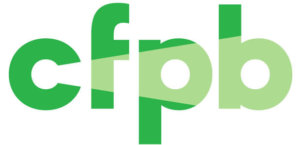 Following a court-ordered delay, the Consumer Financial Protection Bureau intends to begin enforcing its long-awaited payday lending rule on March 30, 2025, agency officials said last week. The rule limits the number of times a lender may attempt to withdraw money from a borrower’s bank account after discovering no money is available.
Following a court-ordered delay, the Consumer Financial Protection Bureau intends to begin enforcing its long-awaited payday lending rule on March 30, 2025, agency officials said last week. The rule limits the number of times a lender may attempt to withdraw money from a borrower’s bank account after discovering no money is available.
“To address lenders’ unfair and abusive collection practices, the CFPB issued a regulation in 2017 adopting a two-strikes-and-you’re-out rule,” the CFPB said. “Under that rule, after two tries to withdraw money from an account have failed, covered lenders can’t try again unless the borrower specifically authorizes another attempt.”
In many cases, payday lenders may withdraw payments from a borrower’s bank account. Agency officials said that payday lenders often repeatedly try to withdraw funds from a borrower’s account even after discovering that the person has no money in it. “The result for consumers was a pile of junk fees: With each failed withdrawal attempt, the borrower might be charged nonsufficient fund fees, overdraft fees, and others,” the CFPB said.
The payday lending rule has had a long and bumpy history. When it was proposed in 2017, the rule also required lenders to ensure that a borrower had an ability to repay their loan before the loan could be made. However, the Trump Administration amended the rule and dropped that provision.
Meanwhile, the Community Financial Services Association of America, a trade group representing payday lenders, filed suit against the CFPB, challenging the rule and arguing that the agency’s funding mechanism was unconstitutional since the bureau was not funded through the appropriations process. Read more
June 14, 2024: Industry & Regulation
- Chopra Raises Alarm On ‘Financial Surveillance’ at Senate Hearing
- Commentary: What Should Regulators Do About the Risks to Mid-Sized Banks?
- What Are the Tech Solutions to Zelle Fraud and Scam Resolution?
- Banks, AI Partners Must Share Responsibility for Safety: OCC’s Hsu
Chopra Raises Alarm On ‘Financial Surveillance’ at Senate Hearing
“Plans to monetize sensitive financial transaction data are a reminder that the United States is slowly lurching toward more financial surveillance and even financial censorship,” Chopra said.
Rajashree Chakravarty, Banking Dive

Consumer Financial Protection Bureau Director Rohit Chopra on Wednesday urged lawmakers to adopt vital measures to safeguard financial data from misuse and abuse by payment processing firms and financial institutions.
While speaking at a Senate Banking Committee hearing on Capitol Hill — testifying for the first time since the Supreme Court upheld the constitutionality of the federal agency’s funding structure — Chopra cited reports about JPMorgan Chase and PayPal’s plans to use sensitive customer data on income and spending for “surveillance-based targeting.”
The agency is actively monitoring developments in the market, but the CFPB is eager to collaborate with lawmakers to establish more robust protections against data abuse and misuse, he said.
“These plans to monetize sensitive financial transaction data are a reminder that the United States is slowly lurching toward more financial surveillance and even financial censorship,” Chopra said in his prepared remarks.
In April, JPMorgan announced a new business unit — Chase Media Solutions — that would enable brands to connect directly with the financial institution’s 80 million customers and help consumers earn cash back with brands.
PayPal did not respond to Reuters’ request for comment. However, Trish Wexler, a JPMorgan Chase spokesperson, told the publication that the lender allows customers to opt in for shopping coupons. But, “no transaction or other personal information is ever shared in developing these discount offers,” Wexler said.
Chopra also called on lawmakers to advance legislation that would accelerate the adoption of open and decentralized banking in the U.S. Last week, the agency laid out the first part of the open banking framework highlighting the qualifications necessary for the industry’s eventual standard setters and plans to “set the stage for finalizing the rest of the rule this fall,” according to Chopra. Read more
Commentary: What Should Regulators Do About the Risks to Mid-Sized Banks?
Janice C. Eberly, Samuel G. Hanson, Jón Steinsson, Daniel K. Tarullo, and David Wessel, Brookings
- In recent decades, two trends have emerged in finance: an increase in uninsured deposits and growth of business lending by non-bank institutions
- These trends present significant risks to mid-sized banks, including the three that failed in March 2023
- New or strengthened regulations could be needed to limit these risks
 The failure of three mid-sized banks in March 2023—three of the four largest bank failures in history—shook financial markets and could’ve spread to other banks if regulators hadn’t stepped in. Two on-going trends in finance contributed to these failures: an increase in uninsured deposits and the migration of business lending to non-banks. In a new paper, “The evolution of banking in the 21st century,” a group of Harvard researchers looked at regulations that could mitigate risks going forward as well as the potential implications for mergers and acquisitions among mid-sized banks. David Wessel, director of the Hutchins Center on Fiscal and Monetary Policy, hears from two of the authors, Samuel Hanson and Daniel Tarullo, on their findings in this episode of the Brookings Podcast on Economic Activity. Read more
The failure of three mid-sized banks in March 2023—three of the four largest bank failures in history—shook financial markets and could’ve spread to other banks if regulators hadn’t stepped in. Two on-going trends in finance contributed to these failures: an increase in uninsured deposits and the migration of business lending to non-banks. In a new paper, “The evolution of banking in the 21st century,” a group of Harvard researchers looked at regulations that could mitigate risks going forward as well as the potential implications for mergers and acquisitions among mid-sized banks. David Wessel, director of the Hutchins Center on Fiscal and Monetary Policy, hears from two of the authors, Samuel Hanson and Daniel Tarullo, on their findings in this episode of the Brookings Podcast on Economic Activity. Read more
What Are the Tech Solutions to Zelle Fraud and Scam Resolution?
Penny Crosman, American Banker
 As Zelle fraud and scam victims tell their stories of losing large sums of money and Congress continues to hold hearings on this topic, it seems clear banks need to step up fraud detection, fraud investigations and dispute resolution.
As Zelle fraud and scam victims tell their stories of losing large sums of money and Congress continues to hold hearings on this topic, it seems clear banks need to step up fraud detection, fraud investigations and dispute resolution.
Some of this will take human effort — for instance, better training of human fraud investigators and customer service reps. But technology that detects, flags and reports on fraud and generative AI that gathers customer and account history data could help humans investigate and handle customer fraud claims more smoothly.
Banks have long used traditional forms of AI, such as machine learning, to find unusual transaction patterns that indicate fraud. The use of generative AI to research claims is in the early stages.
Scope of problem
While the volume of transactions on the network rose 28% last year, the dollar volume of reported fraud and scams dropped nearly 50% to .05% of transactions, according to Ben Chance, chief fraud risk management officer at the company. He would not share the dollar amounts, but said the average payment on Zelle is $275 and total dollar exposure was lower in 2023 than 2022. (According to Consumer Financial Protection Bureau complaint database data, there was a spike in Zelle fraud in 2022.)
But even a rate of .05% still translates to about 1.45 million cases of reported fraud and scams per year. And fraud is typically underreported, because people feel embarrassed and don’t always know who to report it to. Read more
Banks, AI Partners Must Share Responsibility for Safety: OCC’s Hsu
Rajashree Chakravarty, Banking Dive
 “With AI, it is easier to disclaim responsibility for bad outcomes than with any other technology in recent memory,” Acting Comptroller of the Currency Michael Hsu said Thursday.
“With AI, it is easier to disclaim responsibility for bad outcomes than with any other technology in recent memory,” Acting Comptroller of the Currency Michael Hsu said Thursday.
The banking and finance sector should develop a shared responsibility framework with their artificial intelligence partners to address fraud, scams and ransomware attacks arising from AI, Acting Comptroller of the Currency Michael Hsu said Thursday. While speaking at the Financial Stability Oversight Council’s AI Conference, Hsu highlighted how AI’s use can threaten financial stability.
“From a financial stability perspective, AI holds promise and peril from its use as a tool and as a weapon,” Hsu said Thursday. “The controls and defenses needed to mitigate those risks vary depending on how AI is being used. At a high level, though, I believe having clear gates and a shared responsibility model for AI safety can help.”
Cloud computing’s shared responsibility model could be used as a blueprint, Hsu said.
June 7, 2024: Industry & Regulation
- CFPB in the News: House Subcommittee Approves Bill That Would Change CFPB Structure, Funding
- Is the Subprime Segment of the Credit Card Market Concentrated?
- Supreme Court Remands BofA Escrow Dispute to Appeals Court
- ICYMI: HSI, ACAMS Issue Guidance on Combating Financial Fraud, Other Crypto Scams
- Central Bank Welcomes Outcome of Peer Review by the International Credit Union Regulators’ Network
CFPB in the News: House Subcommittee Approves Bill That Would Change CFPB Structure, Funding
David Baumann, Washington Credit Union Daily
 House Republican appropriators are proposing again to convert the Consumer Financial Protection Bureau into a five-member commission that would be subject to the annual appropriations process.
House Republican appropriators are proposing again to convert the Consumer Financial Protection Bureau into a five-member commission that would be subject to the annual appropriations process.
The FY25 Financial Services appropriations bill, which was approved by the House Financial Services Appropriations Subcommittee on Wednesday, also would prohibit the CFPB from implementing several controversial rules. The legislation was approved by the subcommittee by voice vote.
The legislation calls for the Community Development Financial Institutions Fund to receive $276 million in FY25. That represents a $47.4 million cut compared to the program’s FY24 funding level. The bill also would provide $3.423 million for the National Credit Union Administration’s Revolving Loan Fund program, a cut of $42,000 compared to the program’s FY24 funding level.
Related Reading
The bill would prohibit sanctioning any financial institution for providing services to a marijuana-related business. Such a plan has been included in must-pass legislation in the past but has never been included in a final measure agreed upon by the House and Senate. The funding cuts, changes to the CFPB and several controversial policy riders proposed by House Republican appropriators are unlikely to be accepted by the Democratic-controlled Senate. Read more
Is the Subprime Segment of the Credit Card Market Concentrated?
Haelim Anderson, Paul Calem, and Benjamin Gross, Bank Policy Institute
 On Feb. 19, 2024, Capital One announced its plan to acquire Discover Financial Services, a combination that would create the largest credit card issuer in terms of card balances and third largest in terms of purchase volume. Because of this size factor, the merger proposal has generated some reflexive criticism, based on the oversimplified notion that it would create a dominant firm capable of raising prices.
On Feb. 19, 2024, Capital One announced its plan to acquire Discover Financial Services, a combination that would create the largest credit card issuer in terms of card balances and third largest in terms of purchase volume. Because of this size factor, the merger proposal has generated some reflexive criticism, based on the oversimplified notion that it would create a dominant firm capable of raising prices.
Some critics have gone further, claiming that subprime consumers constitute a distinct submarket for considering competitive effects, and that they would be more vulnerable to price increases because they would have fewer options than prime borrowers. However, no evidence has been presented to support the view that the subprime segment comprises a relevant submarket, which seems inconsistent with how the market functions in practice.
One calculation recently receiving attention assessed the effect of the proposed merger on concentration in the subprime segment based on consideration of 12 major credit card issuers and a definition of subprime based on a specific credit score threshold. This analysis concluded that the proposed merger could increase the Herfindahl-Hirschman index of concentration in the subprime segment to a level that exceeds the generally applied threshold for indicating potential competitive concerns in the banking merger context (the 1800 HHI threshold).
In this blog post, we examine the impact of the Capital One-Discover merger on concentration levels in the subprime and prime consumer segments of the credit card market, as well as on the overall market. We show that after expanding the analysis to include just a few additional card issuers with significant subprime presence, beyond the 12 included in the aforementioned analysis, the subprime segment is far less concentrated than critics suggest. Read more
Supreme Court Remands BofA Escrow Dispute to Appeals Court
Gabrielle Saulsbery, Banking Dive
 The nation’s highest court said the lower court “did not conduct the kind of nuanced comparative analysis” required by federal law and a previous Supreme Court ruling.
The nation’s highest court said the lower court “did not conduct the kind of nuanced comparative analysis” required by federal law and a previous Supreme Court ruling.
The Supreme Court on Thursday unanimously threw out an appeals court ruling that permitted Bank of America and other big banks not to pay interest on escrowed funds, despite laws requiring such payments in 14 states. The ruling remanded the issue back to the appeals court and demanded it conduct the “nuanced comparative analysis” required by federal law.
Petitioner Alex Cantero and petitioners Saul Hymes and Ilana Harwayne-Gidansky sued Bank of America, from which they had home mortgage loans, because the bank didn’t pay interest on balances held in escrow accounts that the petitioners paid into. The bank had told the borrowers that New York’s interest-on-escrow law was preempted by the National Bank Act.
Initially, the district court sided with the petitioners. The appeals court reversed that decision, “holding that because the New York law ‘would exert control over’ national banks’ power ‘to create and fund escrow accounts,’ the law was preempted,” court documents show.
But the appeals court didn’t apply the standard necessary to determine when state laws that regulate national financial institutions are preempted “in a manner consistent with” the Dodd-Frank Act and 1996 Supreme Court ruling Barnett Bank of Marion Cty. v. Nelson, the Supreme Court ruled.
In Barnett Bank, the Supreme Court ruled that states could regulate national banks if such regulation does not prevent the bank’s ability to exercise its powers. Read more
ICYMI: HSI, ACAMS Issue Guidance on Combating Financial Fraud, Other Crypto Scams
 Homeland Security Investigations (HSI), in partnership with ACAMS, issued an alert today outlining anti-money laundering red flags and compliance guidance associated with so-called “pig-butchering.” This rising global fraud scheme targets victims by earning their confidence over the course of weeks or months before soliciting money for fraudulent crypto-asset investments. The alert was issued as part of the CORNERSTONE outreach project.
Homeland Security Investigations (HSI), in partnership with ACAMS, issued an alert today outlining anti-money laundering red flags and compliance guidance associated with so-called “pig-butchering.” This rising global fraud scheme targets victims by earning their confidence over the course of weeks or months before soliciting money for fraudulent crypto-asset investments. The alert was issued as part of the CORNERSTONE outreach project.
“Pig-butchering and other sophisticated crypto-scams have successfully defrauded victims out of hundreds of millions of dollars by earning their trust via social media platforms, messaging apps, dating websites, and other forms of digital communication – in fact, victim loss was estimated at $3.3 billion in 2022,” said Matthew Millhollin, acting Assistant Director for HSI’s Countering Transnational Organized Crime (CTOC) division. “Partnerships with crypto firms and other financial institutions are critical in identifying and preventing financial crimes and other similar emerging cyber fraud.”
Perpetrators of pig-butchering scams have often been trafficked by organized crime groups and forced to work at scam centers in Asia under threat of violence, while targeting individuals in other regions of the world. To help financial institutions better identify and report activity linked to fraudulent schemes, the alert outlines transactional and behavioral red flags, geographic risk considerations, recommended customer due diligence practices, and other guidance for AML compliance professionals. Read more
Central Bank Welcomes Outcome of Peer Review by the International Credit Union Regulators’ Network
 The Central Bank of Ireland has published a peer review undertaken by the International Credit Union Regulators’ Network (ICURN).
The Central Bank of Ireland has published a peer review undertaken by the International Credit Union Regulators’ Network (ICURN).
The publication – Peer Review: Central Bank of Ireland’s Performance of its Regulatory Functions in Relation to Credit Unions – assessed the Central Bank’s compliance with ICURN’s Guiding Principles for Effective Supervision of Financial Cooperative Institutions and Enhancing Governance of Cooperative Financial Institutions.
The review found that the Central Bank remains effective in its functions in the regulation and supervision of the credit union sector. The publication highlighted important improvements since the last review in 2019, and also set out recommendations to further improve supervisory effectiveness and achieve full compliance with the ICURN Guiding Principles. The review was undertaken in 2023 by an international team of ICURN regulators drawn from the US, the UK, and South Africa. The review provides an assessment of Ireland’s legislative, regulatory and supervisory framework for credit unions.
Welcoming the outcome of the review, Registrar of Credit Unions, Elaine Byrne said: “Aligned with the Central Bank’s strategic themes of transforming, safeguarding and being open and engaged, the peer review provides external scrutiny on the performance of our functions in relation to the regulation and supervision of credit unions. This review forms part of good governance to ensure we continue to be an effective and proportionate regulator.
The on-site review was conducted by a team of four individuals with extensive experience in supervision and credit unions internationally. The team included Dave Grace, Executive Director of ICURN, Katie Averill, Superintendent of Credit Unions for the state of Iowa (USA), Alison Emblow, Senior Manager for Small Mutuals and Strategic Goals, Prudential Regulation Authority, Bank of England and Lebogang Kgosiemang, Divisional Head, Banking Supervision, Prudential Authority, South African Reserve Bank.
- The Central Bank is required under Section 32M of the Central Bank Act of 1942 to have an independent review of the performance of its regulatory functions undertaken at least every four years. The last peer review in relation to credit unions was carried out in 2019.
- ICURN is an independent international network of credit union regulators formed in 2007, with members drawn from over 40 countries and jurisdictions, including Ireland, other European countries, USA, Canada, Africa and Australia.
- The Review assessed the Central Bank’s compliance with ICURN’s Guiding Principles for Effective Supervision of Financial Cooperative Institutions and Enhancing Governance of Financial Cooperative Institutions. The Guiding Principles take into account the unique nature of financial cooperatives, and using the Basel Committee’s Core Principles for Effective Banking Supervision as a guide, provide guiding principles conducive to developing an effective supervisory system for financial cooperatives.
May 31, 2024: Industry & Regulation
- Visa, Mastercard to Pay $197 Million To Settle Consumer ATM Fee Lawsuit
- FHA Announces New Guidelines Allowing Borrowers to Challenge Appraisals
- CFPB Goes on Offense, Faces Challenges After High Court Win
- NCUA Begins Two-Year Regulatory Review
Visa, Mastercard to Pay $197 Million To Settle Consumer ATM Fee Lawsuit
Mike Scarcella, Reuters
 Visa and Mastercard have agreed to pay $197 million to resolve a class action by millions of consumers accusing the financial payment companies of keeping cash access fees artificially high.
Visa and Mastercard have agreed to pay $197 million to resolve a class action by millions of consumers accusing the financial payment companies of keeping cash access fees artificially high.
The plaintiffs’ lawyers revealed the proposed accord on Wednesday in a filing, in Washington, D.C., federal court. The settlement involves consumers who withdrew cash from bank-operated ATMs since 2007.
Two other related class actions — one from consumers who used non-bank ATMs and a third from businesses that own independent ATMs — are pending in D.C. federal court. The proposed deal is subject to court approval. The defendants have all denied any wrongdoing.
Visa will pay $104.6 million in the accord, and Mastercard will pay $92.8 million, the settlement papers showed. The bank defendants earlier settled claims for $66 million. Visa and Mastercard did not immediately respond to requests for comment.
The plaintiffs’ attorneys said the settlement will “deliver immediate and assured relief.” The plaintiffs in the three cases said Visa and Mastercard’s ATM network rules caused them to pay artificially higher amounts for access fees. Collectively, they were seeking damages of more than $9 billion.
The resolution comes after the U.S. Supreme Court in April turned down an appeal from Visa and Mastercard challenging a lower court judge’s ruling allowing the groups of plaintiffs to band together to sue as class actions. Read more
FHA Announces New Guidelines Allowing Borrowers to Challenge Appraisals
James W. Wright Jr. & Britney M. Crawford, Financial Services Perspectives
 On May 1, 2024, the Federal Housing Administration (FHA) issued Mortgagee Letter (ML) 2024-07 titled “Appraisal Review and Reconsideration of Value Updates,” which enhances the agency’s current policy on home valuations. ML 2024-07 underscores FHA’s ongoing commitment to addressing appraisal bias, which directly aligns with the Interagency Task Force on Property Appraisal and Valuation Equity’s (PAVE) mission to combat bias in home appraisals.
On May 1, 2024, the Federal Housing Administration (FHA) issued Mortgagee Letter (ML) 2024-07 titled “Appraisal Review and Reconsideration of Value Updates,” which enhances the agency’s current policy on home valuations. ML 2024-07 underscores FHA’s ongoing commitment to addressing appraisal bias, which directly aligns with the Interagency Task Force on Property Appraisal and Valuation Equity’s (PAVE) mission to combat bias in home appraisals.
Launched in June 2021, the PAVE task force was created to evaluate the causes and consequences of appraisal bias, as well as establish recommendations to address bias in home valuations. As part of its findings, the PAVE task force recognized the absence of uniform, industry-wide policies and guidelines related to Reconsideration of Value (ROV) processes that allow borrowers to formally appeal home valuations. ML 2024-07 addresses this concern by enhancing FHA’s current policy on standards for appraisal reviews, and provides specific requirements related to borrower-initiated ROV requests.
ML 2024-07 emphasizes that mortgagees must ensure that their underwriters are trained to identify appraisal deficiencies, including those resulting from prohibited discriminatory practices. A mortgagee’s appraisal review process must include protocols for addressing such deficiencies, including by requesting a ROV, requesting a general correction, explanation, or substantiation, or obtaining a second appraisal. Read more
CFPB Goes on Offense, Faces Challenges After High Court Win
Andrew Kim, Matthew Sheldon, & Sabrina Rose-Smith, Bloomberg Law
 The Consumer Financial Protection Bureau appears on the verge of historic levels of public and private enforcement activity after surviving its latest existential threat at the US Supreme Court. Its director, Rohit Chopra, said enforcement is now “firing on all cylinders.”
The Consumer Financial Protection Bureau appears on the verge of historic levels of public and private enforcement activity after surviving its latest existential threat at the US Supreme Court. Its director, Rohit Chopra, said enforcement is now “firing on all cylinders.”
The Supreme Court’s decision will have immediate and significant impact on the consumer finance industry, especially as the CFPB already announced plans to expand its enforcement team by 75 staff members. The long-term effects of the Supreme Court’s ruling, however, aren’t yet clear.
In Consumer Financial Protection Bureau v. Community Financial Services Association of America, the Supreme Court held 7-2 that the CFPB’s funding structure complies with the Appropriations Clause of the US Constitution, reversing the US Court of Appeals for the Fifth Circuit’s contrary decision.
Justice Clarence Thomas, writing for the majority, concluded that the Appropriations Clause requires only that Congress identify in a funding law the specific source of funds, and a purpose for which the funds are to be used. The Supreme Court held that the Dodd-Frank Act satisfied both requirements as to the CFPB’s funding structure.
The CFPB’s victory lifts a heavy cloud that has dampened the agency’s activities ever since the Fifth Circuit held the CFPB’s funding structure to be unconstitutional. Had the Supreme Court agreed with the Fifth Circuit, almost every aspect of the CFPB’s operations would have been cast into doubt. While the Supreme Court case was pending, courts following the Fifth Circuit’s decision temporarily blocked two CFPB rules on account of the perceived constitutional violation—one on small business lending data collection, the other on credit-card late fees. Read more
NCUA Begins Two-Year Regulatory Review
David Baumann, Washington Credit Union Daily
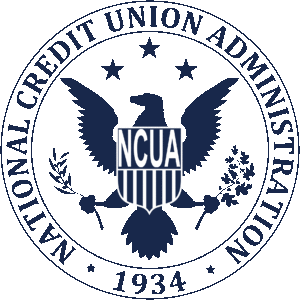 The Nation Credit Union Administration is conducting a two-year review of its rules and will be soliciting public comment on several categories of regulations, the agency announced last week.
The Nation Credit Union Administration is conducting a two-year review of its rules and will be soliciting public comment on several categories of regulations, the agency announced last week.
“As contemplated by the Economic Growth and Regulatory Paperwork Reduction Act of 1996, the NCUA board is reviewing its regulations to identify rules that are outdated, unnecessary, or unduly burdensome on federally insured credit unions,” the NCUA said, in announcing the plan.
Over the next two years, the NCUA will publish four notices in the Federal Register requesting comment on multiple categories of rules. The first Federal Register notice, published on May 23, requests comments on rules governing “applications and reporting” and “powers and activities.”
“The decennial regulatory review provides a significant opportunity for the public and the board to consider groups of related regulations and identify possibilities for streamlining and improvement,” the NCUA said.
The NCUA noted that it is not required to solicit comments as part of a review of its regulations, since the Economic Growth and Regulatory Paperwork Reduction Act of 1996 only requires the federal banking agencies to go through such a review.
“The NCUA is not statutorily required to undertake the EGRPRA review because the NCUA is not an ‘appropriate Federal banking agency,’ as specified in EGRPRA,” the NCUA said. “In keeping with the spirit of the law, however, the NCUA Board has once again elected to participate in the decennial review process.” Read more
May 23, 2024: Industry & Regulation
- America’s Credit Unions: Non-Interest Income Rules Are Choking Credit Unions
- Why Gen Z Can Be Credit Unions Best Friend or Worst Enemy
- Ex-Citi Banker Says She Was Fired for Refusing to Give False Data to Regulator
- DOJ Confirms Moving Marijuana to Schedule III; Sidesteps Anticipated Impact on State Cannabis Markets
America’s Credit Unions: Non-Interest Income Rules Are Choking Credit Unions
 David Baumann, Washington Credit Union Daily
David Baumann, Washington Credit Union Daily
Aggressive regulation of non-interest income by the National Credit Union Administration and the Consumer Financial Protection Bureau will result in cuts to member services, Carrie Hunt, chief advocacy officer of America’s Credit Unions, warned last week.
“Unfortunately, overregulation and attacks on products that provide necessary income to financial institutions, such as mis-characterizing avoidable and clearly disclosed fees as ‘junk fees,’ are making it harder for credit unions to survive,” Hunt wrote in a letter to the NCUA and a letter to the CFPB. “It is not one single action that ultimately overburdens credit unions, but rather it is the tidal wave of regulations and restrictions that are ultimately crushing the industry.”
Hunt wrote that the costs of basic financial services will increase to make up for the revenue lost by further regulation of non-interest income. She noted that in a recent survey of credit unions by the trade group, 85% of the institutions reported they would have to increase loan interest rates to offset a loss of non-interest income, 65% of the institutions said they would increase credit card rates and 71% said they would decrease share and savings rates.
The Biden Administration has called for greater regulation of what it calls “junk fees.” The CFPB has issued a final rule that would limit most credit card late fees to $8. That rule was blocked by a Texas federal court while the Supreme Court considered whether the agency’s funding mechanism is constitutional. The high court last week said that the funding mechanism is constitutional, so it remains to be seen if the agency will be permitted to implement the rule. Read more
Why Gen Z Can Be Credit Unions Best Friend or Worst Enemy
PYMNTS.com
In the current economic environment, Generation Z consumers struggle more than older consumers. Nonetheless, they are a growing demographic that financial service providers — including credit unions (CUs) — need to watch.
This generation is made up primarily of digital-first consumers who manage and spend their money via digital channels. Financial institutions (FIs) can increase engagement among Gen Z consumers by offering innovative products and services.
Data shows, however, that Gen Z consumers can be fickle. For example, 4 in 10 Gen Z CU members say they switched FIs in the past year. In contrast, only 4 in 100 baby boomers and seniors switched. Lack of innovation drives Gen Z away. In fact, Gen Z are 2.5 times more likely than baby boomers and seniors to say they would leave FIs that don’t innovate.
There is a disconnect between CUs’ innovation roadmaps and what Gen Z members want. CUs must align their innovation agendas with Gen Z’s needs and expectations.
These are just of the findings from “How Credit Union Innovation Can Drive Gen Z Engagement,” a PYMNTS Intelligence and Velera (formerly PSCU/Co-op Solutions) collaboration. The report examines how innovation on products and services can help CUs retain their current Gen Z members while attracting new ones. The report is based on two surveys. First, a survey of 201 CU executives conducted from Oct. 4, 2023, to Nov. 16, 2023, to learn about CUs’ current product and feature offerings as well as their plans for future innovation. Second, a census-balanced survey of 4,525 U.S. consumers that investigated which products and features consumers want and expect from CUs conducted between Nov. 2, 2023, and Dec. 6, 2023. Read more
Ex-Citi Banker Says She Was Fired for Refusing to Give False Data to Regulator
Saeed Azhar, Reuters
 A former managing director at Citigroup= sued the bank and its chief operating officer on Wednesday, alleging she was fired for opposing what she said were attempts to give regulators false information.
A former managing director at Citigroup= sued the bank and its chief operating officer on Wednesday, alleging she was fired for opposing what she said were attempts to give regulators false information.
Kathleen Martin, a former managing director Citi hired in 2021 to help with data issues, said in a lawsuit filed in a New York district federal court that her supervisor COO Anand Selva wanted her to hide “critical information” from the Office of the Comptroller of the Currency (OCC) about the bank’s data governance metrics.
Speaking for the bank and Selva, a Citigroup spokesperson said in a statement “this lawsuit is without merit and we will vigorously defend against it.” OCC did not immediately provide comment.
The lawsuit alleges that Selva wanted to hide information because it would make the bank “look bad.”
Selva urged Martin to falsely tell the regulator that Citi had achieved particular goals when it had not, the lawsuit alleged.
Martin was fired in Sept. 25, 2023, in retaliation for her complaints, it said. The data governance work was related to a 2020 OCC consent order, according to the lawsuit. OCC and the Federal Reserve in 2020 directed the bank to fix longstanding and widespread deficiencies in its risk management, data governance and internal controls. Martin’s attorney, Valdi Licul from law firm Wigdor LLP, said in a statement that her client “at all times acted to protect Citi’s interests.” Read more
DOJ Confirms Moving Marijuana to Schedule III; Sidesteps Anticipated Impact on State Cannabis Markets
Ian A. Stewart of Wilson Elser Moskowitz Edelman & Dicker LLP, National Law Review
 On May 16, 2024, the Department of Justice (DOJ) initiated the formal rulemaking process to move marijuana to Schedule III of the Controlled Substances Act. The DOJ’s notice of proposed rulemaking unfortunately sidesteps the hard questions about the impact of rescheduling on the existing state adult-use and medical cannabis markets.
On May 16, 2024, the Department of Justice (DOJ) initiated the formal rulemaking process to move marijuana to Schedule III of the Controlled Substances Act. The DOJ’s notice of proposed rulemaking unfortunately sidesteps the hard questions about the impact of rescheduling on the existing state adult-use and medical cannabis markets.
Summary of Content
The 92-page notice of proposed rulemaking primarily summarizes and comments on last year’s recommendations by the Department of Health and Human Services to reschedule marijuana, as well as related legal concerns such as compliance with international treaty obligation. The DOJ emphasizes that if marijuana is transferred to Schedule III, “the manufacture, distribution, dispensing, and possession of marijuana would also remain subject to applicable criminal prohibitions under the CSA [Controlled Substances Act],” and that marijuana would remain subject to applicable provisions of the Food Drug and Cosmetic Act.
With respect to the critical question of impact on the cannabis markets, however, the DOJ is silent and merely states that it is “seeking comment on the practical consequences of rescheduling marijuana.”
By way of explanation, the DOJ offers:
“DOJ recognizes this action may have unique economic impacts. As stated above, marijuana is subject to a number of State laws that have allowed a multibillion dollar industry to develop. DOJ acknowledges that there may be large impacts related to Federal taxes and research and development investment for the pharmaceutical industry, among other things. DOJ is specifically soliciting comments on the economic impact of this proposed rule. DOJ will revise this section at the final rules stage if warranted after consideration of any comments received.” (Emphasis added.) Read more
May 17, 2024: Industry and Regulation
- Pressure Builds for Congress to Give NCUA Vendor Authority
- Biden Hails ‘Monumental’ Steps Toward Easing Marijuana Rules as Rescheduling Process Moves Ahead
- Smaller Credit Unions Rely More on Overdraft Fees, Analysis Reveals
- Household Debt Rose by $184 Billion in Q1 2024; Delinquency Transition Rates Increased Across All Debt Types
Pressure Builds for Congress to Give NCUA Vendor Authority
David Baumann, Washington Credit Union Daily
 Four former National Credit Union Administration chairmen have joined current Chairman Todd Harper in pressing Congress to grant the agency supervisory powers over third-party vendors.
Four former National Credit Union Administration chairmen have joined current Chairman Todd Harper in pressing Congress to grant the agency supervisory powers over third-party vendors.
“The NCUA’s lack of third-party vendor examination authority is a regulatory blind spot that must be addressed,” Harper wrote, in testimony submitted to the House Financial Services Committee. “The risks associated with credit union reliance on third-party services are expanding, increasing the potential for losses to the Share Insurance Fund.”
The former chairmen agreed. “Given the increasing reliance of credit unions on third-party vendors for critical functions such as data processing, deposit taking, payment services, loan servicing, and mobile and online member services, it is imperative that the NCUA be granted the authority to oversee these vendors effectively,” former NCUA chairmen Michael Fryzel, Debbie Matz, Mark McWatters, and Rick Metsger wrote in a letter to the Financial Services Committee and the Senate Banking Committee.
The House Financial Services Committee held a hearing Wednesday featuring banking regulators, a hearing that Harper normally would attend. However, Harper has taken a temporary leave from the NCUA to undergo and recover from back surgery. He submitted written testimony to the committee.
Credit unions were barely mentioned during Wednesday’s hearing. Much of the discussion centered on last week’s independent report on sexual harassment and other misconduct at the Federal Deposit Insurance Corporation. That report included allegations that FDIC Chairman Martin Greunberg had a reputation for regularly losing his temper. Read more
Biden Hails ‘Monumental’ Steps Toward Easing Marijuana Rules as Rescheduling Process Moves Ahead
Kevin Liptak, CNN
 President Joe Biden’s administration on Thursday took another step toward reclassifying marijuana as a lower-risk substance, opening for public comment its proposed loosening of federal rules in a step the president deemed “monumental.”
President Joe Biden’s administration on Thursday took another step toward reclassifying marijuana as a lower-risk substance, opening for public comment its proposed loosening of federal rules in a step the president deemed “monumental.”
“Today my administration took a major step to reclassify marijuana from a Schedule I to a Schedule III drug,” Biden said in a video posted to social media. “It’s an important move towards reversing longstanding inequities.”
It was Biden’s first time speaking out about the proposed rescheduling since his Justice Department recommended in April that marijuana be rescheduled as a Schedule III controlled substance, a classification shared by prescription drugs such as ketamine and Tylenol with codeine.
The proposed changes would amount to significant changes to federal marijuana law, and could provide a political boost to the president at a moment he is working to bolster his appeal among young voters.
Biden has already pardoned federal marijuana offenders and urged individual state governors to take similar steps.
On Thursday, the Justice Department is taking the next formal step in the process of easing federal restrictions on cannabis, according to a senior administration official. The rescheduling proposal will appear publicly in the Federal Register, opening it up for a 60-day public comment period.
After, the administrator of the Drug Enforcement Administration can assign an administrative law judge to consider evidence in the proposal and make a final scheduling recommendation. The final step comes when the Justice Department makes a final scheduling determination. Read more
Smaller Credit Unions Rely More on Overdraft Fees, Analysis Reveals
Jim DuPlessis, Credit Union Times
 NCUA data shows overdraft and NSF fees are a bigger share of assets for credit unions with $1B to $5B in assets.
NCUA data shows overdraft and NSF fees are a bigger share of assets for credit unions with $1B to $5B in assets.
Credit unions with $1 billion to $5 billion in assets relied significantly more on overdraft and non-sufficient fund fees than larger credit unions, according to NCUA data.
Starting with the Call Reports for the first quarter that the NCUA posted in late April, credit unions with more than $1 billion in assets are required to report both their overdraft fees (OD) and non-sufficient funds (NSF) fees.
CU Times analyzed the fees as annualized percentages of average assets by asset classes using NCUA data from the Callahan & Associates / Peer Suite. The data showed that for the three months ending March 31:
- The Top 10 credit unions, which all had assets of more than $18 billion, had OD+NSF fees of $232 million, or 0.22% of average assets, while other fees were $135.4 million, or 0.13% of average assets.
- The 11 credit unions with assets of $10 billion to under $18 billion had OD+NSF fees of $71.1 million, or 0.19% of average assets, while other fees were $47.5 million, or 0.13% of average assets.
- The 59 credit unions with assets of $5 billion to under $10 billion had OD+NSF fees of $168.2 million, or 0.16% of average assets, while other fees were $156 million, or 0.15% of average assets.
- The 362 credit unions with assets of $1 billion to under $5 billion had OD+NSF fees of $439.8 million, or 0.23% of average assets, while other fees were $420 million, or 0.22% of average assets.
The remaining 4,126 credit unions with assets of less than $1 billion were not required to report OD+NSF fees. However, they had a higher reliance on total fees: 0.57% of total assets, compared with 0.38% for the 442 larger credit unions. Read more
Household Debt Rose by $184 Billion in Q1 2024; Delinquency Transition Rates Increased Across All Debt Types
Federal Reserve Bank of New York
 The Federal Reserve Bank of New York’s Center for Microeconomic Data today issued its Quarterly Report on Household Debt and Credit. The report shows total household debt increased by $184 billion (1.1%) in the first quarter of 2024, to $17.69 trillion. The report is based on data from the New York Fed’s nationally representative Consumer Credit Panel.
The Federal Reserve Bank of New York’s Center for Microeconomic Data today issued its Quarterly Report on Household Debt and Credit. The report shows total household debt increased by $184 billion (1.1%) in the first quarter of 2024, to $17.69 trillion. The report is based on data from the New York Fed’s nationally representative Consumer Credit Panel.
The New York Fed also issued an accompanying Liberty Street Economics blog post examining credit card utilization and its relationship with delinquency. The Quarterly Report also includes a one-page summary of key takeaways and their supporting data points.
“In the first quarter of 2024, credit card and auto loan transition rates into serious delinquency continued to rise across all age groups,” said Joelle Scally, Regional Economic Principal within the Household and Public Policy Research Division at the New York Fed. “An increasing number of borrowers missed credit card payments, revealing worsening financial distress among some households.”
Mortgage balances rose by $190 billion from the previous quarter and was $12.44 trillion at the end of March. Balances on home equity lines of credit (HELOC) increased by $16 billion, representing the eighth consecutive quarterly increase since Q1 2022, and now stand at $376 billion. Credit card balances decreased by $14 billion to $1.12 trillion. Other balances, which include retail cards and consumer loans, also decreased by $11 billion. Auto loan balances increased by $9 billion, continuing the upward trajectory seen since 2020, and now stand at $1.62 trillion.
Mortgage originations continued increasing at the same pace seen in the previous three quarters, and now stand at $403 billion. Aggregate limits on credit card accounts increased modestly by $63 billion, representing a 1.3% increase from the previous quarter. Limits on HELOC grew by $30 billion and have grown by 14% over the past two years, after 10 years of observed declines. Read more
May 10, 2024: Industry and Regulation
- Bankers Call on Regulators to Withdraw Compensation Rule Until Agencies Agree
- HUD Issues New Guidance to Protect Borrowers from Appraisal Bias
- Minnesota Federal Court Dismisses Minnesota Bankers Association’s NSF Fees Lawsuit
- U.S. House of Representatives Committee on Financial Services Hearing: Merger Policies of the Federal Banking Agencies
Bankers Call on Regulators to Withdraw Compensation Rule Until Agencies Agree
David Baumann, Washington Credit Union Daily
 Banking trade groups are calling for federal banking regulators to withdraw their proposed rule governing incentive-based compensation at financial institutions, saying that not all of the relevant agencies have sign onto the proposal.
Banking trade groups are calling for federal banking regulators to withdraw their proposed rule governing incentive-based compensation at financial institutions, saying that not all of the relevant agencies have sign onto the proposal.
While the banking trade groups did not specifically mention the National Credit Union Administration, that agency has not signed on yet. NCUA officials have said they expect to agree to the proposed rule soon. The Federal Reserve and the Securities and Exchange Commission also have not agreed to the proposal yet.
“Today’s unorthodox decision by the [Federal Deposit Insurance Corp.] and other regulators to issue a notice of proposed rulemaking on incentive compensation without all the relevant agencies participating is a disappointing political exercise,” American Bankers Association President/CEO Rob Nichols said.
The Dodd-Frank Act required the regulators to issue the rule by May 2011. The agencies issued proposals in 2011 and 2016, but they never were finalized. The proposal issued Monday is identical to the one proposed in 2016.
The proposed rule includes prohibitions intended to make incentive-based compensation arrangements at financial institutions with more than $1 billion in assets more sensitive to risk. As the proposal was issued, FDIC Chairman Martin Greunberg said the proposed rule will not be published in the Federal Register until all the relevant agencies have agreed to the plan. Read more
HUD Issues New Guidance to Protect Borrowers from Appraisal Bias
Federal Housing Administration’s new Reconsideration of Value policy requires lenders to provide a pathway for borrowers to request reviews of home appraisal valuations.
 The U.S. Department of Housing and Urban Development (HUD), through the Federal Housing Administration (FHA), announced a major new step in the Department’s work to protect borrowers from racial or ethnic bias in home appraisals. FHA’s new requirement for lenders participating in its Single Family program will enable borrowers to request a re-assessment of the appraised value of their property if they believe that the appraisal was inaccurate or biased. The Reconsideration of Value policy represents months of collaboration with the Federal Housing Finance Agency to develop an aligned approach for both FHA-insured mortgages and those purchased or guaranteed by Fannie Mae and Freddie Mac.
The U.S. Department of Housing and Urban Development (HUD), through the Federal Housing Administration (FHA), announced a major new step in the Department’s work to protect borrowers from racial or ethnic bias in home appraisals. FHA’s new requirement for lenders participating in its Single Family program will enable borrowers to request a re-assessment of the appraised value of their property if they believe that the appraisal was inaccurate or biased. The Reconsideration of Value policy represents months of collaboration with the Federal Housing Finance Agency to develop an aligned approach for both FHA-insured mortgages and those purchased or guaranteed by Fannie Mae and Freddie Mac.
“We know that biased home appraisals not only disproportionately harm homeowners of color, but stunt economic opportunity for the communities we serve,” said HUD Acting Secretary Adrianne Todman. “Today, we are announcing a new step in our work to root out racial and ethnic bias in home valuations, which will give borrowers greater ability to have their home valuation reconsidered.”
Today’s announcement fulfills a commitment of the Interagency Task Force on Property Appraisal and Valuation Equity (PAVE), made up of leaders from 13 federal agencies, to establish a transformative set of recommendations to root out racial and ethnic bias in home valuations.
“Appraisal bias harms homeowners of color at every stage of homeownership, and it can lock in inappropriately lower values for entire neighborhoods,” said Federal Housing Commissioner Julia Gordon. “Our new policies will arm homeowners, lenders, and FHA with a clear process to address biased or inaccurate appraisals.” Read more
Minnesota Federal Court Dismisses Minnesota Bankers Association’s NSF Fees Lawsuit
American Bankers Association/ABA Banking Journal
 NONSUFFICIENT FUNDS FEES
NONSUFFICIENT FUNDS FEES
Minnesota Bankers Association v. Federal Deposit Insurance Corporation
Date: April 8, 2024
Issue: Whether the Federal Deposit Insurance Corporation’s (FDIC) Financial Institutions Letter 40-2022: Supervisory Guidance on Multiple Re-Presentment Nonsufficient Funds (NSF) Fees (FIL 40) violates the Administrative Procedure Act (APA).
Case Summary: A Minnesota federal district court dismissed the Minnesota Bankers Association’s and Lake Central Bank’s lawsuit challenging the FDIC’s supervisory guidance on NSF fees.
In August 2022, FDIC issued FIL 40. The guidance only directly applied to state-chartered banks and thrifts with assets of less than $10 billion that are not members of the Federal Reserve System. The guidance emphasized FDIC expects institutions self-identifying re-presentment NSF fee issues to take full corrective action, such as paying full restitution; correcting NSF fee disclosures; providing revised disclosures to customers to consider whether additional risk mitigation practices are needed to reduce potential unfairness risk; and monitoring ongoing activities and customers’ feedback to ensure lasting corrective action.
Plaintiffs sued FDIC in Minnesota federal court to vacate FIL 40, alleging three claims. First, plaintiffs alleged FIL 40 is a legislative rule because it imposes new legal obligations on banks and commits FDIC to bring enforcement actions under specific circumstances. Second, plaintiffs claimed FIL 40 is an arbitrary and capricious agency action. Third, plaintiffs claimed FIL 40 exceeds FDIC’s statutory authority because no provision of federal law gives FDIC the authority to promulgate rules identifying specific unfair, deceptive, or abusive acts or practices (UDAAP) violations for customers’ deposit accounts or automated clearing house transactions. Plaintiffs sought declaratory and injunctive relief from the court. Read more
U.S. House of Representatives Committee on Financial Services Hearing: Merger Policies of the Federal Banking Agencies
 The U.S. House Committee on Financial Services Subcommittee on Financial Institutions and Monetary Policy held a hearing entitled, “Merger Policies of the Federal Banking Agencies.” The Committee heard testimony from:
The U.S. House Committee on Financial Services Subcommittee on Financial Institutions and Monetary Policy held a hearing entitled, “Merger Policies of the Federal Banking Agencies.” The Committee heard testimony from:
- James L. Anderson, Deputy General Counsel, Federal Deposit Insurance Corporation; and
- Ted Dowd, Acting Senior Deputy Comptroller and Chief Counsel, Office of the Comptroller of the Currency.
Background
The hearing will examine merger policies of the Federal banking agencies, including the Office of the Comptroller of the Currency (OCC), the Federal Deposit Insurance Corporation (FDIC), and the Board of Governors of the Federal Reserve System (FRB).
On January 29, 2024, the OCC published a notice of proposed rulemaking (NPR) that would update the rules governing the OCC’s bank merger reviews. The NPR would apply to mergers between unrelated firms, internal reorganizations and consolidations, and assumptions of deposits.
On March 21, 2024, the FDIC voted 3 to 2 in favor of publishing a notice of proposed Statement of Policy (SOP) that would update the rules governing the FDIC’s bank merger reviews. The SOP would apply to mergers between unrelated firms, internal reorganizations and consolidations, and assumptions of deposits.
- Hearing
- Committee Memorandum
- Subcommittee Chair Barr Statement
- Committee Ranking Member Waters Statement
- FDIC Deputy General Counsel Anderson Testimony
- Acting Senior Deputy Comptroller Dowd Testimony
- BPI Statement
May 3, 2024: Industry and Regulation
- Community Bankers’ Message to Congress: Rein in Credit Unions
- U.S. Regulators Seize Troubled Lender Republic First, Sell It to Fulton Bank
- Lessons Learned from Assessing Exposure to Climate-Related Risks
- Cooper and Gonzales Selected to the FFIEC State Liaison Committee
Community Bankers’ Message to Congress: Rein in Credit Unions
David Baumann, Washington Credit Union Daily
Hundreds of community bankers arrived in the nation’s capital this week to deliver a familiar message to Congress: rein in those out-of-control credit unions.
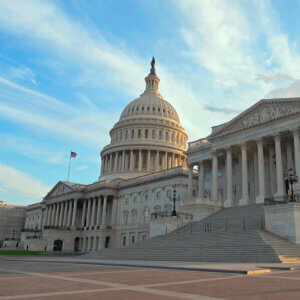 The Independent Community Bankers of Americas’ “Capital Summit,” the community bankers’ equivalent of America’s Credit Unions’ “Governmental Affairs Conference,” is being held this week. Just like the “Hike the Hill” efforts by the credit union trade group, bankers are being shuttled to Capitol Hill to meet with lawmakers and their staffs.
The Independent Community Bankers of Americas’ “Capital Summit,” the community bankers’ equivalent of America’s Credit Unions’ “Governmental Affairs Conference,” is being held this week. Just like the “Hike the Hill” efforts by the credit union trade group, bankers are being shuttled to Capitol Hill to meet with lawmakers and their staffs.
As part of the summit, the ICBA outlined its lobbying objectives. Many of the objectives are similar to those favored by credit union trade groups, including stopping regulatory overreach, opposing credit card routing mandates and enacting marijuana banking legislation. After those issues, the similarities end. The ICBA is focused on eliminating what it believes are the unfair advantages of credit unions.
The ICBA said that the trade group is “particularly alarmed” by the recent trend of credit unions purchasing banks. Credit unions are “effectively ‘weaponizing’ their tax subsidy and lax regulatory standards” to purchase banks, ICBA charged. The community bankers also have adopted a 2024 credit union resolution that sounds a familiar theme regarding taxes. “ICBA urges Congress to end the unwarranted federal tax subsidy of the credit union industry and/or promote increased tax parity between credit unions and community banks,” the trade group said.
Specifically, the ICBA:
- Opposes “credit unions’ exploitation of their tax subsidy and lax regulatory environment to acquire locally based community banks.”
- Urges Congress to investigate the National Credit Union Administration’s failure to supervise the industry.
- Opposes expanded powers for Credit Union Service Organizations. The trade group also supports providing the NCUA with supervisory powers over credit union third-party vendors. (Americas Credit Unions opposes giving the agency third-party vendor authority, but NCUA officials contend it is needed, calling the lack of supervisory power a “regulatory blind spot.”)
- Opposes the “weakening” of safeguards on commercial lending, field of membership and subordinated debt. Read more
U.S. Regulators Seize Troubled Lender Republic First, Sell It to Fulton Bank
Manas Mishra, Pritam Biswas, and Nathan Gomes, Reuters
 U.S. regulators have seized Republic First Bancorp and agreed to sell it to Fulton Bank, underscoring the challenges facing regional banks a year after the collapse of three peers. Philadelphia-based Republic First, which had abandoned funding talks with a group of investors, was seized by the Pennsylvania Department of Banking and Securities.
U.S. regulators have seized Republic First Bancorp and agreed to sell it to Fulton Bank, underscoring the challenges facing regional banks a year after the collapse of three peers. Philadelphia-based Republic First, which had abandoned funding talks with a group of investors, was seized by the Pennsylvania Department of Banking and Securities.
The Federal Deposit Insurance Corp (FDIC), appointed as a receiver, said on Friday Fulton Bank, a unit of Fulton Financial Corp, will assume substantially all deposits and purchase all the assets of Republic Bank, which is the operating name for Republic First, to “protect depositors”.Republic Bank had about $6 billion in total assets and $4 billion in total deposits, as of Jan. 31, 2024. The FDIC estimated the cost of the failure to its fund will be $667 million.
Apart from deposits, Republic also had borrowings and other liabilities of approximately $1.3 billion, Fulton said in a statement.
Fulton said the deal almost doubles its presence in the Philadelphia market with combined company deposits of approximately $8.6 billion.
“With this transaction, we are excited to double our presence across the region,” said Fulton Chairman and
CEO Curt Myers in a statement. Republic Bank’s 32 branches in New Jersey, Pennsylvania and New York will reopen as branches of Fulton Bank on Saturday or on Monday during business hours.
The decision marks the latest U.S. regional bank failure following the unexpected collapses of three lenders – Silicon Valley and Signature in March 2023 and First Republic in May. Read more
Lessons Learned from Assessing Exposure to Climate-Related Risks
Federal Housing Financing Agency
 Climate Scenario Analysis is a tool for assessing exposure to climate-related risks under different future climate conditions. Preliminary analysis highlights the importance of resolving data and methodology gaps to enhance confidence in the results. It also reveals the sensitivity of results to modeling assumptions.
Climate Scenario Analysis is a tool for assessing exposure to climate-related risks under different future climate conditions. Preliminary analysis highlights the importance of resolving data and methodology gaps to enhance confidence in the results. It also reveals the sensitivity of results to modeling assumptions.
Background
The safety and soundness of the U.S. housing finance system could be adversely affected by the risks associated with climate change, which can disrupt the financial system.1 These risks pose significant costs on the housing finance system and could increase delinquencies, defaults, and foreclosures, especially if borrowers are underinformed or underinsured.2 Additionally, climate-related risks could cause long-term harm to local economies, infrastructure, and housing prices that could lead to decreases in habitability and affordability. As such, it is critical for the Federal Housing Finance Agency (FHFA) to better understand how climate risk will affect its regulated entities (Fannie Mae, Freddie Mac, and the Federal Home Loan Banks) as part of its supervisory responsibility to ensure they fulfill their mission and operate in a safe and sound manner, while providing liquidity for housing finance and community investment.
Climate-related risks may be evaluated through two primary categories. The first is physical risk, represented by damage to property, infrastructure, and land due to severe weather events and lasting environmental changes. The second is transition risk posed by policy and technological changes to achieve a greener, low carbon economy that may cause stress to households, certain institutions, or business sectors.
Climate-related physical risks such as hurricanes, wildfires, flood, and sea level rise can directly damage housing stock and reduce property values. Further, borrowers with expenses incurred from weather events may have less disposable income in the event of a disruption to income or employment. Similarly, reduced coverage from insurance companies in high-risk areas could negatively impact local economies and infrastructure, thereby placing downward pressure on house values. These risks may be transmitted to FHFA’s regulated entities through an increased probability of mortgage default and higher loss severity, resulting in higher expected losses. Read more
Cooper and Gonzales Selected to the FFIEC State Liaison Committee
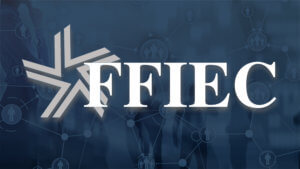 Today, the Federal Financial Institutions Examination Council (FFIEC) announced the re-election of Charles G. Cooper as SLC Chairman and the selection of Greg Gonzales to the State Liaison Committee (SLC).
Today, the Federal Financial Institutions Examination Council (FFIEC) announced the re-election of Charles G. Cooper as SLC Chairman and the selection of Greg Gonzales to the State Liaison Committee (SLC).
The SLC Chairman’s one-year term runs from May 1 until April 30 of the following year. The SLC can re-elect the Chairman for additional terms. Cooper has been a member of the SLC and served as its Chairman since 2023. Gonzales’s term runs from May 1, 2024, through April 30, 2026.
Cooper has been the Commissioner of the Texas Department of Banking since 2008. As Commissioner, he is responsible for the chartering, regulation, supervision, and examination of 214 Texas state-chartered banks, which have aggregate assets of approximately $426.6 billion. In addition, the Department supervises trust companies, foreign bank agencies and branches, prepaid funeral licensees, money service businesses, and perpetual care cemeteries.
Gonzales has been the Commissioner of the Tennessee Department of Financial Institutions since 2005. As Commissioner, he serves as Tennessee’s chief regulatory officer for all state-chartered depository and licensed non-depository financial institutions. He has also served as assistant commissioner and general counsel for the Department.
The FFIEC was created by the Federal Financial Institutions Regulatory and Interest Rate Control Act of 1978 to “prescribe uniform principles and standards for the federal examination of financial institutions” and “make recommendations to promote uniformity” in the supervision of financial institutions. It also conducts schools for examiners employed by the five federal member agencies represented on the FFIEC and makes those schools available to employees of state agencies that supervise financial institutions. Read more
Apr. 26, 2024: Industry and Regulation
- America’s Credit Unions Endorses Bill to Establish Independent Exam Office
- Treasury Asks the Eleventh Circuit to Uphold the CTA and Congressional Authority
- Report: FDIC Seeking Buyers for Republic First Bancorp
- NCUA Fraud Prevention Resources
America’s Credit Unions Endorses Bill to Establish Independent Exam Office
David Baumann, Washington Credit Union Daily
 America’s Credit Unions is throwing its support behind bipartisan House legislation that would establish an independent office to consider appeals of credit union and bank examinations.
America’s Credit Unions is throwing its support behind bipartisan House legislation that would establish an independent office to consider appeals of credit union and bank examinations.
In a Tuesday letter to the bill’s sponsors, Reps. French Hill, R-Ark., and David Scott, D-Ga., America’s Credit Unions President/CEO Jim Nussle wrote, “Your legislation will facilitate transparency and improve consistency in the examination process; provide a resource for financial institutions to express concern about their examination experience; and establish an independent adjudicatory process for the appeal of material supervisory determinations.”
The lawmakers introduced the measure, H.R. 8071, on April 18. The legislation would establish a new Office of Independent Examination Review within the Federal Financial Institutions Examination Council to consider appeals of “Materially Supervisory Determinations,” issues that could significantly affect the operation of a financial institution.
The bill also would require credit union and bank examiners to complete examinations no later than 60 days after the exam exit interview. If an examiner reports a “Materially Supervisory Determination,” the examiner would be required to share the documentation the examiner relied on in making that determination. The legislation would allow a financial institution to appeal that determination to the U.S. Circuit Court of Appeals.
The bill would apply to the National Credit Union Administration, the Consumer Financial Protection Bureau, the Federal Reserve, the Federal Deposit Insurance Corporation, and the Office of the Comptroller of the Currency. Read more
Treasury Asks the Eleventh Circuit to Uphold the CTA and Congressional Authority
Brian N. Kearney, Ballard Spahr
 We previously blogged on the lawsuit filed by the National Small Business Association (“NSBA”) and one of its individual members, which sought to challenge the constitutionality of the Corporate Transparency Act (“CTA”). Most recently, we analyzed the March 1 decision in that case by the Northern District of Alabama court, finding the CTA to be unconstitutional and enjoining the United States government from enforcing it against the plaintiffs.
We previously blogged on the lawsuit filed by the National Small Business Association (“NSBA”) and one of its individual members, which sought to challenge the constitutionality of the Corporate Transparency Act (“CTA”). Most recently, we analyzed the March 1 decision in that case by the Northern District of Alabama court, finding the CTA to be unconstitutional and enjoining the United States government from enforcing it against the plaintiffs.
The government sought an appeal before the Eleventh Circuit, and last Monday the Treasury Department filed its appellate brief. Before the District Court, the government argued that Congress had authority to enact the CTA under three distinct enumerated powers: (1) oversight of foreign affairs and national security; (2) its Commerce Clause-derived regulatory authority; and (3) its power to tax. The government’s brief on appeal focuses primarily on regulation of commercial activity, and its value as a component of the federal focus on combatting financial crime.
As we previously discussed, the District Court’s Opinion found in part that the CTA was constitutionally defective because it (according to the Court) attempted to regulate the act of incorporation, a purview of the individual States, in the name of national security. The District Court noted, however, that the CTA presumably would pass constitutional muster were its applicability limited to actual engagement in commercial activity by an incorporating entity (because such a limitation would serve as a “jurisdictional hook” tying the regulation to the flow of interstate commerce).
The government highlights this conclusion as the first of two “principal errors” underpinning the district court’s ruling. It notes that, contra the District Court’s assertion, the CTA does not regulate the act of incorporation: it neither preempts state law on incorporation, nor limits the class of entities that can be incorporated, nor alters the means by which incorporation is accomplished, nor requires incorporation of any entity. Rather, the government argues, the CTA uses incorporation as a proxy for the category of entities that can engage in economic transactions in their own name and thus can potentially be used as vehicles for financial crimes without disclosing their owners. Read more
Report: FDIC Seeking Buyers for Republic First Bancorp
PYMNTs Magazine
firs
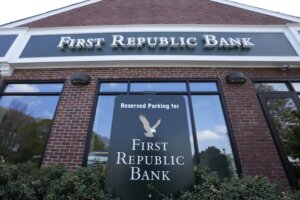 The Federal Deposit Insurance Corp. (FDIC) is reportedly in talks with potential buyers for Republic First Bancorp., a Philadelphia regional bank that does business as Republic Bank. The regulator is approaching potential buyers and seeking bids for the bank, which has traded at a market value of less than $1 million for much of April after reaching a peak of more than $500 million in 2017, Bloomberg reported Wednesday (April 24), citing unnamed sources.
The Federal Deposit Insurance Corp. (FDIC) is reportedly in talks with potential buyers for Republic First Bancorp., a Philadelphia regional bank that does business as Republic Bank. The regulator is approaching potential buyers and seeking bids for the bank, which has traded at a market value of less than $1 million for much of April after reaching a peak of more than $500 million in 2017, Bloomberg reported Wednesday (April 24), citing unnamed sources.
Republic First Bancorp did not immediately reply to PYMNTS’ request for comment.
The FDIC sought bidders for the bank in late 2023 but paused that effort when Republic First reached a deal with an investor that was to invest $35 million in the bank, according to the report. However, that deal was terminated in February.
In a July 2023 letter to shareholders, Republic First Bancorp Chairman Andrew B. Cohen and President and CEO Thomas X. Geisel, who had both recently assumed new leadership roles, noted that the bank had been through “some difficult times.”
They attributed this in part to former leadership’s “ill-advised” expansion of the bank’s physical footprint; building of long-term fixed-rate residential loan and bond portfolios at a time of low interest rates; and failure to maintain appropriate internal controls related to a system’s conversion.
In an effort to cut costs, Republic First cut jobs last year and exited the mortgage origination business, Reuters reported Wednesday. Its shares trade over the counter after being delisted from Nasdaq in August 2023, according to the report. At the time it was delisted, Republic Bank said in a press release that it would no longer be listed on the exchange because it had not yet filed its annual report on Form 10-K with the Securities and Exchange Commission (SEC) for fiscal year 2022. Read more
NCUA Fraud Prevention Resources
 Like other financial institutions, credit unions are targets for insider abuse due to the easy access to money. Fraud can happen at any time and to any credit union.
Like other financial institutions, credit unions are targets for insider abuse due to the easy access to money. Fraud can happen at any time and to any credit union.
Deterring Insider Fraud
According to the Association for Certified Fraud Examiners’ 2020 Report to the Nations on Occupational Fraud and Abuse(Opens new window), internal control weaknesses were responsible for nearly half of fraudulent activity.
Credit unions can deter the potential for fraud by establishing strong, impenetrable internal controls, reviewing those controls periodically, and enforcing those controls consistently. Though the type of internal controls that are needed will vary based on the products and services a credit union offers, the board of directors and senior management of every credit union should design and adopt policies that will deter fraudulent employee activity.
Other actions and internal controls to deter insider fraud include:
- Establish a Fraud Policy. Developing a stand-alone fraud policy, separate from personnel policies, will clarify and communicate expectations related to preventing fraud and the consequences of committing fraud. This policy should address whistle-blowing procedures, mandatory and sequential vacation days, employee conduct, and actions a credit union will take if fraud is discovered. Employees should sign the policy annually. The board of directors should also consider ongoing fraud awareness training for all employees.
- Segregate Duties Properly. Clearly define roles and responsibilities for each credit union employee to manage fraud risk. For smaller credit unions that have insufficient staff to segregate duties completely, the supervisory committee or an outside party must actively provide the necessary checks and balances.
- Bond Employees and Perform Background Checks. Credit unions are required to purchase fraud and dishonesty bonds that cover all employees, directors, officers, supervisory committee members, and credit committee members. Background checks can also mitigate the potential for fraud. A credit union should check the background of all new hires, board members, and supervisory committee members, and update the information periodically.
- Adopt Proper Internal Controls. These include dual controls, computer access controls, member-account verification, surprise cash counts, timely recordkeeping, limiting employee access to their own accounts and family member accounts, annual audits, and audit and account verifications that comply with NCUA’s regulations, 12 C.F.R., Part 715, Supervisory Committee Audits and Verifications.
Detecting Insider Fraud
Credit union employees and officials are often in the best position to identify red flags and irregular behavior that are indicators of possible fraud. Initially, insider tips are the main way fraud is detected, and fraud hotlines usually result in higher detection rates. Internal audits and management reviews are also helpful in detecting fraud. Read more
Apr. 19, 2024: Industry and Regulation
- Scott Hodge of the Tax Foundation: Be Prepared for Credit Union Tax Fight in 2025
- Can I Speak to Your Supervisor? The Importance of Bank Supervision
- Why DEI Is a Must for Insurance Companies That Want to Win
- ‘Return to Sender,’ America’s Credit Unions Tells Congress When it Comes to Postal Banking Plan
Scott Hodge of the Tax Foundation: Be Prepared for Credit Union Tax Fight in 2025
David Baumann, Washington Credit Union Daily
 A critic of the credit union tax exemption predicted Thursday that Congress may take a close look at the benefit as they search for ways to pay for expiring tax cuts next year.
A critic of the credit union tax exemption predicted Thursday that Congress may take a close look at the benefit as they search for ways to pay for expiring tax cuts next year.
Parts of the 2017 “Tax Cuts and Jobs Act” expire next year and “there’s going to be a rush to look under every [sofa] cushion” to pay for an extension of the cuts, Scott Hodge, president emeritus and senior policy advisor at the Tax Foundation, said in an interview with Washington Credit Union Daily.
The Tax Foundation is a Washington, D.C. think tank that says it advocates for tax policies that lead to greater economic growth and opportunity.
Hodge is a longtime critic of the credit union tax exemption and earlier this year wrote a Tax Foundation report, “After 90 Years, It is Time to Wean Credit Unions off Taxpayer Subsidies.” The report argued that the credit union tax exemption is outdated and that credit unions no longer focus on helping people of modest means.
Hodge also is the author of the newly published book, “Taxocracy: What You Don’t Know About Taxes and How They Rule Your Daily Life.” Hodge devoted a chapter of the book to his argument that the credit union tax exemption should be eliminated.
Discussing the tax benefit in the interview, Hodge said, “I think 90 years of subsidies is enough. If you can’t exist for 90 years without a subsidy, shame on you.” He continued, “You can’t have a healthy commercial banking system competing with a non-profit, tax-exempt banking system.” Read more
Can I Speak to Your Supervisor? The Importance of Bank Supervision
Beverly Hirtle and Anna Kovner, Federal Reserve Bank of New York
 In March of 2023, the U.S. banking industry experienced a period of significant turmoil involving runs on several banks and heightened concerns about contagion. While many factors contributed to these events—including poor risk management, lapses in firm governance, outsized exposures to interest rate risk, and unrecognized vulnerabilities from interconnected depositor bases, the role of bank supervisors came under particular scrutiny.
In March of 2023, the U.S. banking industry experienced a period of significant turmoil involving runs on several banks and heightened concerns about contagion. While many factors contributed to these events—including poor risk management, lapses in firm governance, outsized exposures to interest rate risk, and unrecognized vulnerabilities from interconnected depositor bases, the role of bank supervisors came under particular scrutiny.
Questions were raised about why supervisors did not intervene more forcefully before problems arose. In response, supervisory agencies, including the Federal Reserve and Federal Deposit Insurance Corporation, commissioned reviews that examined how supervisors’ actions might have contributed to, or mitigated, the failures. The reviews highlighted the important role that bank supervisors can play in fostering a stable banking system.
In this post, we draw on our recent paper providing a critical review and summary of the empirical and theoretical literature on bank supervision to highlight what that literature tells us about the impact of supervision on supervised banks, on the banking industry and on the broader economy.
Supervision and Regulation Are Distinct Activities
In the economic literature on banking and in discussions of the banking industry, the terms “supervision” and “regulation” are often used interchangeably, but in fact these are distinct activities. “Regulation” is the process of establishing the rules under which banks operate: who can own banks, permissible and impermissible activities, and minimum capital and liquidity requirements.
Regulations are subject to public comment and input before they are adopted, and they are published for all to see. “Supervision” involves oversight and monitoring of banks to ensure that they are operating in a safe and sound manner. A key part of supervision is ensuring that banks are in compliance with regulations, but supervision also involves qualitative assessments of banks’ internal processes, controls, governance and risk management—and taking enforcement actions when weaknesses are discovered.
While some enforcement actions are public, much of supervisory activity is confidential and not publicly disclosed. Read more
Why DEI Is a Must for Insurance Companies That Want to Win
Terrance Williams, President and CEO of TruStage, Forbes
 I have been asked repeatedly what role diversity, equity and inclusion (DEI) plays in the insurance industry today, as well as what role it plays in my own leadership as the first Black person to lead TruStage. I believe now more than ever that DEI has a vital role to play in how we shape companies from the inside-out and pave a more purposeful path to the future by ensuring we represent the marketplace and the customers and partners we serve.
I have been asked repeatedly what role diversity, equity and inclusion (DEI) plays in the insurance industry today, as well as what role it plays in my own leadership as the first Black person to lead TruStage. I believe now more than ever that DEI has a vital role to play in how we shape companies from the inside-out and pave a more purposeful path to the future by ensuring we represent the marketplace and the customers and partners we serve.
Practices that would rightly be cast as predatory today—such as redlining and price discrimination—were commonplace over the last century. But if financial institutions can reckon with their past in the context of how we will do better in the future, we can open doors for countless customers to gain protection and for young professionals to pursue rewarding careers.
‘Return to Sender,’ America’s Credit Unions Tells Congress When it Comes to Postal Banking Plan
CUToday.info
 The U.S. Postal Service (USPS) is being asked to “end its experiment” in postal banking and “return its focus to the core mission of making sure Americans get their mail in a timely manner.”
The U.S. Postal Service (USPS) is being asked to “end its experiment” in postal banking and “return its focus to the core mission of making sure Americans get their mail in a timely manner.”
The request was by America’s Credit Unions President/CEO Jim Nussle in a letter to the Senate Committee on Homeland Security and Governmental Affairs ahead of its hearing on oversight of the USPS.
As CUToday.info has reported, credit unions and other financial services providers have long opposed any move by the postal service into banking services.
In a letter to the committee, Nussle expressed credit union concerns around the USPS’ expansion of financial services and postal banking. He stated that expanding into financial services “would both go beyond the USPS’s purpose and powers and add responsibilities in which the USPS has no expertise and does not currently have the infrastructure and capacity to manage.”
Limited Interest
In addition, Nussle argued that interest in postal banking is limited and the recent pilot program serviced just six customers.
“Postal banking is not one of the solutions to the current issues facing the USPS, nor is it a viable solution for providing financial services to historically underserved communities,” Nussle wrote. “If Congress would like to expand access to financial services, we urge you to consider other steps, such as legislation to allow all credit unions to add underserved communities to their fields of membership.”
Apr. 12, 2024: Industry and Regulation
- The 3 Rs to Prevent Elderly Financial Abuse: Red Flags, Relationships and Respect
- ICYMI: More States Now Require Financial Literacy Classes in High Schools
- Credit Unions Lose Ground in Consumer Credit
- Ensuring Service Members Can Protect Themselves from Unlawful Financial Practices
The 3 Rs to Prevent Elderly Financial Abuse: Red Flags, Relationships and Respect
Courtesy of OneDigitalTrust, CreditUnionConnection
 Recent lawsuits point to both the vulnerability of many older Americans to the scourge of online financial fraud and the opportunity that engaged financial services providers have to help thwart such pernicious crime.
Recent lawsuits point to both the vulnerability of many older Americans to the scourge of online financial fraud and the opportunity that engaged financial services providers have to help thwart such pernicious crime.
Two such complaints are against a top 5 bank, which is accused of allowing two elderly women in California to lose more than $2 million to so-called “pig butchering scams.” Here, fraudsters posed as IRS agents to win the victims’ trust and trick them into multiple fraudulent transactions facilitated by the bank.
In another case, a top bank and credit union are accused of making 75 international transfers—74 alone through the credit union—by a retired naval officer totaling about $3.6 million. Unfortunately, many transfers were made even after concerns were explicitly reported to adult protective services in the officer’s home county.
The AARP says an estimated $28.3 billion is lost to what it calls elderly financial exploitation (EFE) each year in this country. Some 72% is lost to people the victims know, such as friends and family.
The emotional toll includes embarrassment and anguish and so much more, including, as in the California cases mentioned above, a person losing not only her life’s savings but also her home. Financial services providers are on the frontline in detecting and preventing this criminality, which targets the growing elderly population. April is National Financial Literacy Month, and we can’t stop at teaching young children to save and spend their allowances wisely. We must consider financial education and wellness more holistically. So, what can a responsible, proactive credit union or its financial advisor do?
Red Flags
First, make sure protocols to safeguard elderly members are standard operating procedure. That begins with training staff to recognize red flags. Those can include unusual withdrawals or Not Sufficient Fund occurrences, newly added co-owners on accounts, or sudden investment decisions inconsistent with a member’s known objectives. Indicators of the latter can include senior members receiving excessive phone calls or visitors pushing dubious financial arrangements. Another indicator is a sudden change in beneficiaries and other terms in the consumer’s estate planning. Read more
ICYMI: More States Now Require Financial Literacy Classes in High Schools
Courtesy of Ann Carrns, The New York Times
 The surge in offerings is a response to the pandemic, which revealed glaring income inequality, as well as inflation and the resumption of student loan payments, an expert said.
The surge in offerings is a response to the pandemic, which revealed glaring income inequality, as well as inflation and the resumption of student loan payments, an expert said.
A flurry of states now require financial literacy classes for high school students, covering topics like budgeting, saving and managing debt.
Just seven states — Alabama, Iowa, Mississippi, Missouri, Tennessee, Utah and Virginia — earned an A grade, meaning they require students to take a semester-long personal finance course, or its equivalent, on a “report card” from the Center for Financial Literacy at Champlain College in Vermont. Five states got an F, meaning they have “virtually no requirements” for personal finance education in high school.
But, the report said, 23 states are projected to receive an A grade in 2028, when additional programs recently approved by state legislatures are in place.
The surge in offerings is partly a response to the pandemic, which focused attention on precarious household finances and glaring income inequality. “Things got turbocharged after the pandemic,” said John Pelletier, the center’s director. Higher inflation has also strained consumers’ budgets, and the resumption of student loan payments has renewed worries about student debt.
Concern is also growing about financial disparities among racial and ethnic groups. While about a third of American adults reported having “too much” debt, the percentage is higher — 39 percent — for Black adults, according to a large survey conducted in 2021 by the FINRA Investor Education Foundation. (The foundation — which is an arm of the Financial Industry Regulatory Authority, a nongovernment regulator that oversees brokerage firms — conducts the survey every three years.)
Black and Hispanic adults are less likely to have an emergency fund to cover three months of expenses in case of a job loss or illness, the survey found. And while about a third of adults have “high” financial knowledge, as shown by their ability to correctly answer four out of five financial questions about topics like compound interest, inflation and risk, the percentages are much lower for Black and Hispanic adults. Read more
Credit Unions Lose Ground in Consumer Credit
Courtesy of Jim DuPlessis, Credit Union Times
Fed shows balances of credit card and term loans slipped from January to February.
Both credit unions and banks lost share of credit cards and consumer loans from January to February, according to a Fed report released Friday. The Federal Reserve’s G-19 Consumer Credit Report showed total consumer credit fell by 0.2% from January to February for all lenders, while falling 0.5% at credit unions and banks.
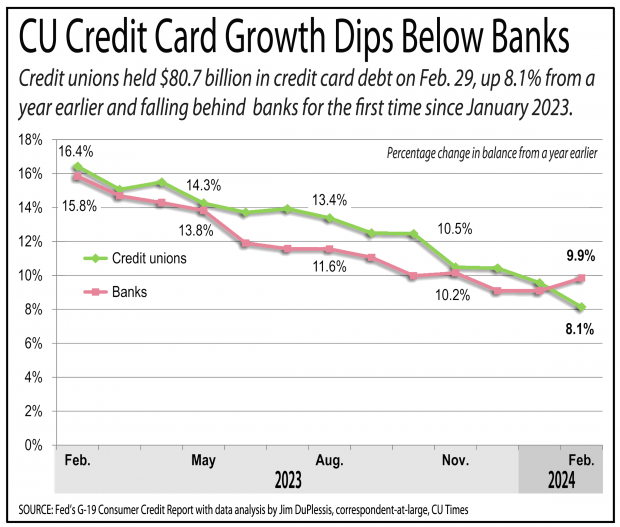 The change over 12 months also showed credit unions falling behind the rest of the market, rising 2.4%, compared with 3.5% at banks and 2.6% overall. Credit unions held $657.2 billion in consumer debt on Feb. 29, or 13.1% of the total, compared with 13.2% in both January 2024 and February 2023.
The change over 12 months also showed credit unions falling behind the rest of the market, rising 2.4%, compared with 3.5% at banks and 2.6% overall. Credit unions held $657.2 billion in consumer debt on Feb. 29, or 13.1% of the total, compared with 13.2% in both January 2024 and February 2023.
Credit unions held $80.7 billion in credit card debt Feb. 29, up 8.1% from a year earlier. The balance fell 1.5% from January to February, compared with a 10-year average February drop of 0.9%. Credit unions’ share was 6.3% in February, unchanged from a year earlier and the previous month.
Banks held $1.2 trillion in credit card debt, up 9.9% from a year earlier. The balance fell 0.7% from January to February, compared with an average February drop of 1.7%. Banks’ share was 90.6% in February, unchanged from January and up from 90.2% in February 2023.
Credit unions held $576.5 billion in non-revolving consumer loans in February, up 1.6% from a year earlier. The balance fell 0.3% from January to February, compared with an average February gain of 0.4%. Read more
Ensuring Servicemembers Can Protect Themselves from Unlawful Financial Practices
 The Servicemembers Civil Relief Act was passed by Congress to enable servicemembers to devote themselves to the defense of the Nation by providing them key protections. This law’s important provisions include the right to reduced interest on certain loans and shielding servicemembers from foreclosure while they are serving the nation.
The Servicemembers Civil Relief Act was passed by Congress to enable servicemembers to devote themselves to the defense of the Nation by providing them key protections. This law’s important provisions include the right to reduced interest on certain loans and shielding servicemembers from foreclosure while they are serving the nation.
In an ongoing case, Citibank has been sued by servicemembers on behalf of themselves and a class of similarly situated people who claim that the bank violated the Servicemembers Civil Relief Act. Four servicemembers say that Citibank charged them and many other active duty servicemembers too much interest on their credit card debt during their military service. Rather than responding on the merits of the servicemembers’ claim, Citibank is fighting their ability even to bring a lawsuit. Citibank is arguing that the servicemembers’ credit-card agreements require them to arbitrate their class claims instead. Last year, a federal judge ruled that the servicemembers are in fact entitled to have their class claims heard in court. Citibank didn’t accept that decision, as it is now appealing the judge’s ruling. And a coalition of businesses — led by the Chamber of Commerce, American Bankers Association, and American Financial Services Association — have sided with Citibank against the group of servicemembers alleging that Citibank broke the law while they were serving their country.
Yesterday, the Department of Justice (DOJ) and the Consumer Financial Protection Bureau (CFPB) filed a brief in this case to help ensure that servicemembers can protect themselves from practices that violate the Servicemembers Civil Relief Act. The brief argues that the judge was correct: the Servicemembers Civil Relief Act plainly says that servicemembers can bring lawsuits in federal court on behalf of a class to protect themselves from financial institutions that violate that law, regardless of any previous agreement calling for arbitration. Congress clearly intended for financial institutions like Citibank to face servicemembers in court when they join together as a class to allege violations of a law that was designed to allow them to focus on serving their country.
- The case is Espin v. Citibank, N.A., No. 23-2083 (4th Cir.).
Read DOJ and CFPB’s amicus brief.
Apr. 5, 2024: Industry and Regulation
- The Big Problem for Marijuana Companies? What to Do with All That Cash
- Federal Judge Sends Credit Card Late Fee Suit to D.C.
- Regulatory Compliance Accounts for One-Third of Ukrainian Credit Unions’ Operating Expenses
- NCUA Opening 2024 CDRLF Grant Round May 1
The Big Problem for Marijuana Companies? What to Do with All That Cash
Few banks will work with cannabis upstarts—but some lawmakers hope to change that this year
Courtesy of Alexander Saeedy, Wall Street Journal
 Clayton Taylor recently received an urgent call: A marijuana distributor needed him to pick up $400,000 and move it across California.
Clayton Taylor recently received an urgent call: A marijuana distributor needed him to pick up $400,000 and move it across California.
Taylor isn’t a drug mule—he runs a company that provides security services to legal cannabis companies. A client’s bank account had been frozen, and the next day was payday. Could Taylor transport cash the company had stowed away so it could pay its roughly 100 staffers?
He and two other armed guards retrieved the money, which the company had in $20 and $100 bills in a duffel bag. They spent the night at a hotel, the bag never leaving their sight, and dropped off the cash the next day. Though marijuana is now legal in some form in most U.S. states, many banks won’t do business with cannabis companies because the drug remains illegal at the federal level. Major credit-card networks such as Visa and Mastercard say they don’t process marijuana-related transactions for the same reason.
Some smaller banks have started to offer services to such companies, but customers say they can be unreliable. That leaves cannabis companies spending inordinate amounts of time and money moving around cash. “For companies that are generating that much money, this is a caveman approach to finance,” Taylor said. In the case of his client, the bank later closed its account, a common occurrence when financial institutions discover ties to the marijuana industry.
But that could soon change.
Several times over the years, lawmakers in the House have passed a bipartisan bill that would make it easier to bank cannabis clients. The Senate has never taken its version up for a vote but is expected to this year, making its advocates more optimistic than ever. Owners of legal marijuana businesses have long argued the current system empowers illegal dealers, who still sell most of the marijuana in the country.
“There’s no banking capital for the regulated cannabis industry, and there’s not much actual banking either,” said Tahir Johnson, a former financial adviser in New Jersey who is preparing to open a cannabis dispensary in May. Read more
Federal Judge Sends Credit Card Late Fee Suit to D.C.
Courtesy of David Baumann, Washington Credit Union Daily
 A federal judge in Texas last week decided that the lawsuit challenging the Consumer Financial Protection Bureau’s credit card late fee belongs in Washington, D.C.
A federal judge in Texas last week decided that the lawsuit challenging the Consumer Financial Protection Bureau’s credit card late fee belongs in Washington, D.C.
“This case does not belong in the Northern District of Texas and certainly not in the Fort Worth Division,” U.S. District Judge Mark Pittman, of the Northern District of Texas, ruled in the lawsuit filed by the American Bankers Association, the U.S. Chamber of Commerce and other trade groups. He added, “Venue is not a continental breakfast; you cannot pick and choose on a plaintiffs’ whim where and how a lawsuit is filed.”
The groups had asked for an injunction blocking implementation of the rule, which will limit most credit card late fees to $8. When Pittman did not issue an injunction, the groups filed a request with the Fifth Circuit Court of Appeals requesting an emergency order blocking the rule.
Notably, the Fifth Circuit Court of Appeals is the same court that has found the CFPB’s funding mechanism unconstitutional. Meanwhile, the CFPB had filed a request to transfer the case to the U.S. District Court for the District of Columbia, where the majority of the plaintiffs and their attorneys work.
“A review of the record shows there are ten attorneys spanning five different firms or organizations representing the various Parties in this case,” Pittman wrote, in his decision.” Of the ten, eight list their offices in the District of Columbia.” “Notably, Plaintiffs do not identify any substantial or practical issues with this case being held in Washington D.C,” he continued. Read more
Regulatory Compliance Accounts for One-Third of Ukrainian Credit Unions’ Operating Expenses
Courtesy of World Council of Credit Unions’ (WOCCU)
 The USAID/World Council of Credit Unions’ (WOCCU) Credit for Agriculture Producers (CAP) Project in February presented the findings of its survey that asked Ukrainian credit unions to estimate their costs associated with regulatory compliance and prudential requirements.
The USAID/World Council of Credit Unions’ (WOCCU) Credit for Agriculture Producers (CAP) Project in February presented the findings of its survey that asked Ukrainian credit unions to estimate their costs associated with regulatory compliance and prudential requirements.
The CAP Project initiated the study in light of the new Laws of Ukraine “On Credit Unions” and “On Financial Services and Financial Companies” that went into effect on January 1, 2024.
According to the provisions of these laws, the National Bank of Ukraine (NBU), the country’s credit union regulator, shall supervise the operations of credit unions by applying a risk-based approach and the principle of proportionality, which may either increase or reduce credit unions’ regulatory costs depending on how the new rules are adopted.
The survey, which looked at a one-year period from July 2022 to June 2023, produced several key findings, including that:
- The regulatory compliance costs of Ukrainian credit unions account for 30% of their total operating expenses and nearly 7% of their total assets.
- Smaller credit unions incur the largest relative costs for regulatory compliance, at 47% versus 30% on average in the sector.
- Almost half of credit union employees’ working hours are spent on fulfilling these regulatory requirements.
- Almost one-third of all regulatory compliance costs account for prudential risk management (compliance with licensing terms, financial ratio calculation, preparation and submission of reports and information per requests from the regulator, internal and external audits). Read more
NCUA Opening 2024 CDRLF Grant Round May 1
Low-income-designated credit unions can apply for 2024 Community Development Revolving Loan Fund grants between May 1 and July 1.
 “These grants give eligible credit unions the resources needed to support the financial needs of their members and communities,” NCUA Chairman Todd M. Harper said. “They create new, safe, fair, and affordable financial products and services and expand existing services. They bolster cybersecurity, build capacity, and train new leaders. There are nearly 2,500 low-income credit unions across the country, so there is a lot of potential for putting these grants to work in rural and under-resourced communities. I encourage eligible credit unions to investigate the CDRLF grants and consider applying.”
“These grants give eligible credit unions the resources needed to support the financial needs of their members and communities,” NCUA Chairman Todd M. Harper said. “They create new, safe, fair, and affordable financial products and services and expand existing services. They bolster cybersecurity, build capacity, and train new leaders. There are nearly 2,500 low-income credit unions across the country, so there is a lot of potential for putting these grants to work in rural and under-resourced communities. I encourage eligible credit unions to investigate the CDRLF grants and consider applying.”
The 2024 CDRLF grant round is open to credit unions with a low-income designation. Minority depository institution credit unions are not eligible for funding in this year’s grant round if they do not have the low-income designation. Credit unions with questions about the low-income designation should contact the NCUA’s Office of Credit Union Resources and Expansion at [email protected].
The agency will administer more than $3.4 million in CDRLF grants to the most-qualified applicants, subject to the availability of funds, and will host a webinar in May to explain the grants process. Grants will be awarded in five categories and one pilot initiative:
- Underserved Outreach (maximum award of $50,000) — Helping credit unions expand access to underserved communities and improve the financial well-being of their members.
- MDI Capacity Building (maximum award of $50,000) — Preserving MDI credit unions and increasing their ability to thrive and serve minority populations.
- Consumer Financial Protection (maximum award of $10,000) — Ensuring credit unions have the resources and expertise to protect credit union members and consumers, raise awareness of potential frauds, and facilitate access to fair and affordable financial services. Read more
Mar. 29, 2024: Industry and Regulation
- Why The Money Laundering Fight Is Going to The Next Level
- Trade Groups Ask Appeals Court to Block Credit Card Late Fee Rule
- 10 Years of FinCEN Marijuana-Banking Guidance
- Related Reading: Yellen Endorses Marijuana Banking Bill
- FDIC Seeks Public Comment on Proposed Revisions to its Statement of Policy on Bank Merger Transactions
Why The Money Laundering Fight Is Going to The Next Level
Courtesy of John Adams, American Banker
 The new year began with a flurry of news that’s just a sample of the crimes that financial institutions must help battle.
The new year began with a flurry of news that’s just a sample of the crimes that financial institutions must help battle.
Nasdaq reported in early January that there were $3.1 trillion in illegal transactions made in 2023. More than $800 billion was connected to drug trafficking, $350 billion was tied to human trafficking and $11 billion from terrorism. Another $500 billion was lost to fraud.
Less than two weeks later, at the beginning of February, the Financial Crimes Enforcement Network issued an advisory against illegal financing being used to fund Israeli extremists that the U.S. had sanctioned for targeting Palestinians. That came at nearly the same time as the Anti-Defamation League warned of anti-Israeli extremists using cryptocurrency to fund terrorist operations. And in late January, new U.S. sanctions were issued against Russian interests connected to the country’s two-year-old war against Ukraine.
In short, financial institutions’ job of preventing money laundering and other illicit money movement is getting harder as they work to comply with U.S. sanctions against countries and parties the government has connected to such activities. That challenge includes a fast-changing regulatory environment, underserved risk management staffs and evolving technology that can benefit and hurt both sides in the fight.
Sixty-nine percent of executives say financial crime risk will increase over the next year, according to research from Kroll, which also reported that 66% of firms plan to boost security spending to combat the threat. The increased investments will go toward mitigating illegal payments, complying with U.S. sanctions and rules fighting money laundering or halting the use of otherwise legitimate financial infrastructure to fund illegal activity.
Money laundering regularly reaches 5% of global GDP, according to research from technology firm Persona. Financial institutions of all sizes have recently been hit with fines tied to AML lapses. Wells Fargo, for example, was fined a total of about $98 million in 2023 after U.S. regulators said the bank had insufficient AML compliance due to trade finance software that dated to a system at Wachovia. Wells Fargo acquired Wachovia more than a decade ago. Read more
Trade Groups Ask Appeals Court to Block Credit Card Late Fee Rule
Courtesy of David Baumann, Washington Credit Union Daily
 The U.S. Chamber of Commerce, the American Bankers Association and state trade groups have asked a Texas federal appeals court to issue an immediate order delaying implementation of the Consumer Financial Protection Bureau’s credit card late fee rule.
The U.S. Chamber of Commerce, the American Bankers Association and state trade groups have asked a Texas federal appeals court to issue an immediate order delaying implementation of the Consumer Financial Protection Bureau’s credit card late fee rule.
In a request filed with the Fifth Circuit Court of Appeals, the groups said they “understand that they are requesting urgent relief, but unfortunately, have no other option to protect their rights given the CFPB’s unlawfully rushed effective date and the millions of dollars that issuers must spend to come into compliance.”
The groups had asked Judge Mark T. Pittman of the U.S. District Court for the Northern District of Texas to issue an injunction blocking the rule, but he refused and questioned why the case was filed in his court when only one of the plaintiffs had any connection to the Lone Star State.
Citing the tenuous tie to Texas, the CFPB and the Biden Administration have requested that Pittman approve the transfer of the case to the U.S. District Court for the District of Columbia. The government attorneys defending the CFPB rule have accused the plaintiffs of forum shopping,
Notably, the Fifth Circuit Court of Appeals is the same court that had ruled that the funding mechanism for the CFPB is unconstitutional because the agency is not funded through the annual appropriations process. The CFPB appealed that ruling and the case is now before the U.S. Supreme Court.
In their appeals court request, the plaintiffs contend that the CFPB violated federal law by giving them only 60 days to implement the rule.
The groups said that the final rule requires credit card issuers representing 95% of the market to update the printed and electronic disclosures that each new card user must receive, as well as millions of periodic disclosures to existing cardholders. “Because approving new disclosure language and ordering new materials takes months, credit card issuers covered by the final rule must begin that costly process now,” they said. They added that based on that timeline, notices would need to be received by customers by March 29.
They pointed out that after they send out notices concerning the new rule, an injunction still could be issued, and new notices would need to be sent to consumers. That could cause “immense customer confusion, potential loss of customer goodwill, and millions of dollars of costs for new notices.” Read more
10 Years of FinCEN Marijuana-Banking Guidance
Courtesy of Maria Brosnan, CRB Monitor
 It’s been 10 years since the U.S. Department of the Treasury’s Financial Crimes Enforcement Network, better known as FinCEN, has provided guidance to financial institutions on how to legally serve the illegal cannabis industry. By most accounts, the rules have been helpful, but work needs to be done to encourage more banks to provide services and reduce costs to businesses.
It’s been 10 years since the U.S. Department of the Treasury’s Financial Crimes Enforcement Network, better known as FinCEN, has provided guidance to financial institutions on how to legally serve the illegal cannabis industry. By most accounts, the rules have been helpful, but work needs to be done to encourage more banks to provide services and reduce costs to businesses.
FinCEN released its guidance, “BSA Expectations Regarding Marijuana-Related Businesses,” on Feb. 14, 2014, in response to an August 2013 memo written by then-Deputy Attorney General James M. Cole, widely known as the “Cole Memo.”
The Cole Memo, while reiterating that cannabis is an illegal Schedule I narcotic under the Controlled Substance Act, acknowledged that more states were legalizing cannabis, and DOJ attorneys and law enforcement needed to prioritize how to enforce the law. Among the eight priorities were:
- Preventing marijuana revenue from going to criminal enterprises
- Preventing state-authorized marijuana activity from being used as a cover for trafficking other illegal drugs or activity
The FinCEN guidance gave banks, credit unions and other financial institutions rules for when to file Suspicious Activity Reports (SARs) and specific money laundering red flags to monitor to comply with the Bank Secrecy Act (BSA). And although Attorney General Jeff Sessions rescinded the Cole Memo in 2018, FinCEN and the financial services industry have continued to use the guidance.
Saphira Galoob, executive director of the Cannabis Financial Industry Group, said that but for the FinCEN guidance, bankers “wouldn’t have the recipe or appetite to get into the cannabis space.”
More than 389,000 SARs reports since 2014
Because cannabis business income is derived from federally illegal activity, bankers are required to file SARs. The FinCEN guidance describes three types of SARs that financial institutions serving the industry must file:
- “Marijuana Limited” – Stating that upon their due diligence, the marijuana-related business does not raise any red flags as described in the Cole Memo and is compliant with banking regulations.
- “Marijuana Priority” – A marijuana-related business may have violated banking or red flag rules and further investigations are being conducted.
- “Marijuana Termination” – A financial institution has terminated an account because the customer has violated banking rules or raised red flags. It also is used if the institution has decided it doesn’t want to serve marijuana companies for business reasons. Read more
Related Reading: Yellen Endorses Marijuana Banking Bill
FDIC Seeks Public Comment on Proposed Revisions to its Statement of Policy on Bank Merger Transactions
 The Federal Deposit Insurance Corporation (FDIC) Board of Directors today approved a Federal Register notice seeking public comment on proposed revisions to the agency’s Statement of Policy (revised SOP) on Bank Merger Transactions.
The Federal Deposit Insurance Corporation (FDIC) Board of Directors today approved a Federal Register notice seeking public comment on proposed revisions to the agency’s Statement of Policy (revised SOP) on Bank Merger Transactions.
“This proposed Statement of Policy would update, strengthen, and clarify the FDIC’s approach to evaluating mergers under the Bank Merger Act,” said Chairman Martin J. Gruenberg. “Given the rapid pace of change and consolidation in the banking industry today, it is vital that the FDIC provide guidance on how it would apply the critical statutory factors under the Bank Merger Act relating to competition, financial resources, the convenience and needs of communities, financial stability, and money laundering. We look forward to receiving thoughtful public comment on the proposal.”
The revised SOP reflects legislative and other developments that have occurred since it was last amended in 2008, including the establishment of the statutory factor regarding the risk to the stability of the United States banking or financial system. The revised SOP is principles based; describes the types of applications subject to FDIC approval; addresses each statutory factor separately; and highlights other relevant matters and considerations, such as related statutes pertaining to interstate mergers, and applications from non-banks or banks that are not traditional community banks. Further, the revised SOP reflects consideration of comment letters received in response to the FDIC’s March 2022 Request for Information and Comment on Rules, Regulations, Guidance, and Statements of Policy Regarding Bank Merger Transactions.
In a separate Federal Register notice, the FDIC, as part of its obligations under the Paperwork Reduction Act of 1995, invites comment on the renewal of the existing information collected in the FDIC Supplement to the Interagency Bank Merger Act application form (OMB Control No. 3064-0015).
Mar. 22, 2024: Industry and Regulation
- More Suspects Arrested in $1 Million CU Shared Branching Network Fraud
- Breaking Down Each State’s Climate Priority Policies
- Judge Wants to Know Why Credit Card Late Fee Case Was Filed in Texas
- CFPB: ASC Hearing Addresses Appraisal Bias, Highlights Deficiencies with the Appraisal Foundation
More Suspects Arrested in $1 Million CU Shared Branching Network Fraud
Courtesy of Peter Strozniak, Credit Union Times
 Theft ring allegedly uses fake IDs with the names of CU members and photos of other persons to steal funds.
Theft ring allegedly uses fake IDs with the names of CU members and photos of other persons to steal funds.
Federal prosecutors arrested four additional New York suspects last week on indictments charging them with alleged bank fraud conspiracy that targeted the credit union shared branch network, stealing nearly $1 million since 2021.
Last week, prosecutors arrested New York City-area residents Victor Barriera, 63, from the Bronx and Jerjuan Joyner, 49, Akeem Balogun, 53, and Lesley Lucchese, 53, all three from Brooklyn. In December, the feds arrested Oluwaseun Adekoya, 38, of Newark, N.J., and David Daniyan, 59, of Brooklyn, who allegedly organized the fraud scheme, as well as Gaysha Kennedy, 45, of Brooklyn and Bronx resident Danielle Cappetti, 45, who allegedly participated in the theft ring.
Adekoya and Daniyan allegedly obtained the personally identifiable information of scores of individuals who banked at credit unions throughout the United States.
The fraud ring suspects exploited the shared branching network by creating fake identifications in the names of credit union members, but with photographs of other individuals, whom they employed to conduct fraudulent transactions at shared branch member credit unions across the nation, according to U.S. Attorney Carla B. Freedman in Syracuse and Craig L. Tremaroli, Special Agent in Charge of the FBI Albany Field Office.
Federal authorities did not reveal how many credit unions throughout the nation had been victimized. However, court documents showed some of the fraudulent transactions allegedly occurred in the upstate New York counties of Albany, Clinton, Rensselaer and Saratoga at credit union branches in Latham, Albany, Plattsburgh, Cohoes and Rouses Point.
The indictments also charged the eight defendants with allegedly conducting more than 200 fraudulent transactions and stealing in excess of $900,000, which the ringleaders allegedly used to purchase luxury items including Rolex watches, Mercedes-Benz vehicles, and high-end clothing and apparel. Read more
Breaking Down Each State’s Climate Priority Policies
Courtesy of Emma Kennedy, Law360
 Forty-five states have now completed climate action plans outlining how they’ll advance federal climate goals through policy and programs in coming years, with most focusing at least in part on real estate development as a way to reduce emissions.
Forty-five states have now completed climate action plans outlining how they’ll advance federal climate goals through policy and programs in coming years, with most focusing at least in part on real estate development as a way to reduce emissions.
Many of the states — as well close to a dozen major metro areas — will focus on real estate development policy such as up zoning, committing to building weatherization and electrification, conservation, and renewable energy development, among other common goals.
Submitting a “priority action climate plan” was a prerequisite for eligibility for $4.6 billion in grants under the U.S. Environmental Protection Agency’s Climate Pollution Reduction Grants program to carry out the policies and programs in the recent action plans. Those grant awardees will be announced in coming months.
The states were required to outline priority measures that could be customized to meet local goals and challenges, but which must take into account low-income and disadvantaged communities and be implementation-ready. While many of the states’ priority measures are dependent on funding to begin implementation, the action plans still give insight into the direction each state is moving in its climate-related real estate regulation.
Florida, Iowa, Kentucky, South Dakota and Wyoming did not submit reports.
Here, Law360 takes a look at the real estate and development-related measures each participating state is prioritizing in its climate action plans.
Alabama
Many of Alabama’s land-related priorities surrounded agriculture and offsetting greenhouse gas emissions from farming and transportation of food and other resources. The state is proposing implementing solar arrays on farms to reduce agriculture’s high energy consumption and boost resilience, as well as to lessen the climate impact of irrigation. The report also proposes programs and measures to increase local production of grains and vegetables to reduce the emissions generated in transporting those commodities from the Midwest and California. Read more
Judge Wants to Know Why Credit Card Late Fee Case Was Filed in Texas
Courtesy of David Baumann, Washington Credit Union Daily
 Much to the consternation of the U.S. Chamber of Commerce, the American Bankers Association, the Consumer Bankers Association and state business groups, a Texas federal judge appears suspicious about the reason a lawsuit challenging the Consumer Financial Protection Bureau’s final credit card rule was filed in the Lone Star State.
Much to the consternation of the U.S. Chamber of Commerce, the American Bankers Association, the Consumer Bankers Association and state business groups, a Texas federal judge appears suspicious about the reason a lawsuit challenging the Consumer Financial Protection Bureau’s final credit card rule was filed in the Lone Star State.
“The Court is weary [sic] that there appears to be an attenuated nexus to the Fort Worth Division, given only one plaintiff of the six in this matter has even a remote tie to the Fort Worth Division,” Judge Mark T. Pittman of the U.S. District Court for the Northern District of Texas wrote in ordering the business groups to explain why they filed suit in Texas.
In an earlier filing, the government attorneys defending the CFPB rule accused the plaintiffs of forum shopping, pointing out that there was not much of a link between the plaintiffs and Texas. Traditionally, Texas federal courts have been more friendly to business groups than courts in other areas of the U.S.
Judge Pittman invited federal government attorneys to file for a transfer to a more relevant court and the government attorneys did just that.
The trade group attorneys fired back, saying that the judge should consider issuing an injunction barring implementation of the rule before deciding whether the case should be transferred. They added that if Pittman has not issued an injunction by Friday, they would seek an immediate appeal of his decision not to issue one.
The court fight comes just weeks after the CFPB issued its final credit card late fee rule. The rule would affect credit card issuers with at least one million open accounts. Most late fees would be capped at $8, although issuers could charge more if they can demonstrate that their costs exceed that amount. Read more
CFPB: ASC Hearing Addresses Appraisal Bias, Highlights Deficiencies with the Appraisal Foundation
 Homeownership can be a powerful tool for building intergenerational wealth, and a well-functioning mortgage market depends on accurate appraisals. Many minority homebuyers and owners, however, continue to report facing illegal discrimination during the home appraisal process because of their race, national origin, and community demographics.
Homeownership can be a powerful tool for building intergenerational wealth, and a well-functioning mortgage market depends on accurate appraisals. Many minority homebuyers and owners, however, continue to report facing illegal discrimination during the home appraisal process because of their race, national origin, and community demographics.
A little-known non-profit corporation, The Appraisal Foundation, sets qualifications for becoming an appraiser and standards for conducting appraisals. Recent developments, including shifting explanations and deficient policies around conflicts of interest, have raised troubling questions about whether The Appraisal Foundation can realistically address challenges including appraisal bias. CFPB Director Rohit Chopra shared those concerns with his fellow financial regulators in a public comment letter.
Hearings on addressing appraisal bias
The Appraisal Subcommittee (ASC) of the Federal Financial Institutions Examination Council provides federal oversight of state appraisal regulatory programs, and is chaired by CFPB Deputy Director Zixta Martinez. The ASC has been holding a series of public hearings focused on appraisal bias, and its fourth hearing on February 13 (watch here ) examined how state and federal regulators can address appraisal bias and increase diversity in the profession.
The ASC assembled a panel of representatives from each of its seven federal financial regulatory member agencies, including CFPB Director Rohit Chopra as representative for the CFPB. During the hearing, this panel asked questions of five witnesses:
- David Bunton, President, The Appraisal Foundation
- Ed Neelly IV, Executive Director, Mississippi Appraisal Board
- Maureen Sweeney, President, Maureen Sweeney, Real Estate Appraiser, Ltd.
- Melissa Tran, Director, Texas Appraiser Licensing and Certification Board
- Jillian White, Chief Executive Officer, Appraisal Insights
Governance and transparency
Over the course of the hearings, the ASC has gathered information about the governance framework and integrity of The Appraisal Foundation. The ASC is required to monitor and review The Appraisal Foundation’s practices, procedures, activities, and organizational structure. Read more
Mar. 15, 2024: Industry and Regulation
- U.S. Department of the Treasury and State Insurance Regulators Launch Coordinated Effort on Homeowners Insurance Data Collection to Assess the Effects of Climate Risk on U.S. Insurance Markets
- Banks Backpedal on Climate Amid Federal Scrutiny, Anti-ESG Pressure
- Blank-cheque Company Aims to Buy Failed U.S. Banks
- U.S. Bank Regulators Weigh New Operational Resilience Requirements
U.S. Department of the Treasury and State Insurance Regulators Launch Coordinated Effort on Homeowners Insurance Data Collection to Assess the Effects of Climate Risk on U.S. Insurance Markets
 Today, the U.S. Department of the Treasury’s Federal Insurance Office (FIO) advanced its efforts to collect insurance data to better understand the impacts of climate-related financial risks on the insurance sector, by launching a first-of-its kind collaboration with state insurance regulators and the National Association of Insurance Commissioners (NAIC). This FIO and NAIC collaboration represents the next step of FIO’s efforts that were first publicly announced over one year ago.
Today, the U.S. Department of the Treasury’s Federal Insurance Office (FIO) advanced its efforts to collect insurance data to better understand the impacts of climate-related financial risks on the insurance sector, by launching a first-of-its kind collaboration with state insurance regulators and the National Association of Insurance Commissioners (NAIC). This FIO and NAIC collaboration represents the next step of FIO’s efforts that were first publicly announced over one year ago.
The NAIC will be collecting, on behalf of participating state insurance regulators, ZIP Code-level data from the largest homeowners insurers. FIO will be closely coordinating with the NAIC as the NAIC shares granular information with FIO in the coming months. FIO will use this data to conduct a nationwide assessment of climate-related financial risks to consumers across the United States.
“Americans across the country are seeing the affordability and availability of their insurance policies decline as a result of increasingly severe climate-related disasters,” said Secretary of the Treasury Janet L. Yellen. “I’m pleased that the Federal Insurance Office, state insurance regulators, and the NAIC are collaborating on this important data collection. Analysis of homeowners insurance data is essential to understanding the market impacts on consumers and helping policymakers across the country respond appropriately to the risks.”
FIO previously proposed to collect climate-related data directly from insurance companies, as approved by the Office of Management and Budget earlier this year. In light of the agreement by the NAIC and state insurance regulators to provide FIO with timely data comparable to its proposed collection, and to help mitigate reporting burdens on relevant insurance companies, FIO will pursue its efforts as part of the data collection collaboration with the NAIC rather than issue its own separate data collection at this time.
The NAIC and FIO have agreed that the NAIC will begin sending the data to FIO in June 2024, shortly after the close of the NAIC data collection. The NAIC has agreed to provide FIO with final data in late September.
FIO’s analysis of the data received will help respond to President Biden’s Executive Order on Climate-related Financial Risk, EO 14030 (May 20, 2021), which called on FIO to “assess, in consultation with States, the potential for major disruptions of private insurance coverage in regions of the country particularly vulnerable to climate change impacts.” Read more
Banks Backpedal on Climate Amid Federal Scrutiny, Anti-ESG Pressure
Courtesy of Saul Elbein, the Hill
 Many of the largest U.S. banks and asset managers are retreating from their climate commitments amid rising federal scrutiny and an assault on environmentally conscious investing in state legislatures.
Many of the largest U.S. banks and asset managers are retreating from their climate commitments amid rising federal scrutiny and an assault on environmentally conscious investing in state legislatures.
As more stringent federal oversight looms and bills to blacklist and in some cases criminalize banks that refuse to invest in fossil fuels are proposed in statehouses across the country, many banks have in different ways backpedaled — at least rhetorically — on steps they have taken since the 2015 Paris Climate Accords toward slowing the warming of the planet by financing a gradual transition away from fossil fuels.
Last week, State Street and the asset management arm of JPMorgan Chase announced they would exit the environmentally friendly Climate Action 100+ investment alliance — citing that group’s approach to proxy voting, which has been a consistent target of punitive Republican legislation.
That announcement followed Bank of America’s reversal two weeks ago on its pledge not to pay for new infrastructure to mine, ship and burn coal — a fuel that is the dominant historic contributor to a warming planet — or oil exploration in the Arctic.
And in perhaps the most potent and symbolic image of the retreat, BlackRock CEO Larry Fink — long a bogeyman of “woke capital” to Republican lawmakers — in early February co-produced an energy conference with the state government of Texas, which had blacklisted his company in 2022 over allegations that it was boycotting fossil fuels.
Marking a further closure of that rift, Fink announced during the conference that the company would help Texas raise $10 billion to build new fossil fuel-powered plants. “As a business leader and a leader of government, we saw that those differences can be minimized quite, quite quickly,” Fink said — warm sentiments that Texas’s Republican leadership echoed.
“I don’t know what I expected from the king of Wall Street, but we kind of hit it off immediately,” Lt. Gov. Dan Patrick (R) told the Houston crowd. Read more
Blank-cheque Company Aims to Buy Failed U.S. Banks
Courtesy of Stephen Gandel, Financial Times
 Blank-cheque companies have raised money to buy businesses ranging from pilotless helicopters to social media platforms. A group of Wall Street veterans is now setting its sights on a new target: failed banks. Porticoes Capital will seek to take over banks closed by the Federal Deposit Insurance Corporation, the US regulator, according to an official filing. The firm’s sponsors aim to attract hundreds of millions of dollars from investors.
Blank-cheque companies have raised money to buy businesses ranging from pilotless helicopters to social media platforms. A group of Wall Street veterans is now setting its sights on a new target: failed banks. Porticoes Capital will seek to take over banks closed by the Federal Deposit Insurance Corporation, the US regulator, according to an official filing. The firm’s sponsors aim to attract hundreds of millions of dollars from investors.
The best-known blank-cheque groups are special purpose acquisition companies, which list on stock markets with a goal of taking another business public through a merger. Spacs exploded in popularity during the coronavirus pandemic but have faded as many of their targets proved to be disappointments, and in some instances frauds.
Porticoes is similar to a Spac in that is not an operating company and would need to complete an acquisition before opening for business. Unlike a Spac, the amount it actually raises from investors will depend on the size of the bank it eventually acquires.
The bet on failed banks suggests Porticoes’ sponsors see more trouble ahead for the sector a year after the failure of Silicon Valley Bank shook confidence in US regional lenders.
Leading the venture is Leslie Lieberman, an executive who got his start at former investment bank Drexel Burnham Lambert, worked on mergers and acquisitions at Kidder Peabody and bought banks in the wake of the 2008 financial crisis.
Joining Lieberman as a board member is Tom Naratil, formerly one of the highest-ranking US executives at Swiss bank UBS before he left in 2022. Also in the group is Manuel Sánchez Rodriguez, a former top executive at Spanish bank BBVA and a board member, since 2018, of the US government-backed mortgage insurance company Fannie Mae. Read more
U.S. Bank Regulators Weigh New Operational Resilience Requirements
Courtesy of Richard Vanderford, Wall Street Journal
 U.S. financial regulators are exploring new requirements to make sure that large banks can weather disruptions to their operations, a top official said Tuesday, citing the rise of challenges such as ransomware attacks as bank footprints expand worldwide.
U.S. financial regulators are exploring new requirements to make sure that large banks can weather disruptions to their operations, a top official said Tuesday, citing the rise of challenges such as ransomware attacks as bank footprints expand worldwide.
Acting Comptroller of the Currency Michael Hsu said banks need to address challenges to their operations separate from the familiar liquidity shortfalls, and floated the possibility of testing banks on their resilience.
“The federal banking agencies are considering what changes to our operational resilience framework might be appropriate,” Hsu told an audience of bankers in Washington.
“This is not a problem that capital or liquidity can solve,” he said. “Ensuring that critical operations and banking services can withstand or recover from disruptive events requires good planning, prudent investment, well-designed systems and regular testing.”
The stability of the banking sector last year garnered attention as some institutions big and small struggled to cope with stress to the financial system. Institutions in recent years have spread their operations around the globe, mirroring manufacturing supply chains and exposing themselves to similar vulnerabilities, Hsu said.
Hsu cited recent cyberattacks on the Industrial and Commercial Bank of China and smaller financial sector firms as early warning signs of the financial sector’s vulnerability to disruption. Read more
Mar. 8, 2024: Industry and Regulation
- CFPB Credit Card Rule: Praise, Condemnation, and Lawsuit Challenge
- Wells Fargo Faces New Class-Action Suit Over Fake-Accounts Response
- What Are U.S. Financial Advisers’ AML Expectations Under Recent FinCEN Proposal?
- Bank of America Escrow Case Met with Skepticism in Supreme Court
- CFPB Invokes “Dormant” Authority and Unveils First Public Supervisory Designation of a High-Risk Nonbank Installment Lender
CFPB Credit Card Rule: Praise, Condemnation, and Lawsuit Challenge
 Courtesy of David Baumann, Washington Credit Union Daily
Courtesy of David Baumann, Washington Credit Union Daily
It was a big day on the junk fee front on Thursday. The U.S. Chamber of Commerce and banking trade groups filed suit in a Texas federal court challenging the Consumer Financial Protection Board’s final credit card late fee rule. During a hearing, a key Republican House member accused agency Director Rohit Chopra of running an unaccountable agency. Then in the evening, during the State of the Union, President Biden lauded the Consumer Financial Protection Bureau’s efforts to rein in so-called “junk fees.”
The Chamber of Commerce had warned that if the credit card late fee was adopted that they would file a lawsuit, and they wasted no time in doing so. The CFPB issued the final rule earlier this week and the rule will decrease most credit card late fees to $8.
On Thursday the U.S. Chamber of Congress was joined by the American Bankers Association, the Consumer Bankers Association, and state business groups in a lawsuit filed in the U.S. District Court for the District of Texas, challenging the credit card late fee rule. Texas federal courts generally have favored business over federal regulators, which likely explains why the suit was filed there.
“The Rule, which upends more than a decade of regulations, is unlawful,” the suit states. It argues that Congress has specifically authorized the use of penalty fees for late payments. It asks the court to nullify the rule.
Also on Thursday, the House Financial Institutions and Monetary Policy Subcommittee was holding a hearing on the alleged politicization of the regulatory process. Chairman Rep. Andy Barr, R-Ky., took the opportunity to say that the Biden Administration was using independent agencies such as the CFPB to “circumvent Congress and drive leftist transformations in financial regulation to the detriment of consumers and communities.”
Barr noted that the CFPB released the final credit card late fee rule during the same week as Biden’s State of the Union address. “In deciding to finalize the credit card late fee rule nearby President Biden’s State of the Union address, the CFPB is showing how politics, not consumer protection, drives the train under Director Chopra,” Barr said. Read more
Wells Fargo Faces New Class-Action Suit Over Fake-Accounts Response
Courtesy of Rajashree Chakravarty, BankingDive
 A complaint filed Thursday seeks $5 million for customers who received letters from the bank asking them to contact Wells Fargo about being enrolled in unwanted products. Wells Fargo was hit with a new lawsuit Thursday alleging the bank did not do enough to reimburse customers affected by its 2016 fake-accounts scandal, Reuters reported.
A complaint filed Thursday seeks $5 million for customers who received letters from the bank asking them to contact Wells Fargo about being enrolled in unwanted products. Wells Fargo was hit with a new lawsuit Thursday alleging the bank did not do enough to reimburse customers affected by its 2016 fake-accounts scandal, Reuters reported.
The class-action lawsuit, filed in a San Francisco federal court by Amanda Gonzales, a schoolteacher from New Mexico, comes on the heels of Wells Fargo recently sending letters to customers urging them to contact the bank if they were unknowingly enrolled in unwanted products.
The proposed class action alleges the lender intentionally made the letters vague and confusing in the hopes that customers would discard them rather than realize they may have valid claims.
The complaint claimed Wells “relies on the inconspicuous and suspicious nature of the letter to depress claims rates, shifting the burden on the customer to take action to dispute an ‘enrollment’ that Wells Fargo knows to have been.”
Wells Fargo intends to “avoid, reduce and delay its ultimate liability and sweep under the rug its long-standing, intentional misconduct” by switching the burden on the customers, the complaint noted.
“We are still reviewing the claims in this lawsuit and can’t share specifics at this time,” Wells Fargo said in a statement to Banking Dive. “Wells Fargo is a different company today, with new people, structure, processes, controls, and culture in place, and we have placed heavy emphasis on remediating customers for past practices.”
The complaint seeks $5 million for recipients of the letter and alleges Wells violated the federal Fair Credit Reporting Act, as well as consumer protection laws in California and New Mexico. Read more
What Are U.S. Financial Advisers’ AML Expectations Under Recent FinCEN Proposal?
Courtesy of Jason Wallace, Thomson Reuters
 As anti-money laundering becomes a bigger priority for regulators, some investment advisors in the US are being asked to adopt more stringent prevention programs. The Financial Crimes Enforcement Network (FinCEN), a unit of the U.S. Treasury Department, has released a new proposal that would require certain investment advisers to adopt anti-money laundering (AML) programs.
As anti-money laundering becomes a bigger priority for regulators, some investment advisors in the US are being asked to adopt more stringent prevention programs. The Financial Crimes Enforcement Network (FinCEN), a unit of the U.S. Treasury Department, has released a new proposal that would require certain investment advisers to adopt anti-money laundering (AML) programs.
The proposal has been more than 20 years in the making and will require advisers registered with the U.S. Securities and Exchange Commission (SEC) and exempt reporting advisers (ERAs) to establish AML programs, file suspicious activity reports (SARs), and comply with AML reporting and recordkeeping obligations as a “financial institution” under the Bank Secrecy Act (BSA), which, among other things, would require firms to file currency transaction reports (CTRs) and keep records relating to money transfers.
The proposal would apply only to advisers required to be registered with the SEC and ERAs; however, future rulemaking may include other types of advisers, such as state-regulated advisers. If adopted, FinCEN would delegate its examination authority to the SEC.
In 2003 and again in 2015, FinCEN proposed to include certain investment advisers within the definition of “financial institution” and impose AML compliance obligations on such advisers. The proposals were met with heavy resistance from the industry and never formalized. In fact, the 2015 proposal was substantially similar to the current one but has now been expanded to include ERAs as a covered adviser for AML program requirements.
Since then, many advisers have voluntarily implemented an AML program on their own initiative as a best practice. In addition, programs were implemented to satisfy the requirements of counterparties or to allow broker-dealers to rely upon them for part of their AML program.
AML program requirements
Under the latest proposal, an adviser would be required to develop and implement a written, risk-based program that is reasonably designed to prevent the adviser from being used to facilitate money laundering and the financing of terrorism. Read more
Bank of America Escrow Case Met with Skepticism in Supreme Court
Courtesy of Brad Finkelstein, American Banker
 The U.S. Supreme Court seemed skeptical of both sides in a case involving state preemption of the National Banking Act. Whether national banks need to pay interest on mortgage escrow accounts in New York — and likely elsewhere — will turn on how the Court determines what constitutes substantial interference with their activities.
The U.S. Supreme Court seemed skeptical of both sides in a case involving state preemption of the National Banking Act. Whether national banks need to pay interest on mortgage escrow accounts in New York — and likely elsewhere — will turn on how the Court determines what constitutes substantial interference with their activities.
But the justices in their questioning seemed to be “very uncomfortable” in trying to explain what is meant by the relevant statute, the National Banking Act, said Joseph Lynyak, a partner at the law firm of Dorsey & Whitney.
“The basis of the problem is the very poorly drafted statutory language that adopted Section 25b when Dodd-Frank was written,” he said in a statement. “For example, several of the Justices wondered whether ‘significantly interferes’ should be understood purely as statutory language, or whether the term was intended to be understood as used in the Barnett Banks decision (which is directly named in Section 25b).”
The justices asked tough questions for both sides: petitioners Alex Cantero, Saul Hymes and Ilana Harwayne-Gidansky and for Bank of America. The Solicitor General also appeared before the Court after the petitioners spoke. In hearing the arguments, the justices suggested that, depending on the interpretation, nothing or virtually every action could be preempted, Lynyak noted.
Answering a question from Justice Brett Kavanaugh, petitioner attorney Jonathan Taylor admitted “I would concede that it’s not a bright-line test. Congress didn’t want a bright-line test.”
In response to Justice Sonia Sotomayor, Lisa Blatt, representing Bank of America, attempted to establish when the preemption would apply. Read more
CFPB Invokes “Dormant” Authority and Unveils First Public Supervisory Designation of a High-Risk Nonbank Installment Lender
Courtesy of Erik Halvorson , Andrew J. Narod of Bradley Arant Boult Cummings LLP – Financial Services Perspectives
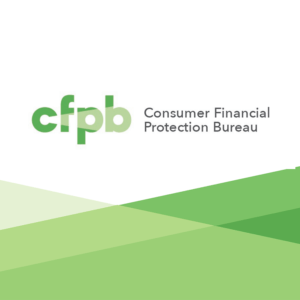 Nearly two years ago, in April 2022, the CFPB issued a press release announcing its intent to start exercising its authority to examine non-bank financial services institutions that the CFPB has “reasonable cause to determine pose risks to consumers.” The agency also indicated that it would release to the public the results of such supervision. These actions signaled a substantial change from the CFPB’s past exercise of its supervisory authority, even though Section 1024(a)(1)(C) of the Consumer Financial Protection Act provided this type of authority since 2010.
Nearly two years ago, in April 2022, the CFPB issued a press release announcing its intent to start exercising its authority to examine non-bank financial services institutions that the CFPB has “reasonable cause to determine pose risks to consumers.” The agency also indicated that it would release to the public the results of such supervision. These actions signaled a substantial change from the CFPB’s past exercise of its supervisory authority, even though Section 1024(a)(1)(C) of the Consumer Financial Protection Act provided this type of authority since 2010.
As set forth in the April 2022 procedural rule also associated with this press release, when the CFPB intends to exercise its supervisory authority over a non-bank entity, agency procedures require the CFPB to issue a notice. Then, the subject entity may either consent to the CFPB’s authority or contest it. In the past, entities almost uniformly consented. The CFPB, under this process, has already designated certain nonbanks for supervision under this rule, but those designations have been confidential because they were not challenged. But on February 13, 2024, the CFPB published its first order establishing a supervisory designation in a contested matter. This order also came less than one week after the CFPB announced a significant update to its Supervisory Appeals Process.
The order concerns World Acceptance Corporation, one of the nation’s largest personal installment lenders. After an approximately six-month-long process that involved several rounds of briefing, the CFPB determined that World Acceptance had met the legal requirements for supervision. In other words, the CFPB determined that it had reasonable cause to believe World Acceptance’s conduct “poses risks to consumers with regard to the offering or provision of consumer financial products or services.” Specifically, the CFPB concluded that it had reasonable cause to believe that the company was (1) misleading consumers by not adequately informing them that the insurance coverage it offers is optional, (2) engaging in excessive, harassing, and coercive collection practices, (3) furnishing inaccurate information to consumer reporting agencies that negatively impacted consumer credit scores, and (4) harming consumers by using a business model that relies on serially refinancing loans. The agency concluded that any one of these findings on its own met the legal requirements for supervision. Read more
Mar. 1, 2024: Industry and Regulation
- OPINION: The Pros of The Ballooning Shadow Banking System
- Raising the Threshold for Tougher Bank Regs May Not Have Paid Off After All
- America’s Credit Unions: Loosen Rules to Increase Financial Inclusion
- FDA Official Says Agency Is ‘Actively’ Exploring CBD Regulations
- Related FDA Regulations: FDA Regulation of Cannabis and Cannabis-Derived Products, Including Cannabidiol (CBD)
OPINION: The Pros of The Ballooning Shadow Banking System
Courtesy of Robin Wigglesworth, Financial Times
 You may have noticed that banks aren’t quite what they once were. More and more of the financial system’s heavy lifting is now being done by capital markets. At least in the US. Here’s a new NBER paper that estimates that the market share of US banks in all private lending has almost halved from 60 percent in 1970 to 35 percent last year; loans as a percentage of bank assets have fallen from 70 percent to 55 percent; and that the share of household wealth held in deposit accounts has fallen from 22 percent to 13 percent. The flipside is an explosion of lending by bond funds and other investment vehicles that are often collectively called “shadow banks.” The numbers calculated by Greg Buchak, Gregor Matvos, Tomasz Piskorski, and Amit Seru are stark and interesting, but not enormously groundbreaking.
You may have noticed that banks aren’t quite what they once were. More and more of the financial system’s heavy lifting is now being done by capital markets. At least in the US. Here’s a new NBER paper that estimates that the market share of US banks in all private lending has almost halved from 60 percent in 1970 to 35 percent last year; loans as a percentage of bank assets have fallen from 70 percent to 55 percent; and that the share of household wealth held in deposit accounts has fallen from 22 percent to 13 percent. The flipside is an explosion of lending by bond funds and other investment vehicles that are often collectively called “shadow banks.” The numbers calculated by Greg Buchak, Gregor Matvos, Tomasz Piskorski, and Amit Seru are stark and interesting, but not enormously groundbreaking.
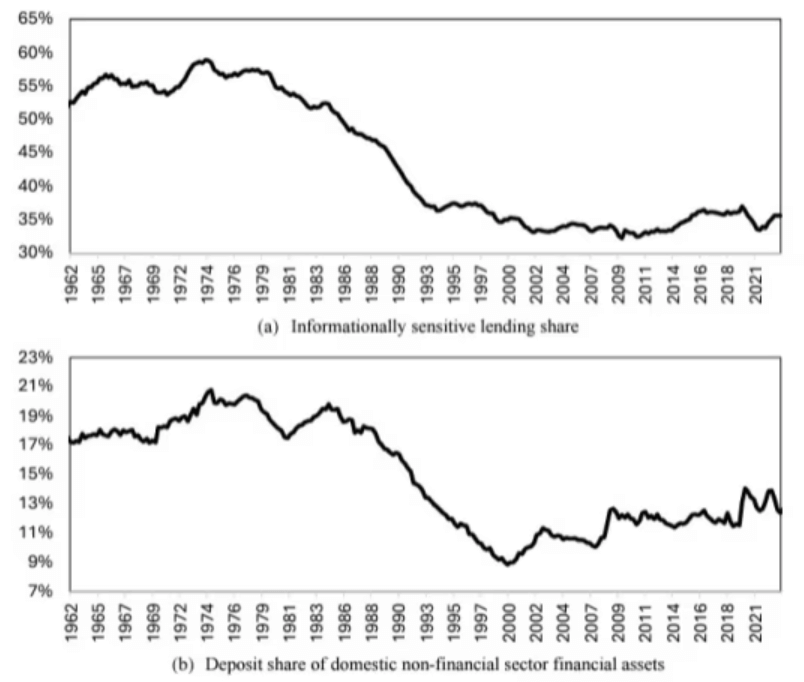 It’s widely known that financial technologies like securitization make it easier for markets to do more lending and that more onerous regulations make traditional lending much trickier for banks. Meanwhile, people are stashing more and more of their money into investment funds rather than bank accounts. The result looks like this:
It’s widely known that financial technologies like securitization make it easier for markets to do more lending and that more onerous regulations make traditional lending much trickier for banks. Meanwhile, people are stashing more and more of their money into investment funds rather than bank accounts. The result looks like this:
One interesting thing is that the bank share of overall lending — what the paper refers to in teeth-grinding academese as “informationally sensitive lending share” — hasn’t declined further since the 2008 financial crisis, despite even tougher regulations in its wake. And there’s a lot of money that stayed in deposits despite negligible interest rates. But the most interesting aspect of the paper is the argument that the radical reshaping of the lending ecosystem over the past few decades means that the banking sector could handle MUCH tougher capital requirements without massively curtailing credit extension — the biggest argument against such a move. Read more
Raising the Threshold for Tougher Bank Regs May Not Have Paid Off After All
Courtesy of John Heltman, American Banker
 A few weeks ago, we all learned that New York Community Bank — which had acquired roughly $38 billion of assets from Signature Bank, one of the casualties of last year’s midsize bank crisis — was having some problems. During their fourth quarter earnings call Jan. 31, NYCB executives charged off a couple of loans, increased its loan loss reserves and cut its dividend significantly, which in turn caused its stock price to plummet.
A few weeks ago, we all learned that New York Community Bank — which had acquired roughly $38 billion of assets from Signature Bank, one of the casualties of last year’s midsize bank crisis — was having some problems. During their fourth quarter earnings call Jan. 31, NYCB executives charged off a couple of loans, increased its loan loss reserves and cut its dividend significantly, which in turn caused its stock price to plummet.
There are many, many takes out there about what went wrong at NYCB and what it means for the rest of the banking industry and the economy at large, but the aspect of this episode that may be worthy of deeper consideration is whether enhanced regulatory obligations brought about by rapid growth had the effect of destabilizing the bank.
NYCB CEO and President Thomas Cangemi said the acquisition of Signature’s assets last year spurred the bank to pass the $100 billion asset mark “sooner than anticipated” and as a result the bank “pivoted quickly and accelerated some necessary enhancements,” namely in the form of additional loan loss reserves. Keep in mind that one of the faults found in the Silicon Valley Bank experience was that regulators — and the bank itself — were unable to keep pace with the bank’s dramatic growth, so perhaps regulators overlearned the lesson and cracked down extra hard on NYCB as its asset portfolio grew.
Of course there are important differences between NYCB and SVB, not the least of which is that NYCB is still a going concern and SVB is not, and that itself is at least in part attributable to the fact that only about 28% of NYCB’s deposits are uninsured compared to 90ish% of the late SVB’s. But rapid growth is something that they have in common, as are the enhanced prudential standards that kicked in when both banks reached an asset threshold of $100 billion. Read more
America’s Credit Unions: Loosen Rules to Increase Financial Inclusion
Courtesy of David Baumann, Washington Credit Union Daily
 Trade group says current rules hamper credit union efforts. Credit unions would serve more low- and moderate-income people if regulators and Congress allowed them to do it, America’s Credit Unions said this week. The trade group told the Treasury Department that credit unions could increase financial inclusion if field of membership rules were loosened, and if credit unions were permitted to expand their lending.
Trade group says current rules hamper credit union efforts. Credit unions would serve more low- and moderate-income people if regulators and Congress allowed them to do it, America’s Credit Unions said this week. The trade group told the Treasury Department that credit unions could increase financial inclusion if field of membership rules were loosened, and if credit unions were permitted to expand their lending.
The Treasury Department late last year solicited public comment on ways to increase financial inclusion in the United States. More than 100 groups and individuals filed comments with the Treasury Department on financial inclusion issues.
In America’s Credit Unions’ response, Senior Regulatory Affairs Counsel Amanda Smith wrote that the trade group does not favor regulatory oversight and mandatory requirements related to financial inclusion. This is because each credit union can only be as diverse as their field of membership permits.
Smith said that the pool of credit union members is limited by a credit union’s field of membership. “Policies that offer greater flexibility regarding FOM allows credit unions to serve a broader range of members, including those that are underserved,” she wrote, adding that the trade group supported legislation that would ease field of membership requirements for people in underserved areas. That legislation was introduced in the last Congress but was not enacted.
“Credit unions have been a critical provider of financial services to rural and underserved areas and [that] legislation would strengthen their ability to continue that work,” she wrote. Smith added that credit unions could serve more people if the technical term “service facilities” included digital channels.
In addition, she wrote that to increase financial inclusion, credit unions need more flexibility to offer small business and small-dollar loans. Credit unions often are not permitted to help as much as low- and moderate-income members may need. She said that under the National Credit Union Administration’s Payday Alternative Loan model, borrowers may receive a maximum loan of $1,000. She added that limits on the number of PAL loans a borrower may have at one time or in one year prevent some consumers from gaining access to those loans. Read more
FDA Official Says Agency Is ‘Actively’ Exploring CBD Regulations
Courtesy of Kyle Jaeger, Marijuana Moment
 The Food and Drug Administration (FDA) is “actively” exploring a potential regulatory framework for CBD, with plans to prioritize the issue in the next year, a top official says. Meanwhile, the agency is also investigating issues related to kratom. FDA Deputy Commissioner for Policy, Legislation, and International Affairs Kimberlee Trzeciak discussed the agency’s cannabis and kratom interests during a webinar hosted by the Alliance for a Strong FDA this month.
The Food and Drug Administration (FDA) is “actively” exploring a potential regulatory framework for CBD, with plans to prioritize the issue in the next year, a top official says. Meanwhile, the agency is also investigating issues related to kratom. FDA Deputy Commissioner for Policy, Legislation, and International Affairs Kimberlee Trzeciak discussed the agency’s cannabis and kratom interests during a webinar hosted by the Alliance for a Strong FDA this month.
Asked about issues that are “top of mind” for the agency in 2024 and where officials hope to engage with Congress, Trzeciak said that later this year or next year FDA wants to address setting up “an appropriate regulatory framework for CBD.” The Food and Drug Administration (FDA) is “actively” exploring a potential regulatory framework for CBD, with plans to prioritize the issue in the next year, a top official says. Meanwhile, the agency is also investigating issues related to kratom.
FDA Deputy Commissioner for Policy, Legislation, and International Affairs Kimberlee Trzeciak discussed the agency’s cannabis and kratom interests during a webinar hosted by the Alliance for a Strong FDA this month. Asked about issues that are “top of mind” for the agency in 2024 and where officials hope to engage with Congress, Trzeciak said that later this year or next year FDA wants to address setting up “an appropriate regulatory framework for CBD.”
- Related FDA Regulations: FDA Regulation of Cannabis and Cannabis-Derived Products, Including Cannabidiol (CBD)
Later in the conversation, the FDA official was asked specifically about how the agency is “prioritizing” its work on cannabis and kratom regulations, and she said officials are taking a number of factors into consideration as they work to address the substances. “In almost every neighborhood you go to, you can see stores on the corners that are marketing CBD and kratom and others,” she said. “And one of the things that we have been thinking through here at FDA, using CBD as an example, is what does the regulatory framework for those products look like?” Read more
Feb. 23, 2024: Industry and Regulation
- NCUA Inspector General: Lack of Vendor Authority Puts Billions at Risk
- FinCEN Proposes Rule to Stop Criminals, Foreign Adversaries from Exploiting Financial System
- CFPB Report Finds Large Banks Charge Higher Credit Card Interest Rates than Small Banks and Credit Unions
- ICYMI: Bank Regulators Say SEC Rule May Undermine Custody Banking
NCUA Inspector General: Lack of Vendor Authority Puts Billions at Risk
 NCUA inspector general renews call for Congress to give NCUA oversight powers
NCUA inspector general renews call for Congress to give NCUA oversight powers
Courtesy of David Baumann, Washington Credit Union Daily
The National Credit Union Administration’s inability to oversee credit union third-party vendors leaves billions of dollars at risk, agency Inspector General James Hagen said last week.
“Without this authority, the NCUA cannot accurately assess the actual risk present in the credit union system or determine if the risk-mitigation strategies of credit union service organizations and third-party vendors, which provide much of the industry’s information technology infrastructure, are adequate and can effectively protect the system from potential attacks,” Hagen wrote, in a letter to the NCUA board, outlining the agency’s top management and performance challenges.
“In determining whether to identify an issue as a challenge, we consider its significance in relation to the NCUA’s mission, its susceptibility to fraud, waste, or abuse, and the NCUA’s progress in addressing the challenge,” Hagen wrote. Under federal law, agency Inspectors General are required to issue top management and performance issues each year. Many of the risks that Hagen cites are the same as the supervisory priorities that NCUA Chairman Todd Harper listed in a letter to credit unions last month.
Hagen, members of the NCUA board, the Government Accountability Office and the Financial Stability Oversight Council have all called for the agency to have authority over vendors. Granting the NCUA that power would require congressional action, and so far, Congress has not addressed the issue.
Credit union trade groups have argued that the agency does not need oversight powers, since other members of the Financial Stability Oversight Council conduct audits of third-party vendors and may share those reports with the NCUA.
Hagen disagreed. “This regulatory blind spot leaves thousands of credit unions, millions of credit union members, and billions of dollars in assets potentially exposed to unnecessary risks,” he wrote. He added that vendors have declined NCUA requests to conduct examinations and may reject recommendations the agency makes. “As a result, the NCUA’s Share Insurance Fund is exposed to risk from credit union service organizations and vendors that can cause significant financial hardship, or even failure to the credit unions that use them,” Hagen wrote. Read more
FinCEN Proposes Rule to Stop Criminals, Foreign Adversaries from Exploiting Financial System
Courtesy of Dave Kovaleski, Financial Regulation News
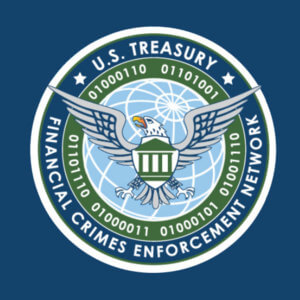 The U.S. Department of the Treasury’s Financial Crimes Enforcement Network (FinCEN) proposed a new rule to keep criminals and foreign adversaries from exploiting the U.S. financial system through investment advisers.
The U.S. Department of the Treasury’s Financial Crimes Enforcement Network (FinCEN) proposed a new rule to keep criminals and foreign adversaries from exploiting the U.S. financial system through investment advisers.
Specifically, the proposed rule would require certain investment advisers to apply Anti-Money Laundering and Countering the Financing of Terrorism (AML/CFT) requirements pursuant to the Bank Secrecy Act (BSA). This would include implementing risk-based AML/CFT programs, reporting suspicious activity to FinCEN, and fulfilling recordkeeping requirements.
Further, the rule would add investment advisers to the list of businesses classified as “financial institutions” under the BSA. Investment advisers registered with the Securities and Exchange Commission (SEC), as well as those that report to the SEC as exempt reporting advisers, would be required to implement AML/CFT programs. In addition, they would be required to file suspicious activity reports, fulfill certain recordkeeping requirements, and fulfill other obligations applicable to financial institutions subject to the BSA and FinCEN’s implementing regulations.
“Investment advisers are important gatekeepers to the American economy, overseeing the investment of tens of trillions of dollars. The current patchwork of AML/CFT requirements creates regulatory gaps that criminals and foreign adversaries exploit to launder money, hide illicit wealth, and compromise American innovation,” FinCEN Director Andrea Gacki said. “This proposed rule would level the regulatory playing field, protect U.S. economic and national security, and safeguard American businesses.”
Also, the rule would apply information-sharing provisions between and among FinCEN, law enforcement government agencies, and certain financial institutions, along with special measures that have been applied via the USA PATRIOT Act. Finally, FinCEN is proposing to delegate examination authority for this rule to the SEC given the SEC’s expertise in the regulation of investment advisers and experience in examining other financial institutions with respect to AML/CFT responsibilities.
Treasury also published its risk assessment of this sector, which identifies illicit finance threats and vulnerabilities, including how the uneven application of AML/CFT requirements allows both legitimate and illicit investors to “shop around” for an adviser who does not need to inquire into their source of wealth. Read more
CFPB Report Finds Large Banks Charge Higher Credit Card Interest Rates than Small Banks and Credit Unions
Switching to a lower rate could save the average borrower hundreds of dollars per year
 The Consumer Financial Protection Bureau (CFPB) today reported on the first set of results from the newly updated Terms of Credit Card Plans survey. The survey data reveal that large banks are offering worse credit card terms and interest rates than small banks and credit unions, regardless of credit risk. In fact, the 25 largest credit card issuers charged customers interest rates of 8 to 10 points higher than small- and medium-sized banks and credit unions. This difference can translate to $400 to $500 in additional annual interest for the average cardholder.
The Consumer Financial Protection Bureau (CFPB) today reported on the first set of results from the newly updated Terms of Credit Card Plans survey. The survey data reveal that large banks are offering worse credit card terms and interest rates than small banks and credit unions, regardless of credit risk. In fact, the 25 largest credit card issuers charged customers interest rates of 8 to 10 points higher than small- and medium-sized banks and credit unions. This difference can translate to $400 to $500 in additional annual interest for the average cardholder.
“Our analysis found that the largest credit card companies are charging substantially higher interest rates than smaller banks and credit unions,” said CFPB Director Rohit Chopra. “With over $1 trillion in credit card debt outstanding, the CFPB will be accelerating its efforts to ensure that consumers can access better rates that can save families billions of dollars per year.”
Today’s survey data include information on all general-purpose credit cards of the largest 25 credit card issuers in the United States. The data also include a representative sample of products from small- and medium-sized banks and credit unions across the country. Among some the survey’s key findings:
- Large issuers offered worse rates across credit scores: Whether a person has poor, good, or great credit, large issuers offer higher interest rates. For example, the median interest rate for people with good credit – a credit score between 620 and 719 – was 28.20% for large issuers and 18.15% for small issuers.
- Fifteen issuers reported credit cards with interest rates above 30%: Nine of the largest credit card issuers in the country reported at least one product with a maximum purchase annual percentage rate (APR) over 30%. Many of these high-cost products were private label or co-branded cards offered through retail partnerships.
- Large issuers were more likely to charge annual fees: Among large issuers’ credit cards, 27% carried an annual fee, compared to just 9.5% of small firms. The average annual fee was $157 for the largest issuers, as opposed to $94 for smaller issuers.
The newly updated Terms of Credit Card Products survey is one part of the CFPB’s efforts to increase competition throughout the credit card market. The CFPB is promoting switching through open banking, scrutinizing bait-and-switch tactics on credit card rewards, closing loopholes that allow credit card issuers to extract junk fees, and promoting credit card comparison shopping. Read more
ICYMI: Bank Regulators Say SEC Rule May Undermine Custody Banking
Courtesy of Claire Williams, American Banker
 A rare clash between President Biden’s financial regulators is unfolding over custody banking.
A rare clash between President Biden’s financial regulators is unfolding over custody banking.
In correspondence with Rep. Andy Barr, R-Ky., Federal Reserve Chair Jerome Powell and acting Comptroller of the Currency Michael Hsu expressed misgivings about the Securities and Exchange Commission’s proposed changes to its safeguarding rule — changes that would significantly broaden the rule’s scope. Critics say that it would, at minimum, upend custody banking.
Neither regulator described a close rule-making relationship with the SEC on this proposal, although they both said it would affect banks.
“The fact that the prudential regulators have confirmed that the SEC did not consult with them is alarming enough,” Barr said in an interview. “But the fact that they don’t agree, that they have concerns with what the SEC is doing is I think even more troubling. That’s what we haven’t seen before.”
Powell said in a Jan. 12 letter to Barr — responding to a Nov. 1 letter from Barr — that the SEC’s proposal, if adopted, would “require a significant change in custody practices at depository institutions.” Acting Comptroller of the Currency Michael Hsu said in a separate letter that the changes could lead to “higher client costs or more limited service.”
The pushback from the banking regulators is unusual, since regulators rarely criticize other regulators within the same administration.
Barr, the chairman of the House Financial Services Committee’s financial institutions subcommittee, is one of the most vocal critics in Congress of the SEC’s Gary Gensler, often railing against his actions at the agency in hearings, and criticizing the policymaker in public missives. On this occasion, however, several Democratic lawmakers on the House Financial Services Committee joined Barr in his November letter.
In an interview, Barr said that the comments from Hsu and Powell are “more evidence that the Gensler SEC has gone rogue and needs to be reined in.” Read more
Feb. 8, 2024: Industry and Regulation
- Banks Sue Their Regulators Over New Fair Lending Rules
- Americans Lose Billions as Expert Says Median Fraud Losses Double
- FinCEN Pressured to Implement Anti-Money-Laundering, Sanctions Whistleblower Program
- FNB to Pay $13.5M to Settle DOJ Redlining Probe
Banks Sue Their Regulators Over New Fair Lending Rules
Courtesy of Emily Peck, Axios
 A coalition of large banking and business trade groups filed suit this week against their regulators over updates to a housing law meant to promote lending to low-income Americans.
A coalition of large banking and business trade groups filed suit this week against their regulators over updates to a housing law meant to promote lending to low-income Americans.
Why it matters: Banks have gotten more aggressive in challenging Biden-era regulations and regulators.
The big picture: Typically banking trade groups have tried to avoid litigation against their key regulators — in this case, the Federal Deposit Insurance Corporation, the Office of the Comptroller of the Currency, and the Federal Reserve are defendants.
- But over the past year and a half, more than 30 companies and trade groups representing banks, funds and other firms have filed at least 15 suits against financial regulators over rules, policies and other issues, according to reporting from Reuters.
Zoom in: Filed this week in the Northern District of Texas, the case covers updates to the Community Reinvestment Act, a 1977 law that encourages banks to lend to low- and moderate-income borrowers in their communities.
- The latest update aims to bring the policy into the internet era when people use online banks that don’t necessarily have a physical presence where they live. (Go deeper.)
- The plaintiffs include the American Bankers Association, the U.S. Chamber of Commerce, the Independent Community Bankers of America and their Texas affiliates.
- They argue the changes are unlawful, go beyond the regulators’ authority, are convoluted, and could discourage lending.
What they’re saying: The banking groups say they support the goals of the CRA. “Given federal regulators’ failure to respond to public comments and fix significant flaws in this rulemaking, we were left with no choice but to reluctantly file this lawsuit,” the president of the American Banking Association said in a statement.
- The other side: “This is a short-sighted move by a relatively small but well-resourced group of banks,” said Jesse Van Tol, the president of the National Community Reinvestment Coalition, in a statement.
- In a statement last year, Lael Brainard, the director of the National Economic Council, said the updated CRA would encourage affordable housing investments around the country and promote better access to credit for underserved communities.
Americans Lose Billions as Expert Says Median Fraud Losses Double
Courtesy of Sydney Dunlap, The Hill
 Frauds and scams in the banking system cost Americans billions in 2022, experts told a Senate panel Thursday. And that number will continue to rise unless Congress makes needed updates and holds companies more accountable.
Frauds and scams in the banking system cost Americans billions in 2022, experts told a Senate panel Thursday. And that number will continue to rise unless Congress makes needed updates and holds companies more accountable.
The median amount of money individuals lost in fraud cases more than doubled from 2020 to 2022, going from $311 to $650, and the total amount of money lost increased from $3.3 billion to $8.8 billion in the same period. That’s according to John Breyault, vice president of public policy, telecommunications and fraud at the National Consumers League.
Congress “can and should” be playing a bigger role in updating laws and creating incentives for companies to prevent fraud, Breyault said.
“[Companies] bear little of the costs of fraud that occur on their systems. Instead the liability for fraud falls on those who can least afford to absorb the losses, individual consumers,” Breyault said. “No amount of voluntary consumer education, better disclosure or friction put into payment flows will solve this problem. We believe the payment platforms where fraud occurs must have a bigger financial incentive to stop scams before they happen.”
Senate Banking Committee ranking member Sen. Tim Scott (R-S.C.) advocated primarily for education. He said the current Consumer Financial Protection Bureau is too busy creating “Washington red tape” instead of “focusing on real crimes.” “Unfounded bureaucratic regulations take resources away from financial innovation and education, both of which can help lift up underserved and minority communities,” Scott said.
But committee Chair Sherrod Brown (D-Ohio) said it was time to empower the bureau and make companies more responsible for paying customers back for fraud.He said that people shouldn’t have to rely on financial education to avoid being harmed by scams.
Related Viewing: U.S. Senate Committee on Banking, Housing, and Urban Affairs Hearing: Examining Scams and Fraud in the Banking System and Their Impact on Consumers
THE COMMITTEE ON BANKING, HOUSING AND URBAN AFFAIRS will meet in OPEN SESSION, HYBRID FORMAT to conduct a hearing entitled, “Examining Scams and Fraud in the Banking System and Their Impact on Consumers.” The witnesses will be: Ms. Carla Sanchez-Adams, Senior Attorney, National Consumer Law Center; Mr. Paul Benda, EVP, Risk, Fraud & Cybersecurity, American Bankers Association; and Mr. John Breyault, Vice President of Public Policy, Telecommunications and Fraud, National Consumers League.
FinCEN Pressured to Implement Anti-Money-Laundering, Sanctions Whistleblower Program
Courtesy of Mengqi Sun, Wall Street Journal
 U.S. senators expresses concern about delay in the program’s full implementation
U.S. senators expresses concern about delay in the program’s full implementation
A bipartisan group of U.S. senators is demanding the Financial Crimes Enforcement Network explain its delay in fully implementing a whistleblower award program for reporting possible money-laundering and sanctions violations.
Sens. Chuck Grassley (R., Iowa), Elizabeth Warren (D., Mass.) and Raphael Warnock (D., Ga.) said in a letter to the anti-money-laundering bureau of the U.S. Treasury Department that they were concerned about its lack of progress in implementing the program, three years after the bill mandating it was enacted.
FinCEN’s anti-money-laundering whistleblower program was established as part of the 2021 annual defense bill. It offers rewards to people who voluntarily provide original information to the Treasury Department or the Justice Department on possible Bank Secrecy Act violations when their tips lead to enforcement actions in which monetary sanctions exceed $1 million.
The program struggled to get off the ground because its legislation provided an up to 30% cut of monetary penalties for a whistleblower but listed no minimum. The omnibus spending bill for 2023 changed that and added sanctions evasion to violations that can be reported to the FinCEN program.
The senators said that, among their concerns, FinCEN has failed to establish a dedicated, public website to receive tips and has yet to formalize rules for the whistleblower program, including the types of claims that can be reported and eligibility rules for awards. “This is unacceptable,” the senators wrote in the letter sent Friday to FinCEN’s director, Andrea Gacki.
The delay in implementing the program has been particularly acute amid recent geopolitical events, the senators suggested in the letter, as whistleblowers could be reporting violations involving authoritarian regimes, including those in Iran and Russia, as well as those associated with terrorist groups. Read more
FNB to Pay $13.5M to Settle DOJ Redlining Probe
Courtesy of Ken McCarthy, BankingDive
 The bank, between 2017 and 2021, failed to provide mortgage services to predominantly Black and Hispanic neighborhoods in Charlotte and Winston-Salem, North Carolina, the agency said.
The bank, between 2017 and 2021, failed to provide mortgage services to predominantly Black and Hispanic neighborhoods in Charlotte and Winston-Salem, North Carolina, the agency said.
Dive Brief:
- Pittsburgh-based First National Bank of Pennsylvania has agreed to pay $13.5 million to settle allegations that, between 2017 and 2021, it failed to provide mortgage services to predominantly Black and Hispanic neighborhoods in Charlotte and Winston-Salem, North Carolina, the Justice Department announced Monday.
- “When banks discriminate, it means hardworking people can’t buy a house, start a business, or invest in their futures,” North Carolina Attorney General Josh Stein said in a statement. “I want every person who calls North Carolina home to have a fair shot, and I’m pleased that this settlement will create better borrowing opportunities for all North Carolinians.”
- First National Bank spokesperson Jennifer Reel said the bank “strongly disagrees” with the DOJ’s allegations. “We cooperated fully to reach an agreement in this inherited matter as a good-faith effort to avoid prolonged litigation and to maintain our focus on promoting equity and economic prosperity,” Reel said.
Dive Insight:
The DOJ complaint alleges FNB discouraged people seeking credit in predominantly nonwhite communities from obtaining home loans and that the bank’s mortgage lending was focused disproportionately on white areas of Charlotte and Winston-Salem.
Other lenders generated applications in predominantly Black and Hispanic neighborhoods at 2½ times the rate of FNB in Charlotte and four times the rate of FNB in Winston-Salem, the DOJ said.
FNB’s branches in both cities were also “overwhelmingly” located in predominantly white neighborhoods, and the bank in 2021 shuttered its only branch in a predominantly nonwhite neighborhood of Winston-Salem. Read more
Feb. 2, 2024: Industry and Regulation
- OPINION: U.S. Bank Regulation Needs to Enter the Digital Age
- Citibank Sued for Insufficient Fraud Protection
- OCC Requests Comments on Proposed Rulemaking and Policy Statement on Bank Mergers
- FinCEN Seeks Comments on the Information to be Collected from Authorized Recipients Requesting Beneficial Ownership Information
OPINION: U.S. Bank Regulation Needs to Enter the Digital Age
Courtesy of Brooke Masters, Financial Times
 Nearly a year after Silicon Valley Bank collapsed, it is tempting to dismiss the US regional banking crisis as a very loud tempest in a relatively small teapot. After all, the damage was contained to a handful of failed lenders, the sector has stabilized and the KBW regional banks index has regained most of its losses.
Nearly a year after Silicon Valley Bank collapsed, it is tempting to dismiss the US regional banking crisis as a very loud tempest in a relatively small teapot. After all, the damage was contained to a handful of failed lenders, the sector has stabilized and the KBW regional banks index has regained most of its losses.
Such insouciance would be a mistake. The crisis should serve as a wake-up call about the unanticipated dangers linked to online banking. The industry and its watchdogs must start preparing now if they are to prevent a larger disaster in the future.
After a string of bad decisions, SVB was ultimately toppled last March by a deposit run, a problem that is as old as banking. The basic business model involves a liquidity mismatch: banks take short-term money from depositors and make long-term loans and investments. If too many customers ask for their money back at once, any bank will struggle to come up with the cash. Should depositors panic, one run can destabilise other lenders.
What has changed is the speed with which these crises spread. Back in the Depression, Franklin Roosevelt was able to halt a month-long bank run by ordering lenders to shut their doors for a four-day holiday. In 2008, Washington Mutual went down after haemorrhaging$16.7bn over nine days.
This time, SVB’s depositors pulled out $42bn in 10 hours. Another $100bn was heading out of the door when regulators shut it down. One day later, Signature bank lost 20 per cent of its deposits, and other lenders looked shaky. The US government promptly declared a systemic emergency.
The difference now is digital. Not only do fears about banks spread like wildfire on social media, but customers can move their cash by tapping an app or clicking a mouse. That danger is only going to increase as instant payment systems spread. Read more
Citibank Sued for Insufficient Fraud Protection
Courtesy of Tom Nawrocki, Payments Journal
 Citibank is contending with a lawsuit filed by the city of New York that claims it failed to protect accounts from fraudulent takeovers. Whether the suit has merit or not, the New York-based bank will now have to defend itself against a common risk item in banking.
Citibank is contending with a lawsuit filed by the city of New York that claims it failed to protect accounts from fraudulent takeovers. Whether the suit has merit or not, the New York-based bank will now have to defend itself against a common risk item in banking.
New York Attorney General Letitia James filed the suit in the Southern District of New York. “The lawsuit alleges that Citi does not implement strong online protections to stop unauthorized account takeovers, misleads account holders about their rights after their accounts are hacked and funds are stolen, and illegally denies reimbursement to victims of fraud,” James’ office said in a press release. “Defendant Citi has not deployed sufficiently robust data security measures to protect consumer financial accounts, respond appropriately to red flags, or limit theft by scam.”
According to the suit, criminals accessed victims’ accounts via social engineering and phishing tactics, eventually making large unauthorized wire transfers. Citi’s back-end fraud detection and customer authentication processes allegedly failed to catch red flags such as scammers using unrecognized devices, accessing accounts from new locations, and changing account usernames and passwords. The bank also failed to prevent the transfer of funds from multiple accounts to a single account.
“If gaps in the transaction verification and user authentication methods are in fact deemed by the court to be insufficient, Citi will definitely be on the hook for the losses,” said Javelin Strategy & Research’s Director of Fraud and Security Tracy Kitten. “Security must be ‘reasonable,’ both in what the financial institution expects the consumer to know and do and in the efficacy of the security measures it has in place to detect a possible account takeover or fraudulent transmission of funds.” Read more
OCC Requests Comments on Proposed Rulemaking and Policy Statement on Bank Mergers
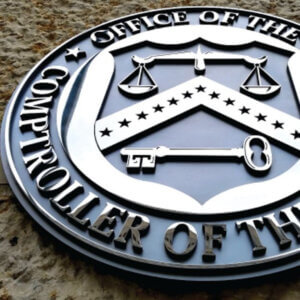 The Office of the Comptroller of the Currency (OCC) today requested comment on a proposal to update its rules for business combinations involving national banks and federal savings associations. The proposal also includes a policy statement to clarify the OCC’s review of applications under the Bank Merger Act (BMA).
The Office of the Comptroller of the Currency (OCC) today requested comment on a proposal to update its rules for business combinations involving national banks and federal savings associations. The proposal also includes a policy statement to clarify the OCC’s review of applications under the Bank Merger Act (BMA).
The proposed rulemaking is part of the OCC’s effort to enhance transparency around its process of reviewing transactions under the BMA. It would also serve to provide additional guidance to stakeholders around the OCC’s review of applications. The proposed policy statement specifically would discuss:
General principles for the OCC’s review of applications under the BMA, including indicators for applications likely consistent with approval and applications that raise supervisory or regulatory concerns;
The OCC’s consideration of the financial stability; managerial and financial resources and future prospects; and convenience and needs statutory factors under the BMA; The OCC’s decision process for extending the public comment period or holding a public meeting.
“This notice of proposed rulemaking follows the OCC’s comprehensive review of bank merger policy and regulations that included a public Symposium on Bank Mergers in February 2023,” said Acting Comptroller Michael J. Hsu. “The OCC continues to work with our interagency peers to update our analytical frameworks to best improve bank merger outcomes to benefit communities, enhance competition, and support a diverse banking system and looks forward to reviewing comments on the proposal.”
Comments from the public are due 60 days from the date of publication in the Federal Register.
Related Links
- Federal Register Notice (PDF)
- Overview of Notice of Proposed Rulemaking for Business Combinations Under the Bank Merger Act (PDF)
FinCEN Seeks Comments on the Information to be Collected from Authorized Recipients Requesting Beneficial Ownership Information
 The Financial Crimes Enforcement Network (FinCEN) is seeking comments on the information to be collected from certain authorized recipients requesting access to beneficial ownership information, consistent with the requirements of the final Access and Safeguards rule. The Corporate Transparency Act authorizes law enforcement, government agencies, and financial institutions and their regulators to obtain beneficial ownership information under certain specified circumstances for national security and law enforcement purposes.
The Financial Crimes Enforcement Network (FinCEN) is seeking comments on the information to be collected from certain authorized recipients requesting access to beneficial ownership information, consistent with the requirements of the final Access and Safeguards rule. The Corporate Transparency Act authorizes law enforcement, government agencies, and financial institutions and their regulators to obtain beneficial ownership information under certain specified circumstances for national security and law enforcement purposes.
The public has an opportunity to comment on:
- the information to be collected from certain persons requesting beneficial ownership information from FinCEN; and
- FinCEN’s estimate of the burden involved in the information collection.
Comments must be submitted by April 1, 2024.
Jan. 26, 2024: Industry and Regulation
- OPINION: Why Regulators’ Confidential Bank Ratings Should Not Be Public Information
- NCUA’s 2024 Supervisory Priorities
- Related reading: NASCUS Summary on the NCUA Letter to FCUs
- BankThink: If Bank Capital Has to Be Higher, Let’s Regulate Nonbanks
- Ransomware Attacks Spotlight Need for FIs to Gauge Third-Party Risk
OPINION: Why Regulators’ Confidential Bank Ratings Should Not Be Public Information
Courtesy of William M. Isaac, The Hill
 The failure of three multibillion-dollar regional banks in the first half of 2023 has understandably resulted in a great deal of concern and debate in Congress and among the public.
The failure of three multibillion-dollar regional banks in the first half of 2023 has understandably resulted in a great deal of concern and debate in Congress and among the public.
Those failures stemmed from the management and directors of those banks engaging in unsafe and unsound banking practices. State and federal bank regulators, while having every tool needed at their disposal, did not properly supervise those banks, in terms of promptly ordering them to cease and desist their risky activities.
One criticism of the regulators that has been leveled, however, is highly objectionable. Some argue that a sure-fire solution to the problem is to increase depositor discipline by publicly disclosing the currently confidential “CAMELS” (capital adequacy, asset quality, management, earnings, liquidity and interest-rate sensitivity) ratings issued by bank regulators.
The CAMEL rating system (the predecessor to the current CAMELS system, which added interest-rate sensitivity) was developed by the Federal Deposit Insurance Corporation, the Comptroller of the Currency and the Federal Reserve when I was chairman of the Federal Deposit Insurance Corporation.
The CAMEL system’s purpose was to provide a uniform way for the agencies to express their view of the condition of each bank based on the results of regulatory examinations. The quality of each factor in the rating system was rated 1 through 5 — with 5 being the worst — and the bank was also given a composite rating on the same scale.
A 1-rated bank has no significant issues of concern to the regulators, a 2-rated bank is considered good, a 3-rated bank has problems that need attention, a 4-rated bank has significant problems that need immediate attention and a 5-rated bank has roughly a 50-50 chance of failing and needs immediate remediation.
The regulators provide the bank and its directors with the bank’s CAMELS rating, answer any questions they might have and discuss the remediation efforts expected of the bank. The discussion is usually quite forceful for banks rated 4 or 5. In the early years of the system during the 1980s, there were some 3,000 bank and thrift failures and thousands of additional banks and thrifts rated 3 or worse on the regulators’ problem bank list. Read more
NCUA’s 2024 Supervisory Priorities
- MEMBER BENEFIT: Click here to read NASCUS’s Summary on this NCUA Letter to FCUs
Supervisory Priorities for 2024
 Credit Risk: Credit risk remains a supervisory priority for 2024. Economic conditions continue to change the credit risk environment in the credit union industry, as inflation, high interest rates and borrowing costs, declining savings levels, and the end of pandemic-era stimulus and relief programs have negatively impacted some members’ ability to repay their debts. Credit unions’ loan portfolios expanded faster during 2022 than any year within the last 30 years, while aggregate loan performance began showing signs of deterioration in 2023.
Credit Risk: Credit risk remains a supervisory priority for 2024. Economic conditions continue to change the credit risk environment in the credit union industry, as inflation, high interest rates and borrowing costs, declining savings levels, and the end of pandemic-era stimulus and relief programs have negatively impacted some members’ ability to repay their debts. Credit unions’ loan portfolios expanded faster during 2022 than any year within the last 30 years, while aggregate loan performance began showing signs of deterioration in 2023.
NCUA examiners will review existing lending programs’ soundness and credit union risk management practices, including any adjustments a credit union made to loan underwriting standards, portfolio monitoring practices, modification and workout strategies for borrowers facing financial hardships, and collection programs. Examiners will carefully consider all factors in evaluating a credit union’s efforts to provide relief for borrowers, including whether the efforts were reasonable and conducted with proper controls and management oversight. Also, examiners will review policies and procedures related to the Allowance for Credit Losses (ACL), documentation of the ACL reserve methodology, the adequacy of ACL reserves, and adherence to generally accepted accounting principles.
Liquidity Risk: Credit unions will need to maintain strong liquidity risk management in 2024, due to increased uncertainty in interest rate levels and economic conditions. Pressure in deposit pricing and the use of wholesale funding is accelerating as alternative funding options, while new lending, participations, and loan sale markets may slow. Member behaviors and risk relationships are also changing, thus requiring a greater focus on forecasting assumptions, forward-looking cash flows and risk projections. The combined effect creates liquidity challenges and increased risk to earnings and capital. Read more
BankThink: If Bank Capital Has to Be Higher, Let’s Regulate Nonbanks
Courtesy of John Heltman, American Banker
I’d like to take you back to a simpler time — to 2016.
 Back then, the Republican and Democratic primaries were both contested, and candidates were throwing policy ideas out there to see what gained traction. One of those, at least on the Democratic side, was the question of whether and how to break up the country’s largest banks. Since those banks had been a very big part of a cascading failure that had very recently pushed the country into the worst financial crisis in generations, there was some political urgency to the question of whether those institutions ought to continue to exist in their present form.
Back then, the Republican and Democratic primaries were both contested, and candidates were throwing policy ideas out there to see what gained traction. One of those, at least on the Democratic side, was the question of whether and how to break up the country’s largest banks. Since those banks had been a very big part of a cascading failure that had very recently pushed the country into the worst financial crisis in generations, there was some political urgency to the question of whether those institutions ought to continue to exist in their present form.
Into that policy scuffle stepped Neel Kashkari, the erstwhile Republican candidate for Governor of California who had recently been named President of the Federal Reserve Bank of Minneapolis. In a speech that February at the Brookings Institution, Kashkari plowed head-on into the debate, declaring that Dodd-Frank had not solved the problem of Too Big To Fail, and that policymakers should instead embrace a more radical approach that would either compel banks to break themselves up into less systemically risky pieces or become “public utilities” stuffed with, as he put it, “so much capital that they virtually can’t fail.”
That vision was ultimately consummated several months later in something called the Minneapolis Plan, which, among other things, would raise risk-weighted capital minimums for banks with more than $250 billion to 23.5% — up from the then-minimum of 13% — and require the Treasury Secretary to certify that those banks are not Too Big To Fail, raising capital beyond that minimum until they can be so certified, up to 38% risk weighted capital. Read more
Ransomware Attacks Spotlight Need for FIs to Gauge Third-Party Risk
Courtesy of PYMNTS
 The fraudsters grow ever-wilier, the attacks more brazen. And effective. A blog post this week from the Atlanta Federal Reserve noted that “at least” 60 credit unions were “knocked out of commission” by ransomware attacks towards the end of the year.
The fraudsters grow ever-wilier, the attacks more brazen. And effective. A blog post this week from the Atlanta Federal Reserve noted that “at least” 60 credit unions were “knocked out of commission” by ransomware attacks towards the end of the year.
Those CUs had all been tied to the same third-party service provider, and the impact was significant, as it kept 100,000 CU members from accessing their digital accounts. For three weeks. The attacks come against the backdrop where last year, as the Office of Financial Research found in its annual report to Congress, the percentage of financial firms affected by ransomware rose to 87% in 2023, up from 79% in 2022.
In the report “The State of Fraud and Financial Crime in the U.S.,” a collaboration between PYMNTS Intelligence and Hawk AI, we found that for U.S. banks with at least $5 billion in assets, total losses due to fraudulent transactions added up to more than $1.3 billion in 2023, nearly doubling the $767 million lost in 2022.
Impersonators Scams
Impersonator scams have been gaining ground, and bad actors can of course impersonate third-party vendors — incentivizing unwitting employees at financial institutions (FIs) to make payments to the criminals’ fraudulent accounts. Data from the Fed’s Fraud Classifier model found that authorized fraud — involving the manipulation of FIs workers — represents about 12% of fraudulent transactions, meaning that the average FI lost nearly half a million dollars due to those scams annually.
The data also show some proactivity on the part of these same FIs to use advanced technology to beat back the waves of attacks. A full two-thirds of FIs use machine learning (ML) and artificial intelligence (AI) to combat fraud, up from 34% in 2022. The decision not to use those technologies can be a costly one, as our data also found that 34% of FIs that had decided not to use AI and ML had been beset by increased fraud rates. Roughly 22% of FIs not using these technologies experienced bank tech-support impersonation scams, which gives one window into how trust in third parties can be co-opted in ways that wind up costing the FI money, and no small hit to its reputation when there’s a breach. Read more
Jan. 19, 2024: Industry and Regulation
- Banks Must Prepare for Climate Change — Regulators Finally Say How
- Community Bankers Renew Request for Congressional Probe into Credit Union-Bank Deals
- Federal Scientists Recommend Easing Restrictions on Marijuana
- Third Proposal, Not Final Action on Dodd-Frank Incentive Pay Rule May Be More Prudent
Banks Must Prepare for Climate Change — Regulators Finally Say How
Courtesy of David Sewell and Cates Saleeby, Freshfields Bruckhaus Deringer
 ESG can lead to a thicket of political controversy. But in releasing joint guidance on how banks should be addressing climate risk, the federal regulatory agencies managed to steer clear of inflammatory issues. Here’s what you need to know about the long-awaited guidance — including an outline of what the agencies expect from banks and their boards.
ESG can lead to a thicket of political controversy. But in releasing joint guidance on how banks should be addressing climate risk, the federal regulatory agencies managed to steer clear of inflammatory issues. Here’s what you need to know about the long-awaited guidance — including an outline of what the agencies expect from banks and their boards.
After a series of fits and starts, the Federal Reserve Board, the Federal Deposit Insurance Corp., and the Office of the Comptroller of the Currency issued long-awaited climate guidance on October 30, 2023.
The guidance sets forth supervisory expectations rather than prescriptive rules and is directed primarily at banking organizations with at least $100 billion in assets. But even smaller financial institutions should take note, as a signal of where supervisory questions may lead in the coming months and years.
With these “Principles for Climate-Related Financial Risk Management for Large Financial Institutions,” the banking agencies meet the stated goal of providing a “high-level framework” for understanding the effective management of climate-related financial risks.
The guidance offers enough insight that bankers wondering how to get started could use it to craft a checklist for tweaking their risk management process. They could also take some comfort in knowing that there are no surprises lurking — the guidance might be new, but the governance standards it contains are not. Here’s an overview of the basics.
Climate Risk for Banks Is Not Just About the Weather
According to the banking agencies, climate-related risks fall generally into two categories. The first, “physical risks,” refers to damage that results from specific weather events, such as hurricanes and heat waves, or “chronic shifts in climate” — changes in sea levels and average temperatures, for example.
The second, “transition risks,” refers to broader economic and financial impacts as industries, sectors, companies, and consumers shift to a “lower carbon economy.” For both categories, the principles address only financial risks related to climate change and only to the extent such risks concern banking institutions’ overall safety and soundness. Read more
Community Bankers Renew Request for Congressional Probe into Credit Union-Bank Deals
Courtesy of David Baumann, Washington Credit Union Daily
 Citing recent bank purchases by credit unions, the Independent Community Bankers of America trade group is renewing its call for congressional oversight of the purchases. “As credit union banking acquisitions continue, policymakers are responsible for investigating whether federal policy should continue to support this alarming trend,” Rebeca Romero Rainey, the ICBA’s president and CEO said last week.
Citing recent bank purchases by credit unions, the Independent Community Bankers of America trade group is renewing its call for congressional oversight of the purchases. “As credit union banking acquisitions continue, policymakers are responsible for investigating whether federal policy should continue to support this alarming trend,” Rebeca Romero Rainey, the ICBA’s president and CEO said last week.
Few policymakers have expressed a willingness to wade into the longstanding battle between banks and credit unions. However, during a November hearing featuring bank regulators, Rep. French Hill, R-Ark. asked National Credit Union Administration Chairman Todd Harper about such purchases. Harper promised to provide Hill with more details on the issue.
Romero Rainey did not get specific about which bank purchases concerned her. In recent days, Global Federal Credit Union, an Alaska financial institution, announced it will purchase First Financial Northwest Bank of Renton, Washington. In addition, Hudson Valley Credit Union in New York announced it intends to merge with Catskill Hudson Bank.
Banking trade groups have long said that credit unions are able to use their tax- exempt status to make more attractive offers to banks than other banks are able to offer. Read more
Federal Scientists Recommend Easing Restrictions on Marijuana
Courtesy of Christina Jewett and Noah Weiland, New York Times
 In newly disclosed documents, federal researchers find that cannabis may have medical uses and is less likely to cause harm than drugs like heroin. Marijuana is neither as risky nor as prone to abuse as other tightly controlled substances and has potential medical benefits, and therefore should be removed from the nation’s most restrictive category of drugs, federal scientists have concluded.
In newly disclosed documents, federal researchers find that cannabis may have medical uses and is less likely to cause harm than drugs like heroin. Marijuana is neither as risky nor as prone to abuse as other tightly controlled substances and has potential medical benefits, and therefore should be removed from the nation’s most restrictive category of drugs, federal scientists have concluded.
The recommendations are contained in a 250-page scientific review provided to Matthew Zorn, a Texas lawyer who sued Health and Human Services officials for its release and published it online on Friday night. An H.H.S. official confirmed the authenticity of the document. The records shed light for the first time on the thinking of federal health officials who are pondering a momentous change. The agencies involved have not publicly commented on their debates over what amounts to a reconsideration of marijuana at the federal level.
Since 1970, marijuana has been considered a so-called Schedule I drug, a category that also includes heroin. Schedule I drugs have no medical use and a high potential for abuse, and they carry severe criminal penalties under federal trafficking laws. The documents show that scientists at the Food and Drug Administration and the National Institute on Drug Abuse have recommended that the Drug Enforcement Administration make marijuana a Schedule III drug, alongside the likes of ketamine and testosterone, which are available by prescription.
The review by federal scientists found that even though marijuana is the most frequently abused illicit drug, “it does not produce serious outcomes compared to drugs in Schedules I or II.” Read more
Third Proposal, Not Final Action on Dodd-Frank Incentive Pay Rule May Be More Prudent, Experts Say
Courtesy of Soyoung Ho, Thomson Reuters
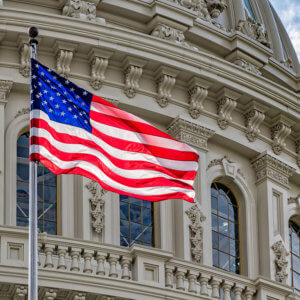 Financial regulators last year finally decided to propose once again an unfinished Dodd-Frank executive compensation rule. While some reform advocates might have been disappointed that the regulators will not be completing the dozen year-old rulemaking just yet, it may be a good move to get the public’s input before adoption.
Financial regulators last year finally decided to propose once again an unfinished Dodd-Frank executive compensation rule. While some reform advocates might have been disappointed that the regulators will not be completing the dozen year-old rulemaking just yet, it may be a good move to get the public’s input before adoption.
Regulators plan to issue a third rulemaking document on incentive-based compensation arrangements for financial institutions around the spring of 2024. Dodd-Frank, which Congress passed in 2010 in response to the 2008 financial crisis, included Section 956, which is intended to reign in reckless behavior on Wall Street caused by imprudent incentive compensation packages for bankers. And investor advocates have urged regulators over the years to adopt the rule. Sec. 956 of PL111
This is joint rulemaking by the SEC, the Treasury Department, the Federal Reserve, Comptroller of the Currency, Federal Deposit Insurance Corp., Federal Housing Finance Agency, and National Credit Union Administration (NCUA). Asked by Thomson Reuters why the regulators are not moving to finalize but instead do another proposal, SEC Chair Gary Gensler said regulators “have to get appropriate comment from the public after a certain period of time.”
“It’s often just better to repropose something, and we did that as well. When I came in ’21, there were some things that had maybe been proposed under [immediate predecessor] Chair [Jay] Clayton, and it was only a year or two years, [so] we could go to final,” Gensler told reporters on the sidelines of a conference in Washington in December 2023. “But there were some things that had been proposed maybe under Chair [Mary Jo] White, and we reproposed. So, sometimes it’s just the length of time.” Read more
Jan. 12, 2024: Industry and Regulation
- What Would It Take to Create a More Robust Secondary Market for CDFI Loans?
- Trade Group Girds For 2024 CCCA Fight
- OCC Hosts Public Appraisal Subcommittee Hearing on Appraisal Bias
- Otsuka Sworn in as 25th NCUA Board Member
What Would It Take to Create a More Robust Secondary Market for CDFI Loans?
Courtesy of Jacob Scott, Maria Carmelita Recto, and Jonathan Kivell, New York Fed
 A more robust secondary market for loans originated by Community Development Financial Institutions (CDFIs), which specialize in lending to low- and moderate-income communities, would give CDFIs greater access to capital, thus allowing them to make more loans. This is why the Community Development team at the New York Fed is researching the secondary market for loans originated by CDFIs and how that market could be expanded.
A more robust secondary market for loans originated by Community Development Financial Institutions (CDFIs), which specialize in lending to low- and moderate-income communities, would give CDFIs greater access to capital, thus allowing them to make more loans. This is why the Community Development team at the New York Fed is researching the secondary market for loans originated by CDFIs and how that market could be expanded.
There were nearly 1,500 certified CDFIs in the U.S. as of May 2023. These mission-driven financial institutions designed to promote economic revitalization and community development are a distinct category in the financial industry. Credit unions, banks, loan funds, and venture capital funds must meet a set of requirements to earn CDFI certification. That certification is granted by the CDFI Fund, a sub-agency of the U.S. Department of the Treasury. The CDFI Fund is also authorized to provide certified CDFIs with access to sources of capital that aren’t available to other financial institutions, including technical assistance grants and long-term capital at below-market rates.
But those sources of capital are limited. Aside from deposits, the top three sources of capital for CDFIs, according to a Federal Reserve Bank of Richmond survey, are income they earn from fees and interest on loans; government funding; and banks, which loan money to CDFIs to help meet the banks’ Community Reinvestment Act obligations. Those limited sources of capital are one reason why the CDFI industry is small in relation to the rest of the financial world, with roughly $450 billion in assets, a fraction of the nearly $23 trillion held by all non-CDFI U.S. banks.
Expanding CDFIs’ access to capital through the secondary market for their loan originations would allow them to increase financing for low- and moderate-income communities in rural and urban areas. Secondary market sales include selling whole loans, selling loans on a participation basis, or securitizing loans, which is when similar loans are pooled into a portfolio and then sold as tradable, interest-bearing securities. To learn what it would take to expand the secondary market for loans originated by CDFIs, we have been talking to CDFIs, institutional investors, and regulators.
Trade Group Girds For 2024 CCCA Fight
Courtesy of Lynne Marek, PaymentsDive
 The Electronic Payments Coalition is “fully funded” for the continuing fight over the proposed Credit Card Competition Act this year, said the organization’s executive chairman. The Electronic Payments Coalition, backed by big banks, is “fully funded” for the battle over the Credit Card Competition Act proposal in Congress that’s expected to persist in 2024.
The Electronic Payments Coalition is “fully funded” for the continuing fight over the proposed Credit Card Competition Act this year, said the organization’s executive chairman. The Electronic Payments Coalition, backed by big banks, is “fully funded” for the battle over the Credit Card Competition Act proposal in Congress that’s expected to persist in 2024.
That’s the word from the organization’s executive chairman, Richard Hunt, whose coalition has opposed the legislation all year. “EPC is fully funded for 2024,” he said. “We’re very anxious to defend the way America’s credit card system works,” and to avoid any “major transformational change to it,” he added.
Asked if he could share the dollar amount for that fund, Hunt said, “not a chance.” Nonetheless, he noted that million-dollar budget figures that have appeared in the media are inflated because they refer to the total spending across a range of banking issues.
Hunt’s organization has helped ensure the bill, which had bipartisan support in both the Senate and House, didn’t land on the floor of either chamber for a vote this year. “We were able to get our message out to the members of the Senate about how bad this bill really is and how this would have a tremendous effect on everyday America, across all income streams,” Hunt said.
Opponents of the legislation, including the banks as well as payments processors and credit card networks, say it would undercut the services that are offered, including the rewards programs tied to the cards. Supporters contend the new law would create much-needed competition for what they call the Visa and Mastercard duopoly that drives costs higher for merchants, and ultimately prices for consumers.
EPC’s members include JPMorgan Chase, the largest U.S. bank, Capital One, Visa and the processor TSYS, a unit of Global Payments, among others, according to the coalition’s website.
OCC Hosts Public Appraisal Subcommittee Hearing on Appraisal Bias
 The Office of the Comptroller of the Currency (OCC) will host a public hearing of the Appraisal Subcommittee (ASC) on appraisal bias on February 13, 2024, from 10:00 a.m. to 1:00 p.m., at its headquarters, 400 7th Street SW, Washington, D.C.
The Office of the Comptroller of the Currency (OCC) will host a public hearing of the Appraisal Subcommittee (ASC) on appraisal bias on February 13, 2024, from 10:00 a.m. to 1:00 p.m., at its headquarters, 400 7th Street SW, Washington, D.C.
Acting Comptroller of the Currency Michael J. Hsu will provide opening remarks. The subcommittee panel will consist of a representative from each of the five Federal Financial Institutions Examination Council (FFIEC) regulatory agencies, the U.S. Department of Housing and Urban Development and the Federal Housing Finance Agency. Witnesses will include representatives from the Appraisal Foundation, state appraiser licensing and regulatory organizations, and active appraisers.
This is the fourth hearing in a series of ASC hearings on appraisal bias and is open to the public. In-person and virtual attendees must register to attend the hearing no later than February 9. Registration for in-person attendance may close sooner if maximum capacity is reached.
The ASC oversees the real estate appraisal regulatory framework for federally related transactions. The ASC is a subcommittee of the FFIEC and provides federal oversight of state appraiser and appraisal management company regulatory programs and a monitoring framework for the Appraisal Foundation.
Related Link: Appraisal Subcommittee Hearing Registration Information
Otsuka Sworn in as 25th NCUA Board Member
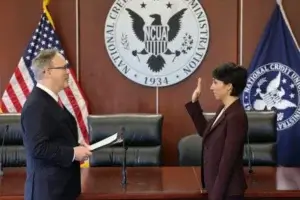 The Honorable Tanya Otsuka became the 25th Board Member of the National Credit Union Administration following a private swearing-in ceremony held at the agency’s Alexandria, Virginia, headquarters today. NCUA Chairman Todd M. Harper delivered the oath of office.
The Honorable Tanya Otsuka became the 25th Board Member of the National Credit Union Administration following a private swearing-in ceremony held at the agency’s Alexandria, Virginia, headquarters today. NCUA Chairman Todd M. Harper delivered the oath of office.
“As a career public servant, it was the honor of a lifetime to be nominated by President Biden and confirmed by the U.S. Senate for this important role,” said Board Member Otsuka following her swearing-in. “I look forward to serving with Chairman Harper and Vice Chairman Hauptman to ensure a fair, competitive, and resilient credit union system and am committed to the millions of credit union members who rely on the NCUA to safeguard their hard-earned money.”
President Joseph R. Biden announced the nomination of Otsuka on September 21, 2023. The U.S. Senate Banking, Housing, and Urban Affairs Committee held its confirmation hearing on October 19, and the Senate approved her nomination by a voice vote on December 20. Otsuka’s term on the NCUA Board will run through August 2, 2029.
Prior to serving on the NCUA Board, Otsuka served on Chairman Sherrod Brown’s staff of the Senate Banking, Housing, and Urban Affairs Committee, managing a wide range of financial services issues, including credit union policy and oversight.
Previously, she served as an attorney at the Federal Deposit Insurance Corporation (FDIC), gaining experience in supervision, enforcement, resolution, assessments, and deposit insurance. Additionally, she worked on FDIC policy actions related to the Dodd-Frank Wall Street Reform and Consumer Protection Act and the Economic Growth, Regulatory Relief, and Consumer Protection Act (S. 2155).
Board Member Otsuka earned her J.D. from Boston College Law School and B.A. with distinction from the University of Virginia.
Jan. 5, 2024: Industry and Regulation
- Banking 2030, Part 1: The New Realities of Banking
- Rescheduling Marijuana and The Next States to Legalize: 7 Predictions For 2024
- How Regions Bank Unwittingly Invited a Surge in Check Fraud
- CFPB: Holding Debt Collectors Responsible for False Statements
Banking 2030, Part 1: The New Realities of Banking
Courtesy of J.P. Mark, The Financial Brand
 Special Report: The banking sector is currently navigating a period of profound transformation. The next decade promises to bring significant changes, prompting banks to reevaluate core beliefs that have traditionally guided their operations and strategies. How banks adapt to this transformative era will be critical in shaping their future.
Special Report: The banking sector is currently navigating a period of profound transformation. The next decade promises to bring significant changes, prompting banks to reevaluate core beliefs that have traditionally guided their operations and strategies. How banks adapt to this transformative era will be critical in shaping their future.
In the first of a series, The Financial Brand examines both the industry’s near-term challenges and opportunities, and charts a roadmap for both optimism and growth as the industry pivots into a new year. As we head into 2024, the banking industry faces a hard reality: Those who cling to outdated business models may struggle to remain relevant, while those who evolve and adapt may redefine their roles in the financial ecosystem.
Let’s consider some of the industry’s long-standing tenets and assess how they align with the evolving needs and expectations of customers:
Relationships are our edge: Traditionally, the strength of client relationships was the cornerstone of a bank’s identity. Yet, in an age where AI-driven hyper-personalization is the norm, will technological systems emulate the essence of human connection? Banks must discover the right balance between automated efficiency and the irreplaceable value of human touch.
Scale and stability are our strength: Perhaps not. The emerging reality is that agility often trumps size. Dynamic fintechs, especially those forging strategic alliances, pose a significant threat to their more established but less agile counterparts. Success for banks will hinge on their ability to adapt swiftly to customer needs, regardless of their size.
Regulation is our bulwark: While regulations have traditionally acted as the industry’s protective barriers, they can also stifle adaptability. However, completely discarding regulatory frameworks risks undermining stability. Banks must play an active role in shaping policies that balance fostering innovation while maintaining prudent oversight.
We must be all things to all people: The era of banks aspiring to be universal providers of all financial services may be coming to an end. Is it feasible for banks to excel at everything for everyone? A strategic focus on specialization and building partnerships may be the key to distinctiveness in a crowded market. Read more
Read more here: Banking 2030, Part 2: The Seismic Forces Shaping the Industry
Rescheduling Marijuana and The Next States to Legalize: 7 Predictions For 2024
Courtesy of Chris Roberts, MJBizDaily
 With the cannabis industry eagerly awaiting the U.S. Drug Enforcement Administration’s latest move in the rescheduling process, the new year promises the biggest development in U.S. marijuana policy in 50 years. If the rescheduling odyssey launched by the Biden administration in October 2022 stays on track, as expected, marijuana will be moved to Schedule 3 of the Controlled Substances Act (CSA) sometime in 2024.
With the cannabis industry eagerly awaiting the U.S. Drug Enforcement Administration’s latest move in the rescheduling process, the new year promises the biggest development in U.S. marijuana policy in 50 years. If the rescheduling odyssey launched by the Biden administration in October 2022 stays on track, as expected, marijuana will be moved to Schedule 3 of the Controlled Substances Act (CSA) sometime in 2024.
Though it wouldn’t happen overnight, rescheduling would deliver tax reform, as Section 280E of the federal tax code would no longer apply. That IRS provision has hit state-legal marijuana retailers particularly hard and contributed to money woes elsewhere in the supply chain.
Fulfilling the rescheduling promise might also boost President Joe Biden’s sagging reelection hopes. But whether tax relief would arrive quickly enough for beleaguered marijuana businesses already struggling because of a variety of state-level factors – falling wholesale prices, a vibrant illicit market, etc. – is another question.
Elsewhere, there’s plenty else to keep an eye on. The next state to legalize adult-use marijuana must overcome either a court challenge or partisan deadlock. And on Capitol Hill, Congress is tasked with finally passing marijuana banking reform – which could accelerate the uplisting of cannabis stocks to major exchanges and attract more investment in an otherwise bear market.
But don’t hold your breath. Below are our cannabis industry predictions for 2024:
- The Drug Enforcement Administration will propose rescheduling marijuana.
There isn’t much to indicate the DEA will defy the Aug. 29 recommendation from the Department of Health and Human Services that marijuana be moved from Schedule 1 to Schedule 3 of the CSA. The revolutionary acknowledgement that cannabis has medical value, a determination evidently made thanks in part to data provided by the states, isn’t something DEA has the power to contradict. That would mean the ambitious administrative rescheduling review launched by the Biden Administration in October 2022 will continue, though exactly what happens next isn’t clear. Legal challenges of indeterminate length are almost certain.
How Regions Bank Unwittingly Invited a Surge in Check Fraud
Courtesy of Jordan Stutts, American Banker
 In September 2022, Regions Financial was facing fire from its regulators for the second time in seven years in connection with its overdraft fee practices.
In September 2022, Regions Financial was facing fire from its regulators for the second time in seven years in connection with its overdraft fee practices.
That same month, the Birmingham, Alabama-based bank announced the launch of Early Pay, a new service that offers access to paycheck direct deposits up to two days ahead of normal payroll disbursement.
Numerous banks have introduced similar services amid criticism that overdraft fees take advantage of a gap between when workers who live paycheck to paycheck get paid and when their bills are due — as well as amid competition from fintechs that also offer early access to paychecks.
In connection with the rollout of Early Pay, Regions updated its policies to specify that electronic direct deposits would be made available to the bank’s customers “no later than” the day they were received, according to a statement from the bank about a September 2022 update to its customer deposit agreement.
That change to the bank’s funds availability policy appears to have contributed to a surge in fraud losses last year. Between April and September, Regions reported $135 million in losses due to check fraud.
The bank “tweaked something” related to its hold limit on deposits in September 2022 “to become more customer friendly,” David Turner, the chief financial officer at Regions, explained in November at the BancAnalysts Association of Boston Conference. Read more
CFPB: Holding Debt Collectors Responsible for False Statements
Courtesy of Seth Frotman, CFPB
 Federal consumer financial protection laws require companies to treat people honestly and fairly. They also protect honest businesses from being forced to compete with those who break the law. For debt collectors, that means following the Fair Debt Collection Practices Act. The Act prohibits debt collectors from making false statements. Importantly, people can sue debt collectors who break the law by lying or providing wrong information.
Federal consumer financial protection laws require companies to treat people honestly and fairly. They also protect honest businesses from being forced to compete with those who break the law. For debt collectors, that means following the Fair Debt Collection Practices Act. The Act prohibits debt collectors from making false statements. Importantly, people can sue debt collectors who break the law by lying or providing wrong information.
The Consumer Financial Protection Bureau is the administrator and a primary enforcer of the Fair Debt Collection Practices Act. We are committed to making sure that debt collectors follow the law. For instance, debt collectors are responsible for ensuring the accuracy of information they put on credit reports. The CFPB has also confirmed on several occasions that it may violate the Fair Debt Collection Practices Act to tell consumers that they owe a debt or an amount of money that they don’t actually owe, and we recently highlighted the critical importance of this point with respect to medical debt collection. Today, the CFPB filed an amicus brief in the U.S. Court of Appeals for the First Circuit to help ensure consumers can hold debt collectors responsible when they make false representations.
In this case, an individual filed for bankruptcy, so collection efforts against the person should generally have stopped. However, a debt collector still sent the person a letter to collect on the debt and said that the consumer could be sued if they didn’t pay it. Because of the bankruptcy rules, that statement was false—the consumer couldn’t actually be sued. The individual sued to hold the debt collector accountable for the misrepresentation, but the debt collector pled ignorance. The debt collector claimed that they were only responsible under the law when they intended to say something false.
The debt collector’s argument is wrong. As our amicus brief explains, a debt collector can be liable under the Fair Debt Collection Practices Act even if they claim that they did not know that their statement was false. A debt collector will not be held responsible in a lawsuit brought by an individual if they can show that they didn’t intend to make the false representation and that they had effective procedures in place designed to prevent the mistake. But debt collectors cannot just stick their heads in the sand and claim ignorance. This interpretation has been upheld by numerous courts, and it is what Congress clearly intended. Our brief also explains that consumers generally do not lose the law’s important protections when they file for bankruptcy.
Congress made clear in the Fair Debt Collection Practices Act that debt collectors must tell the truth to consumers. It also empowered consumers to act when debt collectors break the law. We will continue working to ensure that federal consumer financial protection laws are applied as Congress intended so that companies follow the law and meet their responsibilities.
The case is Carrasquillo v. CICA Collection Agency, No. 23-1225 (1st Cir.).
Dec. 22, 2023: Industry and Regulation
- The Man at the Center of America’s Biggest Insurance Crisis
- Global Regulators Make Tackling Non-Bank Leverage a Priority For 2024
- 442 Congress Members Did NOT Join Anti-Arbitration Letter to CFPB
- ICYMI: Regulatory Pressures to Merge Intensify at Larger Banks
The Man at the Center of America’s Biggest Insurance Crisis
Courtesy of Jean Eaglesham, Wall Street Journal
 Ricardo Lara said climate change was a threat in California, then insurers fled the state
Ricardo Lara said climate change was a threat in California, then insurers fled the state
When he campaigned to be California’s insurance commissioner, Ricardo Lara warned about the risk of climate change. Insurers agreed, so they tried to jack up rates and cut back on coverage.
When Lara blocked their rate increases, insurers, including Allstate, State Farm and Farmers Insurance, stopped or restricted new home-insurance business. That put Lara in the middle of the biggest insurance crisis in the country.
“For many Californians, this is an insurance emergency,” Lara told state legislators this week.
Insurers have lost billions in California because of wildfires and other climate-related disasters. The state also has some of the strongest rules in the country that protect customers from big rate increases. The two have come into conflict, leaving homeowners in some parts of the state unable to get affordable coverage.
With his pledge to “defend all Californians from the threat of climate change” seemingly in tatters, the 49-year-old regulator is trying to make deals to bring insurers back to the state.
“This is a no-win situation—it’s a question of what Lara is willing to settle for,” said Ellen Carney, an insurance analyst at research firm Forrester Research. “I would hate to be a state regulator.”
“Making insurance more available is becoming critical for our entire economy,” Lara said at a fall press conference. He declined to comment for this article.
Lara faces a make-or-break year as he races to woo back the insurers. His approach could influence other state regulators wrestling with their own insurance no-go areas. Read more
Global Regulators Make Tackling Non-Bank Leverage a Priority For 2024
Courtesy of Huw Jones, Reuters
 Tackling hidden leverage across the multi-trillion dollar “shadow banking” sector is next year’s priority, global financial regulators said on Wednesday, but the challenge of accessing data could hamper the process.
Tackling hidden leverage across the multi-trillion dollar “shadow banking” sector is next year’s priority, global financial regulators said on Wednesday, but the challenge of accessing data could hamper the process.
The G20’s Financial Stability Board (FSB) and IOSCO, a global grouping of securities markets regulators, on Wednesday issued tougher liquidity management guidance for asset managers of open-ended investment funds, adding to existing guidance for money market funds, which FSB and IOSCO members commit to applying.
Tackling hidden leverage across the multi-trillion dollar “shadow banking” sector is next year’s priority, global financial regulators said on Wednesday, but the challenge of accessing data could hamper the process.
The G20’s Financial Stability Board (FSB) and IOSCO, a global grouping of securities markets regulators, on Wednesday issued tougher liquidity management guidance for asset managers of open-ended investment funds, adding to existing guidance for money market funds, which FSB and IOSCO members commit to applying.
“That will probably be the big attention grabber because leverage within NBFI is harder to track, it’s harder for us in the central banking community to monitor,” Schindler told Reuters.
“Leverage can go in all directions. The challenge, let us be clear, is about data,” IOSCO Chair Jean-Paul Servais added. “It (data) will be the challenge before thinking about possible policy initiatives.”
Much of the data required falls is outside the remit of securities watchdogs, but Servais said he was confident that, by working with central banks through the FSB, the data challenge can be addressed. Read more
442 Congress Members Did NOT Join Anti-Arbitration Letter to CFPB
Courtesy of Mark J. Levin & Alan S. Kaplinsky, Ballard Spahr
 Recently, 93 members of Congress (all Democrats) signed a letter in support of the pending Petition for Rulemaking filed by consumer advocacy groups in September that would prohibit pre-dispute consumer arbitration clauses and permit only post-dispute clauses. The letter argues that the proposed rulemaking is “much-needed” to protect consumers from “forced arbitration clauses in the fine print, take-it-or-leave-it terms accompanying many financial products and services.”
Recently, 93 members of Congress (all Democrats) signed a letter in support of the pending Petition for Rulemaking filed by consumer advocacy groups in September that would prohibit pre-dispute consumer arbitration clauses and permit only post-dispute clauses. The letter argues that the proposed rulemaking is “much-needed” to protect consumers from “forced arbitration clauses in the fine print, take-it-or-leave-it terms accompanying many financial products and services.”
The letter was reported in the legal media under the headline, “Nearly 100 Dems Urge CFPB To Limit Arbitration Clauses.” The real story here, however, is that the remaining 442 members of Congress (about 83%) did not join in the letter. That is hardly surprising. While the letter touts that “Congress has limited the use of forced arbitration for certain sectors and cases” such as sexual assault and harassment, it neglects to mention that some members of Congress have tried for years—without success—to pass much broader legislation (the “FAIR Act”) that would prohibit pre-dispute consumer arbitration altogether (together with arbitration of employment, antitrust and civil rights disputes). Elimination of consumer arbitration is what the Petition for Rulemaking also hopes to achieve. The 93 lawmakers who signed the letter are thus trying to accomplish indirectly—through agency overreach—what they have failed to accomplish legislatively.
The supermajority of Congressional members who did not sign the letter made the right choice. As we showed in our own comment letter to the CFPB and related podcast, there are many compelling reasons why the CFPB should deny the Petition for Rulemaking:
- the proposed rule is prohibited by the Congressional Review Act (CRA) because it is substantially the same as the final arbitration rule promulgated by the CFPB in July 2017, which Congress overrode under the CRA on November 1, 2017;
- any attempt by the CFPB to promulgate a rule under its authority to declare an act or practice as abusive would create a “major questions doctrine” issue;
- petitioners’ argument that rulemaking is necessary because consumers lack informed consent and are forced to arbitrate is based on unacceptable policy positions that create a moral hazard and run counter to bedrock contract principles and the Federal Arbitration Act; Read more
ICYMI: Regulatory Pressures to Merge Intensify at Larger Banks
Courtesy of Jim Dobbs, American Banker
 Major regional bank buyers — and sellers — could help drive a merger-and-acquisition rebound in 2024 after the fallout from soaring interest rates bogged down consolidation activity this year.
Major regional bank buyers — and sellers — could help drive a merger-and-acquisition rebound in 2024 after the fallout from soaring interest rates bogged down consolidation activity this year.
Lenders with $100 billion of assets could be interested in gaining scale amid proposed costly regulations and capital requirements. Consolidation among large banks could ignite a broader pursuit of scale across the industry, galvanizing a new round of dealmaking among community lenders and propelling stronger M&A volume after a weak run in 2023, analysts and bankers said.
“Banks need to achieve significant scale to absorb more regulatory costs and to be competitive,” Christopher McGratty, head of U.S. bank research at Keefe, Bruyette & Woods, said in an interview. “All of our work suggests more M&A is going to happen.”
At issue: U.S. bank supervisors over the summer proposed rules that would further tighten regulations for large banks in an effort to incorporate elements of the international governance framework known as Basel III. Those rules were agreed upon after the 2008 financial crisis but have taken years to roll out. The failures of several regional banks in the U.S. earlier this year jump-started the process. The changes would broadly boost the level of capital that banks with at least $100 billion of assets must maintain to guard against possible losses.
The regulatory changes would ramp up costs at a time when banks already are dealing with elevated funding expenses — deposit costs spiked along with interest rates — and are investing heavily in technology to deliver rapidly evolving online financial services. Read more
Dec. 15, 2023: Industry and Regulation
- U.S. State Attorneys General Seek Use of Federal Cudgel Against Banks
- NASCUS Summary: December NCUA Board Meeting Takeaways (story below with links)
- Five Key Takeaways from the Latest Senate Banking Hearing
- Consumer Protection News: U.S. FTC Finalizes Car-Buying Rules to Rein in Junk Fees, Bait-And-Switch
U.S. State Attorneys General Seek Use of Federal Cudgel Against Banks
Courtesy of Ari M. Selman, David I. Monteiro, Nicholas M. Gess, Allen Denson, and Allen Denson; Morgan Lewis
 The attorneys general of 20 states and territories, led by New York Attorney General Letitia James, recently sent letters to the heads of the US Consumer Financial Protection Bureau (CFPB) and US Office of the Comptroller of the Currency (OCC) requesting that the agencies partner with the states and “take appropriate action” to clarify that federally chartered institutions must cooperate with state attorneys’ general information requests, and that their failure to do so is unsafe, unsound, and may give rise to unfair or abusive acts and practices.
The attorneys general of 20 states and territories, led by New York Attorney General Letitia James, recently sent letters to the heads of the US Consumer Financial Protection Bureau (CFPB) and US Office of the Comptroller of the Currency (OCC) requesting that the agencies partner with the states and “take appropriate action” to clarify that federally chartered institutions must cooperate with state attorneys’ general information requests, and that their failure to do so is unsafe, unsound, and may give rise to unfair or abusive acts and practices.
The letters to Director Rohit Chopra and Acting Comptroller Michael J. Hsu seek to rework the framework established by the US Supreme Court’s watershed decision in Cuomo v. Clearing House Ass’n, LLC, 557 US 519 (2009). There, the Court distinguished a state sovereign’s authority to enforce its consumer protection laws against national banks through litigation from the exercise of “visitorial” safety and soundness authority, which, in the case of a national bank, is committed to the OCC and other federal banking regulators under the National Bank Act (12 USC § 484).
Following the decision in Clearing House, the passage of the Dodd-Frank Act arguably obscured the authority of state attorneys general to investigate federally chartered institutions outside of a judicial setting. This is because the Dodd-Frank Act merely established the CFPB’s authority as a floor, and not a ceiling, for preemption purposes. See 12 USC § 5551(a)(2).
That being said, OCC Bulletin 2020-43 affirmed the core distinction recognized in Clearing House, and courts have continued to apply the Clearing House standard in the rare instances it has been litigated. In practice, national banks have, in the nearly 15 years since Clearing House, engaged in a careful balance when faced with state attorney general investigations, considering the risk that the agency will publicly file an enforcement action and seek discovery and the burden associated with voluntary compliance with an investigative demand.
Despite this history, in their December 6 letters the state attorneys general now assert that, in recent years, national banks have “effectively stonewalled State Attorney General investigations” by asserting preemption under the National Bank Act. Read more
NASCUS Summary: December NCUA Board Meeting Takeaways
By Sarah Stevenson, NASCUS, Vice President, Regulatory Affairs
 The NCUA Board held its final meeting for 2023. There were several matters presented to the Board for consideration and approval.
The NCUA Board held its final meeting for 2023. There were several matters presented to the Board for consideration and approval.
NCUA Operating Fee Methodology
The first item presented was a request for Board approval on the NCUA Operating Fee Methodology. The notice includes a response to public comments received on the Operating Fee methodology and threshold exemption. The threshold for exemption of paying an operating fee for federal credit unions would increase from $1 million to $2 million and would align with asset growth. This adjustment would also allow for annual inflationary adjustments to the threshold in the future and whether the Board should modify the current three-tier Operating Fee Schedule. The Board indicated this would not decrease the amount of fees collected from federal credit unions. The Board unanimously approved the request.
NCUA’s 2024-2025 Budget
The second item presented to the Board for approval is the agency’s 2024-2025 Budget. Changes from the initial proposed budget included:
An additional $5.3 million in expected surplus is now projected for 2023, for a total of $23.3 million in carryforward funding in the operating budget. This amount has been used to lower the overall level of the new operating budget funding for 2024.
- The budget for agency travel expenses was reduced by $2 million, reflecting expectations for some examination work to continue to be conducted off-site by NCUA examiners and other efficiencies gained through remote work.
- One position requested for the Office of Ethics Counsel was eliminated.
- The recommended final budget eliminates two new positions and related funding requested to establish a new Office of the Executive Secretary.
- One new position was added to the Office of External Affairs and Communications to lead the implementation of the 21st Century Integrated Digital Experience Act and other newly established requirements for federal government websites. The new writer-editor position proposed in the Office of External Affairs and Communications staff draft was eliminated.
- Funding for one position in the Office of Human Resources that is authorized within the NCUA staffing plan but currently unfunded was moved from 2024 to 2025.
- One new position was added to the Office of the Chief Information Officer to reflect information security management needs. The recommended final budget eliminates funding proposed in the staff draft for one position in the Office of the Chief Information Officer that is authorized within the NCUA staffing plan but currently unfunded.
- One new position for the Office of the Ombudsman was moved from 2024 to 2025.
- Four additional examiner positions, for a total of nine, including the five additional positions proposed in the staff draft, were added to the regions to reflect updates to the NCUA’s examination and supervision program needs for 2024.
- Additional budget amounts for 2024, totaling $0.1 million net, were added to several offices primarily because of revised estimates for various contract support costs. Additional immaterial adjustments were made to funding levels in the staff draft for technical corrections and to reflect updated information that was not available when the draft was published.
The recommended final 2024 capital budget was approximately $1.2 million lower than the staff draft. The recommended final 2025 capital budget is unchanged from the staff draft. The recommended final 2024 and 2025 Share Insurance Fund administrative expenses budgets are higher than the staff draft by $6,000 and $131,000 due to re-estimated administrative expenses. The Board also voted to approve the budget with amendments.
Request for Comment, NCUA Overhead Transfer Rate (OTR) Methodology
The Board also approved a request for comment regarding the OTR Methodology. In 2016 and 2017, the NCUA published requests for comment regarding a revised OTR methodology to simplify the methodology and reduce the resources needed to administer the OTR. The latest request for comment clarifies the four principles for calculating the OTR and the various cost allocations associated with the calculation. The request for comment provides an alternative means for further transparency on the OTR. It welcomes comments on aspects of the OTR methodology, the four principles, the added detail provided, clarifying statements, and the suggested alternatives for achieving further transparency. The request for comment also requests input on continuing to seek comment through the federal register or adding the OTR methodology to the annual one-third of regulations review. Comments will be due within 60 days upon publication in the Federal Register.
- Press Release: Board Approves NCUA 2024–2025 and Central Liquidity Facility Budgets
- Click here to view all Board Member statements
Five Key Takeaways from the Latest Senate Banking Hearing
Courtesy of Steve Cocheo, The Financial Brand
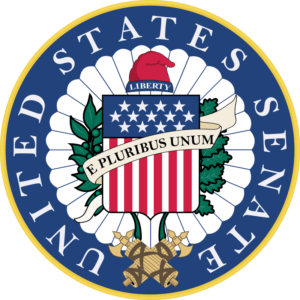 Capital standards, privatizing the FDIC, killing cryptocurrency, avoiding ‘branch deserts,’ and staying out of politics and ‘culture wars’ were all on the Senate Banking Committee’s agenda when eight big banks hit Capitol Hill. You can probably count on one hand how many times Elizabeth Warren, U.S. senator from Massachusetts, has agreed with Jamie Dimon, chairman and CEO at JPMorgan Chase.
Capital standards, privatizing the FDIC, killing cryptocurrency, avoiding ‘branch deserts,’ and staying out of politics and ‘culture wars’ were all on the Senate Banking Committee’s agenda when eight big banks hit Capitol Hill. You can probably count on one hand how many times Elizabeth Warren, U.S. senator from Massachusetts, has agreed with Jamie Dimon, chairman and CEO at JPMorgan Chase.
During a mid-2021 hearing of the Senate Banking Committee, Warren called Dimon “the star of the overdraft show. Your bank collects more than seven times as much money in overdraft fees per account than your competitors.” After talking over Dimon’s attempts to respond, Warren finally demanded, “Mr. Dimon, will you commit right now to refund the $1.5 billion [in overdraft fees] you took from customers during the pandemic?”
The response of the largest U.S. bank was unambiguous: “No.”
But during early December 2023 hearings that brought top officials of the eight largest U.S. banks before the committee, Warren was on a different mission. She wants to kill the cryptocurrency business. The Massachusetts senator was hunting for allies. First, she looked at Brian Moynihan, chairman and CEO at Bank of America, and asked him if his institution has systems in place to flag terrorist financing so it can be reported to law enforcement and shut down. “Yes, we do,” he answered.
She then asked Dimon the same question. “We have extensive systems in place — but no system is foolproof,” he said. Warren asked for a show of hands from the banker panel and every one of the eight has anti-money-laundering and anti-terrorist financing programs in place — as you’d expect. Warren was making a point.
“Today’s terrorists have a new way to get around the Bank Secrecy Act: cryptocurrency,” said Warren. “Last year, an estimated $20 billion in illicit crypto transactions funded every kind of dangerous criminal. North Korea has funded at least half its missile program, including nuclear weapons, using the proceeds of crypto crime. And Israeli officials have confirmed that Hamas received millions of dollars through crypto transactions, including large sums from Iran.” She asked Dimon how that could be. He explained that he’s long been opposed to cryptocurrency, especially given that many of the reasons it is used are illegitimate.
“If I was the government,” said Dimon of crypto, “I’d shut it down.” Read more
Consumer Protection News: U.S. FTC Finalizes Car-Buying Rules to Rein in Junk Fees, Bait-And-Switch
Courtesy of Diane Bartz and David Shepardson, Reuters
 Auto dealers will be barred from luring vehicle buyers with promises they do not keep and will not be able to charge junk fees – like a service contract for an oil change for an electric vehicle – under a new rule, the U.S. Federal Trade Commission said on Tuesday.
Auto dealers will be barred from luring vehicle buyers with promises they do not keep and will not be able to charge junk fees – like a service contract for an oil change for an electric vehicle – under a new rule, the U.S. Federal Trade Commission said on Tuesday.
The rule could fundamentally change how millions of Americans buy vehicles annually by requiring up-front pricing in dealers’ advertising and sales discussions, and bars the sale of add-on products or services that confer no benefit to consumers.
The FTC, in a rule finalized on Tuesday that was first announced in 2022, said it had been concerned about dealers that allegedly targeted young men and women in the military.
“By the age of 24, around 20% of young servicemembers have at least $20,000 in auto debt,” the agency said in a statement which said that the rule “prohibits dealers from lying to servicemembers and other consumers about important cost and financing information.”
Consumer Reports said the FTC proposal would bar “shady tactics” by car dealers that can boost the cost of new vehicles.
Sam Levine, director of the FTC’s Bureau of Consumer Protection, said that consumers often begin car shopping by comparing prices before going to a dealer.
“The reality is once you actually get to the dealership, you find the car, you find the model you like, it’s in stock, and you get closer to the end of the transaction, you realize that the price that’s been advertised is not actually the price that you can drive away with the car with,” he said. Read more
Dec. 8, 2023: Industry and Regulation
- Congressional Actions Necessary to Stop Imitation Banks: Report
- Bank CEOs Warn About a Looming Recession
- ‘Clear Rules of the Road’ Needed, Trades Ask Biden for Help with CFPB
- Discover, Facing Regulatory Scrutiny, to Exit Student Lending
Congressional Actions Necessary to Stop Imitation Banks: Report
Courtesy of Ebrima Santos Sanneh, American Banker
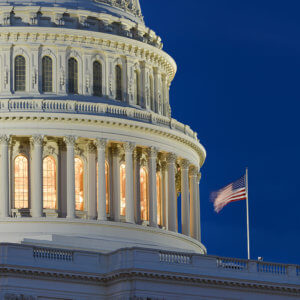 A new report by the Roosevelt Institute notes a comprehensive coordinated regulatory approach could currently mitigate some risks posed by imitation banks, but that ultimately Congress needs to make three targeted changes to effectively protect consumers and the financial system.
A new report by the Roosevelt Institute notes a comprehensive coordinated regulatory approach could currently mitigate some risks posed by imitation banks, but that ultimately Congress needs to make three targeted changes to effectively protect consumers and the financial system.
The report, obtained by American Banker and authored by former FDIC attorney Todd Phillips, says Imitation banks — a category of online shadow banks — mimic traditional depository institutions, offering high returns on what appear to be deposit accounts while circumventing banking laws and regulation. Phillips says this can mislead consumers, who may mistake them for secure, regulated institutions due to the similarity of their digital interfaces to banking apps, potentially putting their funds at risk.
“[Imitation banks] make specious promises of high returns to gain ground with consumers who may have been historically locked out of more traditional wealth-building opportunities, [and] they’re doing so without the necessary government oversight and accountability mechanisms,” he writes. “Regulators and Congress must act to address these harms.”
The paper identifies four examples of imitation banks — including Compound Real Estate, Tellus, Zera Financial, and Confetti — each employ different strategies, but share the trait of misrepresenting themselves and imitating traditional banking services.
Phillips notes that while current law says demand notes sold to the public must be registered as securities with the SEC, only Compound — formerly Compound Banc — is registered with the SEC. He says the SEC has also alleged that such deposit-like accounts are notes requiring disclosure, but these imitation banks have nonetheless escaped regulatory action.
“It is unclear how Tellus, Zera, and other imitation banks have thus far avoided registering and providing SEC-required disclosures,” he wrote. Read more
Bank CEOs Warn About a Looming Recession
Courtesy of Elisabeth Buchwald, CNN
 What we covered here
What we covered here
- The Senate Banking Committee held its annual hearing on Wall Street oversight on Wednesday.
- Lawmakers heard testimony from JPMorgan CEO Jamie Dimon, Citi CEO Jane Fraser and Bank of America CEO Brian Moynihan, in addition to the CEOs of Wells Fargo, State Street, BNY Mellon, Goldman Sachs and Morgan Stanley.
Usually when lawmakers have the opportunity to question the nation’s top banking CEOs under oath there’s no shortage of fiery exchanges.
Today’s hearing was a big outlier.
That was especially evident when Democratic Sen. Elizabeth Warren, a fierce critic of Wall Street, got all eight CEOs to agree with her that cryptocurrency platforms should have to adhere to the same anti-money-laundering rules as banks.
While bank CEOs have already been very vocal about their opposition to a series of new regulations that could go into effect in the coming years, the hearing served as a platform for them to persuade more lawmakers who may be on the fence.
The proposed regulation, known as Basel III Endgame, would force banks to set aside more funds to cushion against potential future losses. The eight bank CEOs testifying on Wednesday told lawmakers they would not encounter any issues meeting the new requirements. At the same time, they said it would harm consumers and businesses because banks would not have as much funds available to lend out, which would result in them having to charge higher interest rates.
In addition, the bank leaders said it would negatively impact first-time homebuyers and people saving for retirement.
Democratic senators Sherrod Brown and John Fetterman were the only lawmakers at Wednesday’s hearing who pushed back against the CEOs’ claims they have sufficient guardrails in place to shield them from a bank failure and that forcing them to hold more capital would harm the economy.
All the other senators at Wednesday’s hearing either agreed with the bank CEOs’ claims about the impact of Basel III or did not bring it up.
Few bank CEOs were asked to share their assessments of how the US economy is faring, something that typically comes up at these hearings, given how much information banks have on the health of consumers based on their account and transaction data.
‘Clear Rules of the Road’ Needed, Trades Ask Biden for Help with CFPB
Courtesy of Michael Ogden, Credit Union Times
 NAFCU, CUNA and others write to President Biden in an effort to rein in the CFPB’s creative rulemaking processes.
NAFCU, CUNA and others write to President Biden in an effort to rein in the CFPB’s creative rulemaking processes.
Nine financial trade groups, including NAFCU and CUNA, co-authored a letter to President Joe Biden asking for his “support in our quest for clear rules of the road in the financial services industry that take into account both the benefits and costs of regulations.”
Monday’s three-page letter focused on the group’s collective frustration at the CFPB and the chaotic regulatory world the Bureau has created for financial organizations.
“Markets work best when the rules are clear, so it is possible to comply with them,” the groups wrote. “Blog posts that contradict law or regulation, vague guidance that deems common practices like using form contracts or including certain terms and conditions in contracts as alleged violations of law, proclamations of the CFPB’s novel interpretation of law via amicus briefs, or enforcement actions that contradict state law, are not setting clear expectations that it is possible to follow.”
The letter continued, “Moreover, in some instances, guidance has imposed new substantive obligations on affected parties without going through the notice-and-comment process; in these instances, such guidance is not truly ‘guidance,’ but instead operates as a substantive rule.”
The letter to President Biden came on the heels of Friday’s vote by the House of Representatives to halt the implementation of the CFPB’s section 1071 rule. The Senate similarly passed a resolution in October to stop the rule. The rule, which was finalized in March, would require credit unions to collect data on applications for credit for minority-owned, women-owned and small businesses. Credit union trade groups have been against any such rule.
Part of the argument to stop the rule, among several other proposed rules coming from the CFPB this year, has been the non-traditional ways the CFPB has tried to implement new regulations. The nine organizations writing President Biden want these inconsistent rulemaking processes to stop. Read more
Discover, Facing Regulatory Scrutiny, to Exit Student Lending
Courtesy of Polo Rocha, American Banker
 Discover Financial Services is exiting the student loan business after close to a decade of regulatory headaches stemming from improper loan servicing.
Discover Financial Services is exiting the student loan business after close to a decade of regulatory headaches stemming from improper loan servicing.
Regulatory flubs in student lending and elsewhere at the Illinois-based credit card giant preceded the ouster of longtime CEO Roger Hochschild in August. Discover got hit with a consent order in September over consumer protection compliance.
The company’s student loan portfolio, which was the subject of consent orders in 2015 and 2020, is now being floated for a sale to another institution. Discover said Wednesday that its board of directors authorized executives to explore a sale of the $10 billion loan portfolio, as well as the transfer of servicing responsibilities to another party.
Discover also plans to stop accepting new student loan applications starting in February.
“During a recent review, the Board determined that exploring the sale and transfer of servicing of Discover’s student loans is aligned with those priorities, better enabling Discover to focus on our core banking products, capitalize on our growth opportunities and deliver long-term shareholder value,” John Owen, Discover’s interim CEO and president, said in a news release.
The $143 billion-asset company is “committed to a path forward that enables a seamless transition for our customers as they advance their education and financial goals,” Owen said. The company’s stock jumped more than 4% the day after the news. Read more
Dec. 1, 2023: Industry and Regulation
- Proposal Blurs Line Between Boards and Management, Critics Say
- House Republicans Bluntly Voicing Their Contempt for CFPB
- Framework For Open Banking Among CUs?
- First OCC Fintech Chief Had Phony Resume: Reports
Proposal Blurs Line Between Boards and Management, Critics Say
Courtesy of Kiah Lau Haslett, Bank Director
 Congress began grilling the head of the Federal Deposit Insurance Corp. last week about alleged workplace culture issues and harassment at the federal agency, putting the agency in an awkward spot just as it tries to ramp up scrutiny of bank corporate governance.
Congress began grilling the head of the Federal Deposit Insurance Corp. last week about alleged workplace culture issues and harassment at the federal agency, putting the agency in an awkward spot just as it tries to ramp up scrutiny of bank corporate governance.
Bank observers are worried that new corporate governance guidelines from the FDIC could create unintended consequences for boards of directors, blurring the line between board oversight and management.
The proposed guidelines would apply to about 60 institutions above $10 billion in assets that are state chartered but not members of the Federal Reserve, state-licensed insured branches of foreign banks, and state savings associations, according to an estimate from lawyers at Mayer Brown. It would establish standards “that encourage an active and involved” board to “protect” the bank and “oversee and confirm” that it operates in a safe and sound manner. The proposal states that a “board should establish” an effective risk management program and communicate its risk appetite and policies, identify breaches of policies and procedures and establish consequences for these breaches. As an enforceable guideline, the FDIC could take formal action against institutions that fail to submit or implement acceptable plans.
“The proposed guidelines would clarify the FDIC’s expectation that corporate governance and risk management frameworks need to evolve along with growth, complexity and changing business models and risk profiles of larger [insured depository institutions],” said FDIC Chairman Martin Gruenberg in a statement announcing his support for the proposal. “[T]he experience of the three large [bank] failures this spring should focus our attention on the need for meaningful action to improve the corporate governance and risk management processes of large IDIs under the Federal Deposit Insurance Act.”
But the proposal doesn’t have universal support among the FDIC’s board. Director Jonathan McKernan dissented at the Oct. 3 meeting where the policy was revealed and told Bank Director he hopes institutions both above and below $10 billion in assets submit comment letters sharing their perspectives and concerns with the FDIC.
“This guidance would increase the expectations, and impose new expectations, on boards,” he says in an interview. “It would go so far as to conflate the roles of board and management, and those are important distinctions to maintain. We can’t have the board and directors trying to act as managers.”
Meg Tahyar, a partner and head of the financial institutions practice at the law firm Davis Polk, says the proposal “sounds like a good idea” in theory, but has issues in its execution. Read more
House Republicans Bluntly Voicing Their Contempt for CFPB
Courtesy of David Baumann, CUCollaborate
GOP members take aim at agency at house hearing.
 House Republicans are expressing their disdain for the CFPB and its mission this week, as the Financial Services Committee grilled agency Director Rohit Chopra on Wednesday and GOP members prepared to try and nullify one of the bureau’s key rules.
House Republicans are expressing their disdain for the CFPB and its mission this week, as the Financial Services Committee grilled agency Director Rohit Chopra on Wednesday and GOP members prepared to try and nullify one of the bureau’s key rules.
“Congress is going to send you a very clear message,” Rep. Frank Lucas, R-Ok., told Chopra during the Financial Services Committee hearing.
Republicans have been blunt in their opposition to many of the policies being implemented by the CFPB, which they view as an out-of-control, unaccountable agency.
The House later this week is scheduled to consider S. J. Res. 32, a resolution that would void the CFPB’s rule requiring financial institutions to report their lending to women- and minority-owned businesses.
House Hearing
As the House hearing began, a key Republican set the tone for GOP opposition.
“The ongoing barrage of press releases from the CFPB is misleading at best. They all too often paint with a broad brush to vilify entire sectors of the financial services industry, and even the U.S. financial system as a whole—rather than targeting bad actors,” House Financial Services Chairman Rep. Patrick McHenry, R-N.C., said, as the hearing began.
He continued, “To make matters worse, where the Biden Administration doesn’t have the authority or votes in Congress to make a change, the CFPB under your leadership simply forges ahead, unchecked.”
Financial Services Committee ranking Democrat Rep. Maxine Waters of California came to Chopra’s defense.
“It is no mystery why the CFPB has such broad bipartisan support,” she said. “It has cracked down on financial institutions that repeatedly engage in abusive practices, held lenders accountable for discriminating against borrowers, taken action to remove medical debt from credit reports, eliminated junk fees, increased access to capital for small businesses – particularly businesses of color, and more.”
Chopra defended his agency, saying that the CFPB is attempting to foster competition in financial services by ensuring consumers have the information they need to make informed decisions. Read more
Framework For Open Banking Among CUs?
Courtesy of Ray Birch, CUToday.info
 A fintech has applied for a charter with NCUA to form a new credit union that will be based on open banking and distributed ledger technology, claiming the move will drive open banking within credit unions.
A fintech has applied for a charter with NCUA to form a new credit union that will be based on open banking and distributed ledger technology, claiming the move will drive open banking within credit unions.
Called Defy FCU—a play on “defi,” the abbreviation for “decentralized finance—the charter application is in its initial stages, reported John Wingate, president and CEO of BankSocial, whose parent company, Fivancial, is the proposed CU’s sponsor.
Wingate emphasized a goal of the new cooperative is to establish a framework and template to make it easy to launch credit unions that are part of the Web3 community.
Web3 is a term used to describe the next iteration of the Internet, one that is built on blockchain technology and is communally controlled by its users.
As CUToday.info has reported, BankSocial is a crypto services platform being used by a growing number of credit unions that offers a self-custody crypto wallet, where the individual owns their own cryptocurrency and their keys. Wingate described BankSocial as an “opening banking platform that provides access to the latest technologies to credit unions to set them up for the next 10-15 years of the evolving financial landscape.”
Discussions Held With Agency
“Our main goal is to create a template with the NCUA, and we’ve already discussed all this with them, so we can spin up new credit unions based on this Web3 model,” Wingate told CUToday.info. “We can spin up new credit unions in a fraction of the time with the template. Our main goal is to create more credit unions that are part of the Web3 community.”
Wingate said NCUA has approved the CU’s primary field of membership. In an email, the agency told CUToday.info the credit union’s organizers have “applied for a charter and the application is in the beginning phase of the application process.”
Wingate explained the field of membership is BlockAdvocates, a 501(c)(3) focused on education and activism and the Web3 space.
“It is a 100% virtual field of membership composed of people who are passionate about spreading awareness of distributed ledger and blockchain technologies in the traditional finance world, basically people interested in marrying traditional finance and DeFi,” said Wingate. “We’ve also extended the field of membership to the Texas Blockchain Council, which almost quadruples our initial access. It’s a nationwide field of membership, and to be a member of BlockAdvocates you have to care about the Web3 space and have an interest in financial institution.” Read more
First OCC Fintech Chief Had Phony Resume: Reports
Courtesy of Gabrielle Saulsbery, Banking Dive
 Prashant Bhardwaj alleged he held positions at Huntington and Fifth Third — and at Citi at a time when he would have been 13, according to a resume The Information obtained through FOIA.
Prashant Bhardwaj alleged he held positions at Huntington and Fifth Third — and at Citi at a time when he would have been 13, according to a resume The Information obtained through FOIA.
The departure of the Office of the Comptroller of the Currency’s first-ever chief financial technology officer may have resulted from several alleged lies on his resume, The Information and Fintech Business Weekly reported Friday.
When the OCC hired Prashant Bhardwaj to lead its new fintech office in March, it credited his “nearly 30 years of experience serving in a variety of roles across the financial sector” and his education, including a master’s degree in business administration from the International Management Institute in Brussels.
Bhardwaj, however, did not hold several of the roles his resume purported him to have held, the publications reported; and “nearly 30 years of experience” means he would have started in the financial sector as a young teenager.
Additionally, the IMI in Brussels was banned from offering MBA degrees in the years following Bhardwaj’s alleged attendance there, Fintech Business Weekly reported. An IMI representative told the publication it needed an advanced payment of €350 to confirm Bhardwaj’s attendance.
On his resume, which The Information received through a Freedom of Information Act request, “Bhardwaj claimed he was the chief information officer at Ohio-based Fifth Third Bank between 2006 and 2010, a role that reported to the chief financial officer and oversaw a $330 million budget,” according to The Information reporter Michael Roddan. “The bank — one of the largest consumer banks in the midwest — never employed Bhardwaj, a spokesperson said.”
“He also claimed to have held the role of chief information officer and digital transformation officer at Ohio-based Huntington Bank from 2010 to 2015, reporting to the CEO and the board and managing a $250 million budget while overseeing a team of more than 500 employees,” Roddan wrote. “However, the position of chief information officer was held by other people during that time period. One of the men who held the role said he had never heard of Bhardwaj. Huntington declined to comment.”
Bhardwaj also claimed that he was a director of information technology at Citi from 1994 and 2000. The Information reported that Citi has no record of his employment. Fintech Business Weekly reported that Bhardwaj is 42 years old, meaning he would have been 13 in 1994.
An OCC spokesperson told Banking Dive the agency does not comment on “personnel matters.”
Nov. 10, 2023: Industry and Regulation
- How Do Banks Lend in Inaccurate Flood Zones in the Fed’s Second District?
- Agencies Announce Dollar Thresholds for Smaller Loan Exemption From Appraisal Requirements for Higher-Priced Mortgage Loans
- U.S. Senate Committee on Banking, Housing, and Urban Affairs Hearing: Oversight of Financial Regulators: Protecting Main Street Not Wall Street
- U.S. House of Representatives Committee on Financial Services Hearing: Oversight of Prudential Regulators
How Do Banks Lend in Inaccurate Flood Zones in the Fed’s Second District?
 Courtesy of Kristian S. Blickle, Katherine Engelman, Theo Linnemann, and João A. C. Santos, Liberty Street Economics
Courtesy of Kristian S. Blickle, Katherine Engelman, Theo Linnemann, and João A. C. Santos, Liberty Street Economics
In our previous post, we identified the degree to which flood maps in the Federal Reserve’s Second District are inaccurate. In this post, we use our data on the accuracy of flood maps to examine how banks lend in “inaccurately mapped” areas, again focusing on the Second District in particular. We find that banks are seemingly aware of poor-quality flood maps and are generally less likely to lend in such regions, thereby demonstrating a degree of flood risk management or risk aversion. This propensity to avoid lending in inaccurately mapped areas can be seen in jumbo as well as non-jumbo loans, once we account for a series of confounding effects. The results for the Second District largely mirror those for the rest of the nation, with inaccuracies leading to similar reductions in lending, especially among non-jumbo loans.
Inaccurate Flood Maps
As manager of the National Flood Insurance Program (NFIP), the Federal Emergency Management Agency (FEMA) works with communities to draw maps that denote the risk of a catastrophic flood occurring at least once in 100 years. Areas that are at risk of such flooding are considered to have a 1 percent (or more) annual flood risk. An important implication of being in a flood zone is the insurance requirement for mortgage borrowers. Specifically, any mortgage applicant in a flood zone whose mortgage meets certain criteria—such as being eligible for securitization or being made by a financial institution—must buy flood insurance. The program—as well as the implications for the mortgage market—are discussed in previous Liberty Street Economics posts in this series (see here or here).
In our previous post, we discussed the fact that certain flood maps may be inaccurate. These inaccuracies arise partly because it takes time to update the maps in the face of climate change, and partly because of improvements and other changes made to local infrastructure and building materials that take time to be reflected in official flood maps. We use property-level information on flood damage exposure from CoreLogic as well as digitized flood maps for 2022 to define inaccuracies (as described in our previous post).
Maps can be inaccurate in one of two ways: either they designate too much of an area as being a “flood risk,” or they designate too little. For the purposes of this post, we focus only on the latter issue and define two categories of inaccuracy. If a property faces significant flooding damage (highest damage quartile) but is not “mapped” into a flood zone, its map is “very inaccurate.” If a property faces moderate damage but is not covered by a flood zone, its map is simply “inaccurate.” All other properties are either accurately mapped or correctly excluded from a flood map because they face no flood risk. Read more
Agencies Announce Dollar Thresholds for Smaller Loan Exemption From Appraisal Requirements for Higher-Priced Mortgage Loans
Federal Reserve Board, Office of the Comptroller of the Currency , and Consumer Financial Protection Bureau
 The Consumer Financial Protection Bureau, the Federal Reserve Board, and the Office of the Comptroller of the Currency announced that the 2024 threshold for whether higher-priced mortgage loans are subject to special appraisal requirements will increase from $31,000 to $32,400.
The Consumer Financial Protection Bureau, the Federal Reserve Board, and the Office of the Comptroller of the Currency announced that the 2024 threshold for whether higher-priced mortgage loans are subject to special appraisal requirements will increase from $31,000 to $32,400.
The threshold amount will be effective January 1, 2024, and is based on the annual percentage increase in the Consumer Price Index for Urban Wage Earners and Clerical Workers, known as CPI-W, as of June 1, 2023.
The Dodd-Frank Act added special appraisal requirements for higher-priced mortgage loans, including that creditors obtain a written appraisal based on a physical visit to the interior of the home before making a higher-priced mortgage loan. The rules implementing these requirements contain an exemption for loans of $25,000 or less, adjusted annually to reflect CPI-W increases.
Federal Register notice: Appraisals for Higher-Priced Mortgage Loans Exemption Threshold (PDF)
U.S. Senate Committee on Banking, Housing, and Urban Affairs Hearing: Oversight of Financial Regulators: Protecting Main Street Not Wall Street
 The U.S. Senate Committee on Banking, Housing and Urban Affairs held a hearing entitled, “Oversight of Financial Regulators: Protecting Main Street Not Wall Street.” The witnesses included: The Honorable Michael Barr, Vice Chair for Supervision, Federal Reserve; The Honorable Martin Gruenberg, Chair, Federal Deposit Insurance Corporation; The Honorable Todd Harper, Chair, National Credit Union Administration; and Mr. Michael Hsu, Acting Comptroller, Office of the Comptroller of the Currency.
The U.S. Senate Committee on Banking, Housing and Urban Affairs held a hearing entitled, “Oversight of Financial Regulators: Protecting Main Street Not Wall Street.” The witnesses included: The Honorable Michael Barr, Vice Chair for Supervision, Federal Reserve; The Honorable Martin Gruenberg, Chair, Federal Deposit Insurance Corporation; The Honorable Todd Harper, Chair, National Credit Union Administration; and Mr. Michael Hsu, Acting Comptroller, Office of the Comptroller of the Currency.
- Hearing
- Committee Chair Brown Statement
- Federal Reserve Vice Chair Barr Testimony
- FDIC Chair Gruenberg Testimony
- NCUA Chair Harper Testimony
- Acting Comptroller Hsu Testimony
U.S. House of Representatives Committee on Financial Services Hearing: Oversight of Prudential Regulators
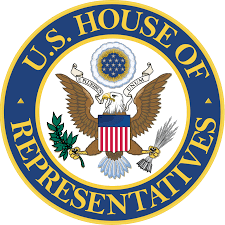 The U.S. House Committee on Financial Services held a hearing entitled, “Oversight of Prudential Regulators.” The Committee heard testimony from: The Honorable Michael Barr, Vice Chair for Supervision, Federal Reserve; The Honorable Martin Gruenberg, Chair, Federal Deposit Insurance Corporation; The Honorable Todd Harper, Chair, National Credit Union Administration; and Mr. Michael Hsu, Acting Comptroller, Office of the Comptroller of the Currency.
The U.S. House Committee on Financial Services held a hearing entitled, “Oversight of Prudential Regulators.” The Committee heard testimony from: The Honorable Michael Barr, Vice Chair for Supervision, Federal Reserve; The Honorable Martin Gruenberg, Chair, Federal Deposit Insurance Corporation; The Honorable Todd Harper, Chair, National Credit Union Administration; and Mr. Michael Hsu, Acting Comptroller, Office of the Comptroller of the Currency.
- Hearing
- Committee Memorandum
- Committee Chair McHenry Statement
- Committee Ranking Member Waters Statement
- Federal Reserve Vice Chair Barr Testimony
- FDIC Chair Gruenberg Testimony
- NCUA Chair Harper Testimony
- Acting Comptroller Hsu Testimony
Nov. 10, 2023: Industry and Regulation
- How To Disrupt the Disruptors in Small Business Banking
- Treasury Convenes Discussion on National Financial Inclusion Strategy
- Total Household Debt Reaches $17.29 Trillion In Q3 2023; Driven by Mortgage, Credit Card, And Student Loan Balances
- Ohio Just Legalized Cannabis. Now Comes the Hard Part
How To Disrupt the Disruptors in Small Business Banking
Courtesy of Matt Doffing, The Financial Brand
 Small businesses are looking to improve their cash flow through cashless payments and digital banking – services that have given fintech disruptors an entry point into these valuable banking relationships. Now, through accounting and payment functionality integrated into the digital banking experience, banks and credit unions are disrupting the disruptors by showing they do business banking best.
Small businesses are looking to improve their cash flow through cashless payments and digital banking – services that have given fintech disruptors an entry point into these valuable banking relationships. Now, through accounting and payment functionality integrated into the digital banking experience, banks and credit unions are disrupting the disruptors by showing they do business banking best.
For small businesses, getting paid is a pain, and its causing widespread problems. Most (60%) say they regularly struggle with cash flow, and many (40%) say it has limited their growth, according to a Bank of America survey. Now, through technology partnerships with fintechs, banks and credit unions are easing that pain and challenging competitors like Square and PayPal as a result.
In July, nbkc bank announced businesses could begin taking cashless and cardless payments directly through its mobile banking app using Apple’s Tap to Pay on iPhones.
With that expanded offering, the bank now provides small businesses with seamless and automated tools to manage their revenue: invoicing, payment, bookkeeping, and banking. And, through an integration created by Q2 and its Innovation Studio, it’s all done while avoiding challenges that often hinder institutions from launching new technology.
Small Businesses Investing in Payments
The most unwanted “hat” in business owners’ repertoire is the list of minutiae required to get paid. Almost every step is manual. Even where software takes on work, the systems don’t talk to one another. These idiosyncrasies result in cash flow struggles for small businesses.
“Many businesses have to bolt things together right now when it comes to payments and managing their money,” Derik Sutton, vice president of marketing at Autobooks, tells The Financial Brand. “They very much need to be able to do all of it in the same place. There’s just too much friction to cash flow.”
Surveys show business owners want to remove that friction. Some 80% have digitally optimized their business during the past year, according to Bank of America’s 2023 survey of small businesses. That’s up from 70% in the bank’s last report.
Owners say digital tools acquired last year helped them save time (65%), stay organized (60%), and manage cash flow (53%).
Banking services were the most favored type of digital upgrades with 60% accepting more cashless payments and 52% conducting banking online or via a mobile app. In a distant third place were upgrades bolstering the company’s social media presence (37%). Read more
Treasury Convenes Discussion on National Financial Inclusion Strategy
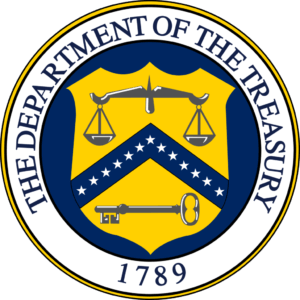 Today, Assistant Secretary for Financial Institutions Policy Graham Steele chaired a convening in the Treasury Cash Room with representation from civil rights organizations, consumer advocates, and research organizations to discuss financial inclusion and financial barriers faced by underserved communities. Today’s convening is one of many hosted by the Department of the Treasury as it develops a National Strategy on Financial Inclusion.
Today, Assistant Secretary for Financial Institutions Policy Graham Steele chaired a convening in the Treasury Cash Room with representation from civil rights organizations, consumer advocates, and research organizations to discuss financial inclusion and financial barriers faced by underserved communities. Today’s convening is one of many hosted by the Department of the Treasury as it develops a National Strategy on Financial Inclusion.
Deputy Secretary of the Treasury Wally Adeyemo delivered remarks highlighting the importance of financial inclusion to advance racial equity and Treasury’ successful efforts to ensure that the economic recovery following the COVID-19 pandemic was the most equitable on record. The Deputy Secretary also discussed the need for continued public and private sector work to guarantee that all Americans benefit from the country’s economic progress.
Deputy Assistant Secretary for Consumer Policy Suzanna Fritzberg facilitated a discussion regarding the scope of the financial inclusion strategy, tracking and benchmarking progress on financial inclusion, and priorities and recommendations for improving financial inclusion for underserved communities.
The Joint Explanatory Statement accompanying the Financial Services and General Government Appropriations Act, 2023 (FSGG), enacted on December 29, 2022, directed Treasury to develop a national strategy to improve financial inclusion. Treasury initiated work on the strategy in 2023 and is engaging with a wide variety of stakeholders to ensure that the strategy is valuable for all market participants, accessible, and provides clear and actionable opportunities to enhance financial inclusion for the benefit of consumers.
A Treasury Request for Information on financial inclusion is forthcoming and will be posted to the Federal Register to solicit additional public feedback.
Total Household Debt Reaches $17.29 Trillion In Q3 2023; Driven by Mortgage, Credit Card, And Student Loan Balances
 The Federal Reserve Bank of New York’s Center for Microeconomic Data today issued its Quarterly Report on Household Debt and Credit. The Report shows total household debt increased by $228 billion (1.3%) in the third quarter of 2023, to $17.29 trillion. The report is based on data from the New York Fed’s nationally representative Consumer Credit Panel.
The Federal Reserve Bank of New York’s Center for Microeconomic Data today issued its Quarterly Report on Household Debt and Credit. The Report shows total household debt increased by $228 billion (1.3%) in the third quarter of 2023, to $17.29 trillion. The report is based on data from the New York Fed’s nationally representative Consumer Credit Panel.
Mortgage balances rose by $126 billion from the previous quarter and stood at $12.14 trillion at the end of September. Credit card balances increased by $48 billion to $1.08 trillion in Q3 2023, representing a 4.7% quarterly increase. Auto loan balances rose by $13 billion, consistent with the upward trajectory seen since 2011, and now stand at $1.6 trillion. Student loan balances increased by $30 billion and now stand at $1.6 trillion. Other balances, which include retail cards and other consumer loans, increased by $2 billion.
Mortgage originations modestly declined to $386 billion in Q3 2023 and are well below the robust quarterly origination volumes observed between 2020 and 2021. The volume of newly originated auto loans, which includes leases, slightly increased and now stands at $179.3 billion. Aggregate limits on credit card accounts increased by $113 billion, a 2.46% increase from the previous quarter.
Aggregate delinquency rates increased in Q3 2023, with 3% of outstanding debt in some stage of delinquency at the end of September. Delinquency transition rates increased for most debt types except student loans and home equity lines of credit. The increases in credit card delinquency were the sharpest among borrowers between the ages of 30 and 39.
“Credit card balances experienced a large jump in the third quarter, consistent with strong consumer spending and real GDP growth,” said Donghoon Lee, Economic Research Advisor at the New York Fed. “The continued rise in credit card delinquency rates is broad based across area income and region, but particularly pronounced among millennials and those with auto loans or student loans.”
The New York Fed also issued an accompanying Liberty Street Economics blog post examining the composition of newly delinquent credit card borrowers. The Quarterly Report includes a summary of key takeaways and their supporting data points. Overarching trends from the report’s summary include:
Housing Debt
- There was $386 billion in newly originated mortgage debt in Q3 2023.
- About 36,000 individuals had new foreclosure notations on their credit reports, representing a small decline. The number of new foreclosures has remained very low since the CARES Act moratorium was lifted. Read more
Ohio Just Legalized Cannabis. Now Comes the Hard Part
Courtesy of Alicia Wallace, CNN

Ohio State House
Ohio certainly wasn’t the first state to legalize recreational cannabis — 23 other states have done so since 2012 — but the Buckeye State’s arrival on that list could ultimately be quite consequential for the growing industry.
Ohio voters’ approval of a legalization measure on Tuesday comes just months after cannabis saw some of its most significant movements at the federal level. In late August, a US Department of Health and Human Services official recommended that marijuana be reclassified as a Schedule III drug. One month later, a cannabis banking bill passed a key Senate committee.
A conservative and politically influential state such as Ohio legalizing marijuana should be the straw that breaks the proverbial camel’s back in terms of bringing federal regulation to cannabis, said Andrew Freedman, a partner at Forbes Tate and executive director of the Coalition for Cannabis Policy, Education and Regulation. “As Ohio goes, so goes the nation,” he said.
“It’s not the reddest [state] — the reddest was Missouri — but it is historically important, nationally important, presidentially important,” Freedman told CNN. “I honestly think it will have massive reverberating effects on what Congress has to do about this.” More than two-thirds of US states have legalized cannabis in some capacity: 38 states have approved comprehensive medical cannabis programs, and Ohio brings the recreational total to 24 states.
And support for legalization continues to grow. A record 70% of US adults surveyed by pollster Gallup said that cannabis use should be legal, according to a new poll released Wednesday. Still, cannabis remains federally illegal, and marijuana is classified as a Schedule I substance, the harshest of all drug classifications.
“A ‘no’ vote does send a signal across the nation that this is a major, middle-of-the-road/leaning-right part of this country that is saying, ‘Not too fast,’ and yet it passed by an overwhelming margin,” Freedman said. “I do think that it is a very clear message to the federal government that prohibition is no longer the law of the land, even though it remains on the books.”
For Ohio regulators, legislators and business operators, now comes the hard part.
More work to come
The voter-approved recreational measure approved this week is far afield from early legalization efforts in the state. In 2015, residents overwhelmingly voted against a medical and adult-use measure that would have limited growing and sales to 10 properties, all of which were owned by an investor group that included the 98 Degrees boy-bander Nick Lachey.
The law allows for adults over the age of 21 to buy and possess up to 2.5 ounces of cannabis and grow some plants at home for personal use. Legal sales will be subject to a 10% excise tax, as well as other local and state taxes, and those proceeds will go toward communities with dispensaries, programs such as small and minority business development, and addiction treatment. Read more
Nov. 3, 2023: Industry and Regulation
- Exclusive: US FDIC Is Probing Former First Republic Bank Directors and Officers
- U.S. Treasury Unveils Principles to Guide Financial Institutions’ Net-Zero Commitments
- OPINION: In Defense of Mid-Sized Banks: A Plea to Reconsider Regulations
- House Republicans Push Amendments to Eliminate CDFI, CFPB
Exclusive: US FDIC Is Probing Former First Republic Bank Directors and Officers
Courtesy of Douglas Gillison and Chris Prentice, Reuters
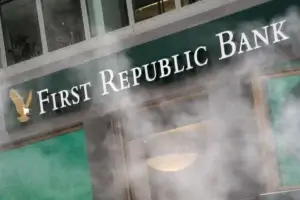 The Federal Deposit Insurance Corporation (FDIC) is investigating potential misconduct by executives and board members of First Republic Bank (FRCB.PK), raising the prospect of stiff penalties for the failed bank’s former bosses.
The Federal Deposit Insurance Corporation (FDIC) is investigating potential misconduct by executives and board members of First Republic Bank (FRCB.PK), raising the prospect of stiff penalties for the failed bank’s former bosses.
“We can confirm a D&O probe into First Republic is taking place,” a spokesperson told Reuters on Wednesday, referring to the bank’s directors and officers. The regulator did not provide further details. The investigation, which has not previously been reported, is the third the FDIC has opened into bank failures earlier this year which cost the federal government’s deposit insurance fund about $32 billion.
FDIC Chairman Martin Gruenberg said in March the agency was also probing possible misconduct related to the collapses of Silicon Valley Bank (SVB) and Signature Bank (SBNY.PK) New York. The FDIC has not provided updates on these investigations. The three banks, which combined held more than half a trillion dollars in assets, failed following depositor runs. Regulators have said they each exhibited weak risk management and ran high levels of uninsured deposits.
As with SVB and Signature Bank, the FDIC is probing whether First Republic executives and board members broke rules that require them to act in the bank’s best interests. Under federal law, the FDIC can ban former directors and officers from the industry, and impose fines for breaching their fiduciary duty and unsafe or unsound practices that involve dishonesty or “willful or continuing disregard” for a bank’s well being.
Former First Republic CEO and President Michael Roffler and former Executive Chairman James Herbert could not immediately be reached for comment. Attorneys representing the bank’s independent board members did not immediately return requests for comment.
Roffler told lawmakers in May that regulators never expressed any concern about the bank’s strategy, liquidity or management and it had been “contaminated overnight” by the depositor panic from SVB and Signature Bank. While it is standard practice for the FDIC to probe bank failures, and not necessarily an indication of wrongdoing, the probe adds to regulatory scrutiny of the failed banks’ leadership.
The U.S. Justice Department and Securities and Exchange Commission (SEC) are scrutinizing stock trades and statements made by First Republic ahead of the bank’s demise, according to a source with knowledge of the probe. Bloomberg previously reported the investigation. Massachusetts regulators are also investigating First Republic insiders’ stock sales, Reuters previously reported. Federal investigators are likewise probing the collapse of SVB, Reuters and others have reported. Read more
U.S. Treasury Unveils Principles to Guide Financial Institutions’ Net-Zero Commitments
Courtesy of Jason M. Halper , Timbre Shriver of Cadwalader, Wickersham & Taft LLP – Cadwalader Climate, National Law Review
 On September 19, 2023, the U.S. Treasury Department introduced nine guiding principles for private sector financial institutions that have made net-zero commitments. The principles are intended to highlight and encourage the adoption of best practices and promote consistency and credibility in the approaches taken to set and achieve net-zero commitments. The “Principles for Net-Zero Financing & Investment” are also intended to help attract private sector capital to address the economic and environmental impacts of climate change.
On September 19, 2023, the U.S. Treasury Department introduced nine guiding principles for private sector financial institutions that have made net-zero commitments. The principles are intended to highlight and encourage the adoption of best practices and promote consistency and credibility in the approaches taken to set and achieve net-zero commitments. The “Principles for Net-Zero Financing & Investment” are also intended to help attract private sector capital to address the economic and environmental impacts of climate change.
The nine principles focus on Scope 3 greenhouse gas emissions, which generally comprise the majority of financial institutions’ GHG emissions.
- Principle 1. A financial institution’s net-zero commitment is a declaration of intent to work toward the reduction of greenhouse gas emissions. The Treasury Department recommends that commitments be in line with limiting the increase in the global average temperature to 1.5°C, consistent with Paris Agreement goals. To be credible, this declaration should be accompanied or followed by the development and execution of a net-zero transition plan.
- Principle 2. Financial institutions should consider transition finance, managed carbon emission phaseout, and climate solutions practices when deciding how to achieve their commitments.
- Principle 3. Financial institutions should establish credible metrics and targets and endeavor, over time, to assign metrics and targets for all relevant financing, investment, and advisory services.
- Principle 4. Financial institutions should assess client and portfolio company alignment to their (i.e., financial institutions’) targets and to limiting the increase in the global average temperature to 1.5°C.
- Principle 5. Financial institutions should align engagement practices—with clients, portfolio companies, and other stakeholders—to their commitments.
- Principle 6. Financial institutions should develop and execute an implementation strategy that integrates the goals of their commitments into relevant aspects of their businesses and operating procedures.
- Principle 7. Financial institutions should establish robust governance processes to provide oversight of the implementation of their commitments.
- Principle 8. Financial institutions should, in the context of activities associated with their net-zero transition plans, account for environmental justice and environmental impacts, where applicable.
- Principle 9. Financial institutions should be transparent about their commitments and progress towards them.
More than 100 U.S. financial institutions have independently made voluntary net-zero commitments, according to the Department. Alongside publishing its principles, the Treasury Department also highlighted key announcements related to transition planning. This included the Glasgow Financial Alliance for Net Zero’s (GFANZ) announcement that over 50 U.S. financial institutions – and more outside the U.S. – had committed to independently publish their net-zero transition plans over the coming year. The Treasury Department also applauded a $340 million commitment by philanthropic organizations, including the Bezos Earth Fund, Bloomberg Philanthropies, ClimateWorks Foundation, Hewlett Foundation and Sequoia Climate Foundation, to help financial institutions develop and execute their net-zero commitments. Read more
OPINION: In Defense of Mid-Sized Banks: A Plea to Reconsider Regulations
Courtesy of Eugene Ludwig, the Hill
 The United States is blessed with banks of all sizes, each tailored to fit the needs of our diverse economy. However, policymakers have come to underappreciate the importance of mid-sized banks to the economy — banks with asset sizes ranging from $10 billion to $700 billion.
The United States is blessed with banks of all sizes, each tailored to fit the needs of our diverse economy. However, policymakers have come to underappreciate the importance of mid-sized banks to the economy — banks with asset sizes ranging from $10 billion to $700 billion.
Current laws, regulations and regulatory discussions indicate this “middle” range is significant, often further classified into smaller mid-size banks ($10 billion to $100 billion), regional banks ($100 billion to $250 billion, or “Category IV” banks) and super-regional banks ($250 billion to $700 billion, or “Category III” banks).
Mid-sized banks are vital to America’s economic landscape, promoting entrepreneurship, innovation and financial product development. Most, if not all, leading corporate innovators established their first banking relationship with a mid-sized bank or even credit union — including companies such as Apple, Microsoft, Amazon and Google.
Large banks cannot encourage the same level of entrepreneurialism. In Canada, Europe and other places where the economy relies heavily on a handful of massive financial institutions, there seems to be less room for innovation and entrepreneurship. In contrast, the United States has a more diverse banking system, and this allows for a more dynamic and innovative capital market.
Additionally, the presence of smaller banks in the U.S. has fostered the growth of the fintech movement, which is driving innovation in the consumer lending and payment space. The access to U.S. payment systems provided by smaller banks has been crucial for the success of these innovative fintech companies.
However, the current regulations place community- and mid-size banks at a competitive disadvantage. The complexity and volume of these rules may be suitable for institutions with massive operations and extensive resources. However, it is unreasonable to expect a bank with 10,000 employees and $100 billion in assets to comply with the same rules as financial conglomerates with 300,000 employees and $3.8 trillion in assets. And yet, too often these institutions are treated as peers through the supervisory process.
“Principle-based” rules, intended to provide flexibility for supervisors in overseeing institutions of different sizes and complexities, can also inadvertently put smaller banks at a disadvantage. The regulations typically require banks to implement controls based on the level of risk they face or to have effective control programs in place. Read more
House Republicans Push Amendments to Eliminate CDFI, CFPB
Members propose amendments to Financial Services funding measure.
Courtesy of David Baumann, CUCollaborate
 As the House begins consideration of FY24 funding measures again, some House Republicans want to eliminate funding for the CFPB and the CDFI program. Those proposals are among more than 235 proposed amendments to the House Financial Services appropriations measure, H.R. 4664.
As the House begins consideration of FY24 funding measures again, some House Republicans want to eliminate funding for the CFPB and the CDFI program. Those proposals are among more than 235 proposed amendments to the House Financial Services appropriations measure, H.R. 4664.
The Rules Committee will develop a rule and determine which amendments may come to the floor. The House votes on the rule, which almost always is approved by the House. The Rules Committee has not yet scheduled a meeting on H.R. 4664, but the deadline for filing amendments to H.R. 4664 was Monday at 5 p.m.
Plan to Eliminate CDFI Program
When the panel does meet, it will consider an amendment proposed by Rep. Glenn Grothman, R-Wis., which simply eliminates the budget line item for the CDFI program. Even if he is allowed to offer his amendment on the floor, Grothman’s proposal is unlikely to pass, since the CDFI program has proven to be popular among members of Congress.
And even if it were to pass the House, the Senate is extremely unlikely to accept it.
On the other hand, House Financial Services Committee ranking Democrat Rep. Maxine Waters, D-Calif., is proposing an amendment increasing CDFI to $341 million—the level included in President Biden’s FY24 budget request. The House bill currently calls for the program to receive $278.6 million. The program received $324 million in FY23.
CFPB Proposals
Meanwhile, Rep. Scott Perry, R-Pa., has asked the Rules Committee to allow him to offer his amendment to eliminate all funding for the CFPB—a favorite target of Republican lawmakers. Again, even if the House passes that amendment, the Senate is extremely unlikely to accept it.
Additionally, some Democrats are attempting to offer their own CFPB amendments to H.R. 4664. Rep. David Scott, D-Ga., wants to add language urging CFPB Director Rohit Chopra to develop a plan to use money in the agency’s Civil Penalty Fund on efforts to increase financial literacy. And Rep. Al Green, D-Texas, wants to add a provision that would require the CFPB to provide awards to whistleblowers who report information that results in monetary penalties. Read more
Oct. 27, 2023: Industry and Regulation
- Agencies Issue Principles for Climate-Related Financial Risk Management for Large Financial Institutions
- NCUA Posts 2024-2025 Proposed Budget, Sets November 16 Public Briefing
- Banks Face Shake-Up of Low-Income Lending Rules
- CFPB Accelerates U.S. Open Banking with New Data Rule
Agencies Issue Principles for Climate-Related Financial Risk Management for Large Financial Institutions
 Federal bank regulatory agencies today jointly finalized principles that provide a high-level framework for the safe and sound management of exposures to climate-related financial risks for large financial institutions.
Federal bank regulatory agencies today jointly finalized principles that provide a high-level framework for the safe and sound management of exposures to climate-related financial risks for large financial institutions.
The principles are consistent with the risk management framework described in the agencies’ existing rules and guidance. The principles are intended for the largest financial institutions, those with $100 billion or more in total assets, and address physical and transition risks associated with climate change.
The principles are intended to support efforts by the largest financial institutions to focus on key aspects of climate-related financial risk management. General climate-related financial risk management principles are provided with respect to a financial institution’s governance; policies, procedures, and limits; strategic planning; risk management; data, risk measurement, and reporting; and scenario analysis. Additionally, the principles describe how climate-related financial risks can be addressed in the management of traditional risk areas, including credit, market, liquidity, operational, and legal risks.
The final principles neither prohibit nor discourage large financial institutions from providing banking services to customers of any specific class or type, as permitted by law or regulation. The decision regarding whether to make a loan or to open, close, or maintain an account rests with the financial institution, so long as the financial institution complies with applicable laws and regulations.
These final principles are substantively similar to the agencies’ draft principles, with clarifications based on commenter feedback.
- Federal Registernotice: Principles for Climate-Related Financial Risk Management for Large Financial Institutions (PDF)
- Board memo: Interagency Principles for Climate-Related Financial Risk Management for Large Financial Institutions (PDF)
- Summary of Final Principles for Climate-Related Financial Risk Management for Large Financial Institutions (PDF)
NCUA Posts 2024-2025 Proposed Budget, Sets November 16 Public Briefing
Agency Accepting Comments and Budget Briefing Presentation Requests
 The National Credit Union Administration’s staff draft budget for 2024–2025 is now available on the agency’s website for review and comment. The draft budget has also been submitted for publication in the Federal Register, and the comment period is open until November 21.
The National Credit Union Administration’s staff draft budget for 2024–2025 is now available on the agency’s website for review and comment. The draft budget has also been submitted for publication in the Federal Register, and the comment period is open until November 21.
The proposed combined 2024 budget is $394.5 million, or 9.5 percent higher than the 2023 budget. The proposed operating budget is $382.1 million, which is 11 percent higher than in 2023. The proposed 2024 capital budget is $7.3 million, or 35.6 percent lower than in 2023. The proposed Share Insurance Fund administrative budget is $5.1 million, or 3.6 percent higher than in 2023. The proposed budget summary and detailed budget justifications can be found on the Budget and Supplementary Materials page on NCUA.gov.
The agency will hold a public budget briefing at its Central Office Thursday, November 16, beginning at 2 p.m. Eastern. The meeting will be livestreamed on NCUA.gov.
To comment on the proposed budget:
- Submit comments on Docket # NCUA-2023-0117 at the Federal eRulemaking Portal(opens new window) by November 21.
- Comments should provide specific, actionable recommendations.
To request to present at the November 16 budget briefing:
- Email your request to [email protected] by November 3.
- Include the presenter’s name, title, affiliation, mailing address, email address, and telephone number.
- The Board Secretary will notify approved presenters and give them their allotted presentation times.
- Email a copy of your presentation to [email protected] by 5 p.m. Eastern on November 8.
The Board is scheduled to approve a final budget at its December 14 open meeting.
Banks Face Shake-Up of Low-Income Lending Rules
Top banking regulators are completing overhaul to Community Reinvestment Act rules
Courtesy of Andrew Ackerman, Wall Street Journal
 Top U.S. banking regulators struggled for more than five years to update anti-redlining rules aimed at making banks lend more in lower-income communities. On Tuesday, they completed a revamp of them for the era of online banking.
Top U.S. banking regulators struggled for more than five years to update anti-redlining rules aimed at making banks lend more in lower-income communities. On Tuesday, they completed a revamp of them for the era of online banking.
The 1977 Community Reinvestment Act sought to end banks’ historical practice of denying or limiting financial services in minority neighborhoods. The current rules, which are nearly 30 years old, generally require banks to serve everyone in the communities surrounding their branches, including lower-income people.
Regulators say those requirements are outdated in a world in which much financial activity happens over the Internet and with mobile phones, so they updated them to focus more on where banks do business, rather than just their physical locations.
“The final rule takes a critical step forward in modernizing the CRA regulations,” Michael Barr, the Federal Reserve’s vice chair for banking supervision, said.
Banks said a 2022 proposed version of the new rules would have made it too challenging to get the highest rating when regulators assess banks for their compliance with the requirements, potentially leading firms to pull back on their investments in low-income communities. Industry lawyers have compared the dynamic to a professor telling a class that nobody will likely get a perfect test score, leading students to try less to do well.
Agency officials told reporters on Tuesday that they had made adjustments to the final version of the rules and that it will be possible for banks to get outstanding ratings. Some industry officials, in their initial response to the 1,500 pages of the new requirements, said changes from last year’s proposal would likely satisfy many lenders’ criticisms.
Fed governor Michelle Bowman, a Republican, voted against the final rules, saying regulators hadn’t proved that banks aren’t doing enough to meet the credit needs of their communities. “There is no evidence provided to support this premise,” she said.
The Fed, the Office of the Comptroller of the Currency and the Federal Deposit Insurance Corp. signed off on the requirements on Tuesday. Banks have until January 2026 to comply with most of the new provisions. Read more
CFPB Accelerates U.S. Open Banking with New Data Rule
Courtesy of FinExtra
 The Consumer Financial Protection Bureau (CFPB) has proposed its long-awaited open banking rule in the hopes of improving competition in the US banking and payments sector.
The Consumer Financial Protection Bureau (CFPB) has proposed its long-awaited open banking rule in the hopes of improving competition in the US banking and payments sector.
The proposed Personal Financial Data Rights rule activates the dormant Section 1033 of the Dodd-Frank Act, which was enacted by Congress more than a decade ago. This means consumer financial service providers are required to share data at the user’s direction with other companies in the ecosystem that offer more attractive products and services.
“With the right consumer protections in place, a shift toward open and decentralised banking can supercharge competition, improve financial products and services, and discourage junk fees,” said CFPB director Rohit Chopra. “Today, we are proposing a rule to give consumers the power to walk away from bad service and choose the financial institutions that offer the best products and prices.”
Under the proposed Personal Financial Data Rights rule, people would be able to share data about their use of checking and prepaid accounts, credit cards, and digital wallets.
According to the CFPB, the proposed Personal Financial Data Rights rule would ensure that consumers:
- Get their data free of junk fees
- Have a legal right to share their data
- Can walk away from bad service
The CFPB further states the proposed Personal Financial Data Rights rule would protect the interests of both consumers and financial firms through:
- Robust protections to prevent unchecked surveillance and misuse of data
- Meaningful consumer control
- A move away from risky data collection practices
- Fair industry standard-setting
The requirements proposed would be implemented in phases based on size and capacity. The largest banks and fintechs compliance dates start at six months, and reach up to four years for smaller companies. Smaller community banks and credit unions that have no digital interface at all with their customers would be exempt from the rule’s requirements. Read more
Oct. 20, 2023: Industry and Regulation
- MBA: Mortgage Origination Volume Expected to Increase In 2024
- Senate Panel to Consider Otsuka Nomination to NCUA Board
- Credit Union Ranks Will Shrink in 2024 as M&A Drives Scale and Innovation
- October Forecast: A Busy Month for Climate Change-Related Regulation and Insurers
MBA: Mortgage Origination Volume Expected to Increase In 2024
 Total mortgage origination volume is expected to increase to $1.95 trillion in 2024 from the $1.64 trillion expected in 2023, according to the Mortgage Bankers Association (MBA).
Total mortgage origination volume is expected to increase to $1.95 trillion in 2024 from the $1.64 trillion expected in 2023, according to the Mortgage Bankers Association (MBA).
Courtesy of Dave Kovaleski, Financial Regulation News
By loan count, total mortgage origination volume is also expected to increase by 19 percent, to 5.2 million loans in 2024 from 4.4 million loans expected in 2023. Further, purchase originations are forecast to increase 11 percent to $1.47 trillion next year.
“Both fiscal and monetary policies have contributed to the much higher level of mortgage rates in 2023,” Mike Fratantoni, chief economist and senior vice president for research and industry technology at MBA, said. “The Fed’s hiking cycle is likely nearing an end, but while Fed officials have indicated that additional rate hikes might not be needed, rate cuts may not come as soon or proceed as rapidly as previously expected. Lower rates should help boost both homebuyer demand and increase the inventory of existing homes, thereby supporting purchase origination volume in 2024.”
Fratantoni, along with Deputy Chief Economist Joel Kan and Vice President of Industry Analysis Marina Walsh presented MBA’s 2024 outlook at its 2023 Annual Convention & Expo this week. “The job market will likely slow as we enter 2024, with fewer jobs added and the unemployment rate increasing from its current rate of 3.8 percent to 5.0 percent by the end of 2024. Inflation will gradually decline towards the Fed’s 2 percent target by the middle of 2025,” Fratantoni added.
As the economy slows and inflation moves lower, longer-term rates will decline from current levels, helping to bring mortgage rates lower, Fratantoni said. However, the spread between mortgage and Treasury rates remains roughly 120 basis points wider than typical, due to a combination of factors. MBA’s forecast is for mortgage rates to end 2024 at 6.1 percent and reach 5.5 percent at the end of 2025, as Treasury rates decline and as the spread narrows.
Also, MBA expects national home prices to grow over the next three years, as tight inventory supports price growth. Kan said first-time homebuyers will account for a large portion of housing demand over the next few years, given the largest age cohort entering its prime homeownership ages. Read more
Senate Panel to Consider Otsuka Nomination to NCUA Board
This article first appeared on CUCollaborate
 The Senate Banking Committee on Oct. 19 will hold a confirmation hearing on the nomination of Tanya Otsuka to be a member of the NCUA board. Otsuka is scheduled to testify at the hearing, as are several nominees for other federal agencies and boards.
The Senate Banking Committee on Oct. 19 will hold a confirmation hearing on the nomination of Tanya Otsuka to be a member of the NCUA board. Otsuka is scheduled to testify at the hearing, as are several nominees for other federal agencies and boards.
If confirmed, she would replace Rodney Hood and would give Democrats control over the NCUA board. Hood, a Republican, has stayed on the board even though his term expired in August. Board members often stay on until their replacements are confirmed.
Vote schedule unclear
It is not clear when the committee could vote on Otsuka’s nomination or when it may go to the full Senate.
However, two things might be working in Otsuka’s favor. First, as a staff member working for Banking Chairman Sen. Sherrod Brown, D-Ohio, Otsuka presumably is well known to committee members and their staffs. Second, as they go to a committee and floor vote, the Senate often likes to “pair” nominees—one from each party.
Republican nominee to be considered
As the committee works on Otsuka’s nomination, it also will be considering at least one Republican nominee—former House Financial Services Chairman Spencer Bachus of Alabama for reappointment to a seat on the Export-Import Bank.
In announcing Otsuka’s nomination last month, White House officials noted that she has worked on the committee’s banking and credit union issues since 2020. She also has served as a counsel and staff attorney at the FDIC.
Credit union member
And it should be noted that, based on a financial disclosure form Otsuka recently filed with the Office of Government Ethics, it appears she is a member of a credit union, although the institution is not named. When she was nominated, Brown and current NCUA Chairman Todd Harper praised the choice. The NCUA board is scheduled to meet on the same day as the confirmation hearing. Read more
Credit Union Ranks Will Shrink in 2024 as M&A Drives Scale and Innovation
Courtesy of PYMNTS.com
 A decade ago, there were nearly 7,000 credit unions, and that number’s been consolidated to about 4,700. Scott Young, managing VP of Emerging Services at PSCU, told PYMNTS that the consolidation has been a response to “a myriad of factors” as pairings and buyouts happen at a pace of several dozen a quarter.
A decade ago, there were nearly 7,000 credit unions, and that number’s been consolidated to about 4,700. Scott Young, managing VP of Emerging Services at PSCU, told PYMNTS that the consolidation has been a response to “a myriad of factors” as pairings and buyouts happen at a pace of several dozen a quarter.
The continued shift to digital and omnichannel conduits through which consumers want to bank have presented challenges to credit unions (CUs), said Young, especially for the smaller players that may not have the resources and technology on hand as might be seen with their larger brethren.
In today’s financial services landscape, he said, scale is a competitive advantage. Mergers can give some tailwind to those efforts to enter new markets and to satisfy the demands of regulatory compliance and cybersecurity. And ticking those boxes means that CUs can turn their attention toward pursuing what might be thought of as the holy grail of banking: innovation.
But innovation needs to be targeted, said Young — the proverbial spray-and-pray approach does not work in a resource-constrained environment.
Looking Toward Social Media
CUs, no matter their size, or whether fashioned together via deal-making, need not go it alone as they tackle new products and services, said Young, as credit union service organizations (CUSOs) such as PSCU can help leverage data — the key ingredient — to help underpin that innovative drive. The pandemic spurred the embrace of digital channels, and now CUs have to retool their efforts to cater to the younger, digitally-native generations, said Young.
“A lot of the younger generation,” said Young, “get their financial information from social media,” and that channel is a greenfield opportunity for CUs to pursue and engage with younger consumers, and become “trusted advisors” across TikTok and other avenues of engagement to cement the thing that CUs do best — foster strong member relationships.
“You’ve got to be where those members are,” said Young. The metaverse, though not as buzzy as it might have been, represents another opportunity. Artificial intelligence (AI) suddenly has grown and evolved by leaps and bounds, and now is being used in all facets of the banking industry.
Innovation and AI, Young said can be used not just to make predictive decisions about what loans and transactions a member might need next. Those advanced technologies can also harness data to improve authentication tools so that members can interact with financial institutions and call centers without juggling passwords or knowledge-based questions. The ways in which generative AI can be used to enhance innovations, digital interactions and even in-person banking relationships are just in the early stages, he said — likening ChatGPT and other new developments to kindling that gets a fire roaring. Read more
October Forecast: A Busy Month for Climate Change-Related Regulation and Insurers
Courtesy of Thomas M. Dawson of McDermott Will & Emery,National Law Review
 Sec Climate Financial Risk Disclosure: Release of the Agency’s Revised Regulation?
Sec Climate Financial Risk Disclosure: Release of the Agency’s Revised Regulation?
At some point in October 2023, the US Securities and Exchange Commission (SEC) is expected to release the long-awaited final version of its climate-related financial risk disclosure regulation, first released for public comment in March 2022. Once this regulation is finalized, expect state attorneys general and perhaps private litigants to file lawsuits seeking to invalidate the regulation. These opponents likely will argue that Congress did not explicitly delegate regulatory authority to the SEC related to climate change and climate financial risks, and therefore the SEC’s regulation violates the “major question” doctrine. The Supreme Court of the United States used the major question doctrine last year in West Virginia v. EPA to invalidate an Environmental Protection Agency regulation that would have required power plant operators to go beyond installing scrubbers and change the mix of fuels used to generate electricity in order to reduce air pollution levels.
Regardless of whether the SEC’s climate risk disclosure requirements are upheld, the SEC enforcement staff is monitoring whether regulated entities—particularly investment advisors—are telling the truth in statements about their consideration of environmental, social and governance (ESG) factors in investment recommendations and decisions. The SEC’s Climate and ESG Task Force, formed in March 2021, coordinates the agency’s ESG enforcement activities, analyzing data from all registrants to “identify potential violations including material gaps or misstatements in issuers’ disclosure of climate risks under existing rules.
California: Pro-Esg Climate Change Financial Risk Legislation Signed into Law
In September 2023, California’s legislature passed landmark climate financial risk disclosure legislation (S.B. 261) and greenhouse gas emission reporting legislation (S.B. 253) that will require many companies “doing business” in the state to prepare and submit climate financial risk disclosures and greenhouse gas emissions reports (audited by outside consultants). On October 7, 2023, California Governor Gavin Newsom signed both bills into law, and they will become effective in 2026 (2027 for reporting of Scope 3 emissions). Insurers (and any entity regulated by the state’s Department of Insurance) are exempt from filing the financial risk disclosure reports, since California-domiciled insurers are already required to file climate risk disclosures using either the National Association of Insurance Commissioners (NAIC) reporting template or by filing Task Force on Climate-Related Financial Disclosures compliant reports.
Interestingly, on October 8, 2023, Governor Newsom vetoed legislation (A.B. 970) that California Insurance Commissioner Ricardo Lara had championed to create the Climate and Sustainability Insurance and Risk Reduction Program to develop proof of concepts for new insurance options, focusing on communities with uninsured or underinsured climate risks. Had Governor Newsom not vetoed the bill, the state Insurance Department would have funded pilot projects in eight locales around the state to mitigate risks from flooding and extreme heat and to reduce protection gaps in these communities. Read more
Oct. 13, 2023: Industry and Regulation
- Mich. CU Is Broadening Its Reach by Rebuilding Banking Deserts
- Businesses Are Returning $140 Million In Surprise Overdraft Fees to Consumers, According to a CFPB Report
- FTC Proposes Rule to Ban ‘Junk Fees’
- Walmart CEO Warns Consumers Can’t Keep Up with Inflation — 5 Economic Factors to Blame
Mich. CU Is Broadening Its Reach by Rebuilding Banking Deserts
 The Michigan-based credit union is expanding across the state with some unintended help from for-profit banks.
The Michigan-based credit union is expanding across the state with some unintended help from for-profit banks.
Courtesy of Sharon Simpson, CreditUnions.com
When banks reduce their overall branch footprint or even shutter a single location, it can have a big impact on rural communities. In Michigan alone, 321 bank branches closed between June 30, 2020, and June 30, 2022, according to FDIC data. Beyond closing branches, nine financial institutions left the state altogether during that same period.
For some cooperatives, serving newly created banking deserts is an opportunity to live their mission while charting a new path to sustainable growth. That was the case when Diane Abbonizio, CEO, and Doug Kelley, CFO of United Bay Community Credit Union ($279.0M, Bay City, MI) learned about the vacancy Huntington Bank had left in Coleman, MI.
“It was causing hardship in the community,” Kelley says. “Small business owners would have to close down and drive 30 minutes to access the closest financial institution.”
Abbonizio learned of the need from a village president in one of the neighboring communities where United Bay had been considering opening a branch in 2020. Although that location wasn’t a fit, those conversations opened the door to serving Coleman and growing the credit union’s small business accounts.
During the past year, United Bay has opened more than 50 business accounts and continues to build new relationships each day. Although the credit union provides financial convenience, its impact has been much greater.
“Ownership in the credit union is giving people pride back in their town,” Kelley says.
Building Trust When New To The Neighborhood
In March 2022, CEO Abbonizio announced the credit union’s move into Coleman at a local hair salon. A large contingent of members from the Coleman Business Alliance was present, which helped foster excitement and build trust from day one. Read more
Businesses Are Returning $140 Million In Surprise Overdraft Fees to Consumers, According to a CFPB Report
Courtesy of Chelsey Cox, CNBC
 KEY POINTS
KEY POINTS
- Companies will refund $140 million to consumers following Consumer Financial Protection Bureau reporting on illegal junk fees.
- Surprise bank overdraft and nonsufficient fund fees account for $120 million of the amount.
- Nearly two-thirds of banks with more than $10 billion in assets have dropped NSF fees, according to a separate report.
The nation’s federal consumer protection watchdog announced Wednesday that companies will refund $140 million to customers as a result of its work to uncover illegal so-called junk fees.
“The [Consumer Financial Protection Bureau] continues to uncover junk fee scams that violate the law and undermine consumer trust,” CFPB Director Rohit Chopra said in a statement. “We will continue to combat the illegal fees cropping up in consumer finance markets.”
The bureau on Wednesday released a report of supervisory highlights in tandem with the Biden administration’s newly announced policies targeting junk fees across industries. The report outlines the CFPB’s examination of fees related to deposit accounts — including overdraft and nonsufficient funds — auto loans and remittances between February and August 2023.
Financial institutions that hit customers with surprise overdraft and NSF fees account for $120 million of the $140 million that companies will reportedly refund to consumers following the March edition of the report, the CFPB found.
Nearly two-thirds of banks with more than $10 billion in assets have also eliminated NSF fees, saving customers nearly $2 billion a year, according to a separate report released Wednesday. Read more
FTC Proposes Rule to Ban ‘Junk Fees’
Courtesy of Julia Mueller, the Hill
 The White House announced new actions against so-called “junk fees” Wednesday, including a proposed Federal Trade Commission (FTC) rule that would ban the “hidden and bogus” charges.
The White House announced new actions against so-called “junk fees” Wednesday, including a proposed Federal Trade Commission (FTC) rule that would ban the “hidden and bogus” charges.
The rule would require corporations to include all mandatory fees when communicating a price to consumers, a move that the administration says would make it easier for customers to compare prices — and encourage companies to compete to offer the lowest price.
“The proposed rule would prohibit corporations from running up the bills with hidden and bogus fees, requiring honest pricing and spurring firms to compete on honesty rather than deception,” FTC Chairwoman Lina Khan said in a call with reporters.
The White House says this move would prohibit surprise or mislabeled fees in event ticketing, banking, hotel booking, car and apartment rentals, as well as other industries — which the administration says currently cost Americans tens of billions every year — and require the full price be shown upfront.
The rule, as proposed, would also give the FTC “enforcement teeth,” giving the agency the power to secure refunds for customers and seek penalties against companies where possible, according to a release.
President Biden promised last year to take action against the extra charges as a means of combating inflation, and his White House has stressed that junk fees unnecessarily strain American consumers. Read more
Walmart CEO Warns Consumers Can’t Keep Up with Inflation — 5 Economic Factors To Blame
Courtesy of Dawn Allcot, GOBankingRates/Nasdaq
 For several months, the U.S. Federal Reserve and financial experts, alike, have been wondering when consumer spending would slow. On a recent episode of the YouTube show Minority Mindset, Jaspreet Singh commented, “Spending can only go up for so long. If Americans keep digging deeper into their cash, then they start digging deeper into savings, and then they start digging deeper into their credit, eventually they hit a breaking point.”
For several months, the U.S. Federal Reserve and financial experts, alike, have been wondering when consumer spending would slow. On a recent episode of the YouTube show Minority Mindset, Jaspreet Singh commented, “Spending can only go up for so long. If Americans keep digging deeper into their cash, then they start digging deeper into savings, and then they start digging deeper into their credit, eventually they hit a breaking point.”
Some experts believe that breaking point has arrived. While final sales figures are not yet in for Amazon Prime Deal Days and Target and Walmart’s big sales, former Walmart U.S. CEO Bill Simon recently told CNBC’s Fast Money, “Overall, I think for the first time in a long time, there’s a reason for the consumer to pause.”
Simon, who currently serves on the Board of Directors for Darden Restaurants and Hanesbrands Inc., cited a variety of factors that are making consumers feel insecure about their finances. “Consumers had an incredible 10-, 12-year run,” Simon told Fast Money. “Markets were buoyant. Interest rates were low. Money was available.”
Although he said there is still some good news on the financial front, namely low unemployment rates and higher wages, an accumulation of pressures point to a slow-down in consumer spending. What factors are to blame?
High Interest Rates
When interest rates rise, money becomes more expensive to borrow, which often leads to a tightening of spending. This hasn’t necessarily happened in the past year, as consumers continue borrowing on their revolving credit lines and dipping into savings to afford what they want.
But Simon said he sees that shifting now, with consumers becoming “wary.” Read more
Oct. 6, 2023: Industry and Regulation
- U.S. Supreme Court Appears Wary in Case Targeting Consumer Financial Watchdog
- Senator Calls for Regulators to Look into Alleged Wells Fargo Labor Violations
- More Mortgage Applications Are Being Rejected for ‘Insufficient Income’
- Reverse-Mortgage Lawsuit Claims Ginnie Mae Reneged on Loan Promises
U.S. Supreme Court Appears Wary in Case Targeting Consumer Financial Watchdog
Courtesy of John Kruzel and Andrew Chung, Reuters
 U.S. Supreme Court justices on Tuesday appeared skeptical of the payday lending industry’s challenge to the Consumer Financial Protection Bureau’s funding structure in a case that President Joe Biden’s administration has said imperils an agency set up to curb predatory lending after the 2008 global financial crisis.
U.S. Supreme Court justices on Tuesday appeared skeptical of the payday lending industry’s challenge to the Consumer Financial Protection Bureau’s funding structure in a case that President Joe Biden’s administration has said imperils an agency set up to curb predatory lending after the 2008 global financial crisis.
The justices heard arguments in the administration’s appeal of a lower court’s ruling that the CFPB’s funding mechanism, established when Congress passed Democratic-backed legislation in 2010 creating the agency, violated a constitutional provision giving lawmakers the power of the purse. The agency, which enforces consumer financial laws, draws money each year from the U.S. Federal Reserve rather than budgets passed by Congress.
It was the first of several cases the justices are tackling during their new nine-month term, which began on Monday, that could curb the power of federal agencies.
Questions posed by the court’s three liberal justices and at least two of the six conservative justices – Brett Kavanaugh and Amy Coney Barrett – signaled doubt over the argument by the challengers that the CFPB’s funding design violates the U.S. Constitution’s “appropriations clause,” which vests spending authority in Congress.
Kavanaugh pushed back against the assertion that the structure unlawfully lets the agency determine its own funding without a meaningful limit set by Congress.”Congress could change it tomorrow. And there’s nothing perpetual or permanent or about this,” Kavanaugh said.
Barrett expressed reservations about how the challengers – two payday lending trade groups – would rectify the funding issue.”I think we’re all struggling to figure out, then, what’s the standard that you would use,” Barrett told Noel Francisco, who argued for the challengers, adding: “How do you decide how much is too much or how specific is specific enough?” Read more
Senator Calls for Regulators to Look Into Alleged Wells Fargo Labor Violations
Courtesy of Claire Williams, American Banker
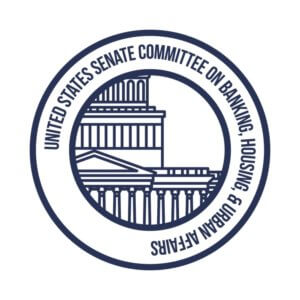 Senate Banking Committee Chair Sherrod Brown, D-Ohio, called on the Federal Reserve and the Office of the Comptroller of the Currency to look into Wells Fargo’s unionization efforts and alleged labor abuses.
Senate Banking Committee Chair Sherrod Brown, D-Ohio, called on the Federal Reserve and the Office of the Comptroller of the Currency to look into Wells Fargo’s unionization efforts and alleged labor abuses.
In Wednesday’s letter, addressed to the Fed’s Vice Chair for Supervision Michael Barr and acting Comptroller Michael Hsu, Brown cited an informal settlement with the National Labor Review Board over a manager allegedly threatening a senior advisor who was disturbing pro-union literature at a call center, three Unfair Labor Practice cases investigated at an Oregon call center and several other Unfair Labor Practice investigations and cases.
At the Oregon call center, staffers alleged that flyers posted by members of Wells Fargo Workers United, which was established in late 2021 by employees seeking to unionize, were repeatedly torn down by managers. Workers were also allegedly prohibited from wearing shirts bearing messaging and other imagery associated with the Committee for Better Banks, which helped establish the Workers United group.
Brown said that the filings are notable because, in the case of Wells Fargo’s fake account scandal, management engaged in “threats and retaliation against thousands of Wells Fargo workers that helped keep the misconduct unabated for years.”
“It is important that bank regulators consider allegations of unfair labor practices, including threats and retaliation by Wells Fargo against frontline employees, in their assessment of the bank’s safety and soundness,” Brown said. “Not only are violations of federal labor laws illegal, but they are also indicative of poor corporate governance and risk management. Abusive labor conditions and retaliation against workers who attempt to communicate concerns raise red flags about management quality and can be indicators of greater risk to the institution and consumers.” Read more
More Mortgage Applications Are Being Rejected for ‘Insufficient Income’
Courtesy of Jared Mitovich, CNBC
KEY POINTS
- Mortgage payments have become significantly less affordable for homebuyers, according to the Consumer Financial Protection Bureau.
- Nearly a quarter of refinance applications were rejected in 2022 — up sharply from 14.2% in 2021.
- Ted Jenkin, CEO of oXYGen Financial, recommended that consumers focus on their debt-to-income ratio.
 As high home prices and interest rates push up monthly mortgage payments, it’s harder for many consumers to even get a mortgage in the first place.
As high home prices and interest rates push up monthly mortgage payments, it’s harder for many consumers to even get a mortgage in the first place.
Last year, lenders denied loan applications due to “insufficient income” more often than any other point since records began in 2018, according to a new report from the Consumer Financial Protection Bureau.
Overall, 9.1% of home purchase applications among all applicants were denied in 2022, the consumer watchdog agency reported, higher than 8.3% in 2021 but a marginal decrease from 9.3% in 2020. Refinance applications were more frequently rejected, at a rate of 24.7% in 2022 — up sharply from 14.2% in 2021.
Insufficient income represented more than 50% of denials for Asian American applicants, 45% for Black and Hispanic applicants, and approximately 40% for white applicants — up from below 40% for each of these groups in 2018.
The CFPB also reported that the average cost of a monthly mortgage payment increased 46%, to $2,045 in December 2022, from $1,400 during December 2021. Given the rising cost of payments and mortgage rates — both of which have responded to the Federal Reserve’s rate hikes — “none” of the recent trends in income-based denials should “be a surprise,” said certified financial planner Barry Glassman, founder and president of Glassman Wealth Services in McLean, Virginia.
“In most cases, income did not increase at the pace of average mortgage payments,” said Glassman, who is a member of CNBC’s FA Council. Read more
Reverse-Mortgage Lawsuit Claims Ginnie Mae Reneged on Loan Promises
Courtesy of Paige Smith and Shelly Hagan, Bloomberg News
 Federal housing authorities persuaded Texas Capital Bancshares to help with the fallout from a bankrupt reverse-mortgage provider, then went back on their promises of financial support, the company said in a lawsuit Wednesday.
Federal housing authorities persuaded Texas Capital Bancshares to help with the fallout from a bankrupt reverse-mortgage provider, then went back on their promises of financial support, the company said in a lawsuit Wednesday.
Ginnie Mae canceled liens on tens of millions of dollars in collateral after the bank agreed to make a loan to Reverse Mortgage Funding LLC, according to the lawsuit. The loan was intended to prop up customers of the failed company, which was one of the largest providers of government-backed reverse mortgages.
The firm’s Texas Capital Bank unit provided the funds “on an emergency basis, in an effort to protect thousands of senior citizen mortgagors,” the bank said in the complaint. “Just weeks later, Ginnie Mae reversed course and purported to leave TCB empty-handed.”
The controversy traces its roots to last year’s bankruptcy of Reverse Mortgage Funding. Like many in the industry, the firm had been squeezed by surging interest rates and regulatory pressures. Texas Capital claims in the lawsuit that Ginnie Mae persuaded it to provide debtor-in-possession financing after the failure of Reverse Mortgage Funding.
“After inducing TCB to lend tens of millions of dollars so as to rescue RMF, thousands of retirees, and the politically important” Home Equity Conversion Mortgage program, Ginnie Mae nullified the bank’s priority lien, according to the lawsuit, which was filed in federal court in Amarillo, Texas. “Ginnie Mae seeks to declare by fiat that TCB’s only recourse for repayment is RMF — a bankrupt entity with few if any assets.”
Texas Capital said Ginnie Mae’s actions may force it to quit making reverse mortgages entirely, adding to pressure on the already weakened industry.
“If permitted, Ginnie Mae’s position will likely trigger an unwillingness on the part of lenders (including TCB) to extend financing necessary for millions of current and future seniors to fund their retirement, and will threaten the viability of the HECM program,” the company said in the complaint. Read more
Sept. 29, 2023: Industry and Regulation
- Financial Privacy Act Goes Through Markup Session in House Committee
- Questions to Consider as Regulators Increase Scrutiny of Medical Debt
- Senate Committee Passes Cannabis Banking Bill
- U.S. Government Shutdown: What Is It and Who Would Be Affected?
Financial Privacy Act Goes Through Markup Session in House Committee
Courtesy of Dave Kovaleski, Financial Regulation News
 A bill that would require the U.S. Treasury to report the protocols given to national security, law enforcement, and intelligence agencies on the dissemination of financial data went through a markup session in the House Financial Services Committee.
A bill that would require the U.S. Treasury to report the protocols given to national security, law enforcement, and intelligence agencies on the dissemination of financial data went through a markup session in the House Financial Services Committee.
In addition, the Financial Privacy Act (H.R. 5485) would also require the Treasury to coordinate with the Director of National Intelligence and the Attorney General to annually review and revise these protocols to better tailor the government’s data collection for legitimate national security, law enforcement, and intelligence purposes.
“The U.S. government has no right to monitor your financial activity – that is a basic privacy right of all Americans,” Rep. French Hill (R-AR), the sponsor of the bill, said. “Each year, Treasury collects millions of reports from banks on their customers in order to help prevent money laundering and other financial crimes. My bill, the Financial Privacy Act, would establish safeguards to prevent government overreach in accessing, disseminating, and retaining this sensitive data, and ensure Treasury’s data collection processes are constantly refined. I am pleased that my legislation was reported out of committee today and is headed to the House Floor.”
U.S. Rep. Jim Himes (D-CT) is a cosponsor of this bill. Hill and Himes both serve on the House Financial Services Committee and Permanent Select Committee on Intelligence. Hill is vice-chairman of the House Financial Services Committee and chairman of the Financial Services Subcommittee on Digital Assets, Financial Technology, and Inclusion.
“FinCEN plays an essential role in tracking money launderers, terrorists, and other financial criminals. It’s important that FinCEN shares more information with Congress about how it gathers financial records so that we can conduct proper oversight and more effectively track illicit activity. I am proud to join Congressman Hill in supporting this bipartisan legislation,” Himes said.
The next step after a markup session would be a vote by the committee.
Questions to Consider as Regulators Increase Scrutiny of Medical Debt
Courtesy of R. Aaron Chastain , Lee Gilley , Daniel F. Murphy of Bradley Arant Boult Cummings LLP, Financial Services Perspectives
 Over the last year and a half, the Consumer Financial Protection Bureau (CFPB) has become increasingly interested in the origination, servicing, and collection of medical debt. The CFPB alone has published several pieces of industry guidance, 13 press releases concerning medical debt, and 12 reports concerning aspects of medical debt. Moreover, the CFPB is not acting alone, and has partnered with traditional healthcare regulators, including the Department of Health and Human Services (HHS) and the Centers for Medicate & Medicaid Services (CMS), to solicit information regarding medical debt payment products.
Over the last year and a half, the Consumer Financial Protection Bureau (CFPB) has become increasingly interested in the origination, servicing, and collection of medical debt. The CFPB alone has published several pieces of industry guidance, 13 press releases concerning medical debt, and 12 reports concerning aspects of medical debt. Moreover, the CFPB is not acting alone, and has partnered with traditional healthcare regulators, including the Department of Health and Human Services (HHS) and the Centers for Medicate & Medicaid Services (CMS), to solicit information regarding medical debt payment products.
Given the recent regulatory focus on medical debt, participants in the medical industry — including providers, lenders, billing companies, and debt collectors — should take a careful look at their policies, procedures, and practices. To that end, industry participants may want to start with some simple questions that could yield surprising answers.
Am I a Creditor/Lender?
Companies often believe they are not a creditor or lender as long as they are not collecting interest. However, there are many definitions of creditor/lender under federal and state law, and some of those definitions are surprisingly broad. For example, the Equal Credit Opportunity Act (ECOA) and its implementing regulation, Regulation B, define a creditor as “a person who, in the ordinary course of business, regularly participates in a credit decision, including setting the terms of the credit” and defines credit as “the right granted by a creditor to an applicant to defer payment of a debt, incur debt and defer its payment, or purchase property or services and defer payment therefor.”
Regulation B goes on to state, “[u]nder Regulation B, a transaction is credit if there is a right to defer payment of a debt – regardless of whether the credit is for personal or commercial purposes, the number of installments required for repayment, or whether the transaction is subject to a finance charge.” While there is a carve-out that exempts providers of incidental credit (e.g., hospitals, doctors, lawyers, etc. offering payment plans that meet certain criteria) from complying with limited portions of ECOA and Regulation B, significant portions of ECOA and Regulation B often apply to a healthcare provider’s operations. Read more
Senate Committee Passes Cannabis Banking Bill
Courtesy of Iris Dorbian, Forbes
 After a long and arduous wait, it looks like the SAFER Banking Act, the renamed version of the bipartisan law that would allow banks to work with cannabis businesses without penalties, is finally showing some traction after languishing in Congress. Today, the Senate Committee on Banking, Housing and Urban Affairs held a “markup” on the legislation and as expected, the bill passed decisively.
After a long and arduous wait, it looks like the SAFER Banking Act, the renamed version of the bipartisan law that would allow banks to work with cannabis businesses without penalties, is finally showing some traction after languishing in Congress. Today, the Senate Committee on Banking, Housing and Urban Affairs held a “markup” on the legislation and as expected, the bill passed decisively.
Although members of the House did overwhelmingly vote for the SAFE Banking Act, the bill’s earlier version, several times before, today’s vote marks the first time that Senate members have voted in favor of the measure.
Now it’s off to the Senate and the House for more debate, amendment and votes before hopefully proceeding to President Biden’s desk. If all goes well, the banking ban that has been the scourge of the legal cannabis industry since its inception will be lifted.
To say this could be a milestone victory in the history of the sector is to make a gross understatement. The passage of this bill will ensure that cannabis businesses in legal states will not be forced to operate as cash-only enterprises, making them vulnerable to theft and various criminal activities and that they will be able to open accounts with mainstream banks.
Leaders in the community are rightfully applauding the Senate Committee’s passage of this landmark legislation.
“The SAFER Banking Act brings much-needed clarity and security to financial institutions willing to serve state-sanctioned marijuana businesses,” said Mike Bologna, CEO of Dip Devices, a Denver-based provider of vaporizers. “We are unlocking a world of opportunities by preventing federal banking regulators from taking adverse actions against these institutions. This move will facilitate easier access to capital, encourage more responsible financial practices, and foster innovation within the cannabis industry.” Read more
U.S. Government Shutdown: What Is It and Who Would Be Affected?
Courtesy of Reuters
 U.S. government services would be disrupted and hundreds of thousands of federal workers would be furloughed without pay if Congress fails to provide funding for the fiscal year starting Oct. 1. Workers deemed essential would remain on the job, but without pay.
U.S. government services would be disrupted and hundreds of thousands of federal workers would be furloughed without pay if Congress fails to provide funding for the fiscal year starting Oct. 1. Workers deemed essential would remain on the job, but without pay.
Many government agencies have not updated shutdown plans they have prepared in the past. Here is a guide to what would stay open and what would shut down:
Financial Regulation
The Securities and Exchange Commission (SEC) would furlough roughly 90% of its 4,600 employees and suspend most activities, leaving only a skeleton staff to respond to emergencies.
Likewise, the Commodities and Futures Trading Commission (CFTC) would furlough almost all of its employees and cease oversight, enforcement and regulation, according to its 2021 plan.
The Federal Reserve, the Federal Deposit Insurance Corporation (FDIC) and the Office of the Comptroller of the Currency would continue as normal, as they are funded by industry fees rather than congressional appropriations.
Economic Data
The publication of major U.S. economic data, including employment and inflation reports of critical importance to policymakers and investors, would be suspended, according to the Biden administration.
Social Security, Medicare, and Other Benefits
The Social Security Administration would continue to issue retirement and disability benefits, and payments would continue under the Medicare and Medicaid healthcare programs.
Military veterans’ benefits would also continue, according to a 2021 contingency plan.
Nutrition benefits provided to 7 million mothers through the Women, Infants and Children (WIC) program would be cut within days, according to Agriculture Secretary Tom Vilsack.
Food aid through the Supplemental Nutrition Assistance Program (SNAP) would go out as normal for October, but could be affected after that, he said. Read more
